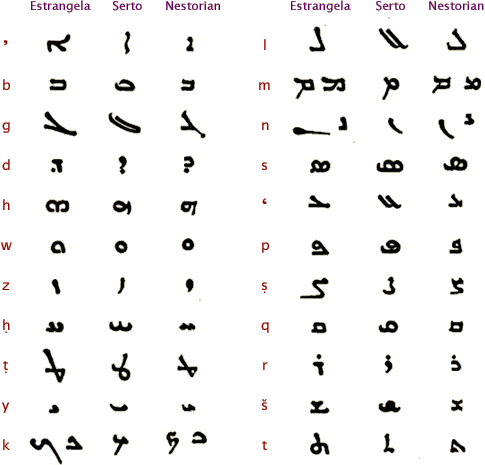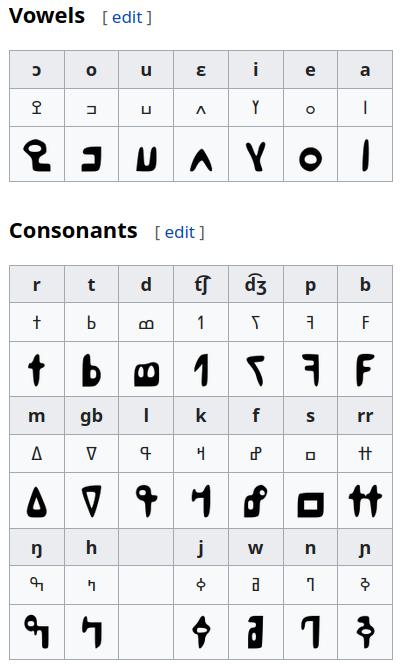It is volume 13 ( 0 1 2 3 4 5 6 7 8 9 10 11 12)
This is a part of a raw and uneven journal of
digging into the writing systems from all over the world, so I
recommend you to read the summary of this work instead.
Are
Should of
Could of
Would of
Instead of (in such context this guess falls apart, but that could be some homonym or something else)
Shoud have (in usus it is aften the same word, 'ave and of. owe awe off)
Could 'ave
Would've
Just mistakes or dialectal forms? Are "of" and "have" cognates?
Jars of rice = Jars have rice
Then is firstable making "able" a variant of "of all"?
"ab" is "of" in latin, but I still don't think so.
and in protogermanic too: https://en.wiktionary.org/wiki/Reconstruction:Proto-Germanic/ab
And that have=of thing, if they really used to be cognates and sometimes still are, that is of that period when belonging was not expressed in the language more clearly (do a man has worms or do they have him? many such cases) so "I have you" tells that you belong to me, while "I of you" tells that I belong to you. And because usually we belong to eachother, that could be acceptable for awhile, but there's a mathematica term for such cases, but I always ignored terminology, so I'm not sure if it's reversibility, either way, it's not having that (if I have you it tells nothing about if you have me or not, but it does tell that you belong to me, kind of, anyway, it's all ridiculously useless, let's colour it grey)
Who used to be hwo, and then it was much closer to кого [kavo] (г is pronounced there as v, nobody knows why, at least I don't)
Today I saw that galo 'round a burning match again. This time it seemed to be like steps, quantized drop in luminosity of the ball around the flame with another lrop drop at some santimeter or so (I didn't measure then, though I tried it some more and it stinks with matches, and ventilation turns on the light in that room, so I do the next time, on thursday again. I was surprised toknow that do to da today is thursday as I think was the previous time. On friday guests came so I couldn't repeat, I should check the records at the previous volume, or I should keep on burning match (and I was recomended a candle, because it burns longer, gives time to observe, and I think it stinks much less, so I have to buy me a candle or to do it at home. There are many rooms ldark rooms at my place, and lack of the external light is essential, though probably one source of light is to be, not direct one maybe, exactly, not direct, at my right front there was the burning match, at my left front was the toilet room with точечные светильники at rather high cieling and the wall above the door cut their direct light off, so you could only see the well-lit room there. So I have two interpretation of what I saw: enegetic orbitals of the heat radiation (of which I thought before: heat is a wave, so like sound it should have harmonics) or quant nature of theworld make the light intensity drop by degrees (by stairs, quantized, raster)
But what is more important than the light is that morning relaxation of the eyes, and maybe thursday too, but that is yet to figure out. It seems the cycle of seven days was never broken: the reform advanced the date by 10 days: Thursday 4 October 1582 was followed by Friday 15 October 1582.
But interesting how russians were fucked by that reform:
В России юлианский календарь обычно называют старым стилем, переход на новый стиль (григорианский календарь) был осуществлён 14 февраля 1918 года декретом Совнаркома, подписанным В. И. Лениным 26 января 1918 года.
Just before the anniversary of the February Revolution. Must've disoriented the opposition that decree.
And there are more mysteries:
The Gregorian reform shortened the average (calendar) year by 0.0075 days to stop the drift of the calendar with respect to the equinoxes.[3] Second, in the years since the First Council of Nicaea in AD 325,[Note 1] the excess leap days introduced by the Julian algorithm had caused the calendar to drift such that the (Northern) spring equinox was occurring well before its nominal 21 March date. This date was important to the Christian churches because it is fundamental to the calculation of the date of Easter. To reinstate the association, the reform advanced the date by 10 days: Thursday 4 October 1582 was followed by Friday 15 October 1582.[3] In addition, the reform also altered the lunar cycle used by the Church to calculate the date for Easter, because astronomical new moons were occurring four days before the calculated dates.
But in russia it was 13 days. Three extra leap days passed between 16th and 20th centuries? 1700, 1800, 1900 (1600 was not considered leap according to the gregorian system)
The Julian calendar has been replaced as the civil calendar by the Gregorian calendar in all countries which officially used it. Turkey switched (for fiscal purposes) on 16 February/1 March 1917. Russia changed on 1/14 February 1918.[96] Greece made the change for civil purposes on 16 February/1 March 1923
Turkey started this movement. Let's also not forget that the head of orthodox church is in konstantinopole, which is occupied by turkey today.
important
independent
and weed I smoked really seem to work, after I threw it in a pit in the autumn, and it's been there all winter, and I only took it home in july. It wasn't working at all,
If you look at
Надо менять этот мир, и потому я лезу в самую гущу его
Надо было взять с собой верёвку, чтоб вешать мразей? нет, чтоб задерженного этой верёвкой обматывать и тащить Вокруг пояса обматывать? Играть с мусорами в перетягивание каната.
Толстый канат с двумя узлами на концах, один узел даёшь задержанному, а второй тянете всей толпой.
парша в русском языке настолько неоднзначное слово. но все значения походу означают разные грибы: парша животных и человека и рунет узнаёт под паршой совсем не ту болезнь, которую этим словом называют там где я живу (яблоки покрытые коркой, похожей на паршу человека, каличневый с белыми точками, настолько омерзительную, что я даже картинку здесь прикладывать не стану.
поп значит попка (им дозволено лишь только повторять, отсебятина ересью зовётся, и в этом одно из основных отличий религии от науки)
English and russian perfect tense:
killed ~ 've killed
бил ~ убил
И здесь возникает вопрос: (это литературное оформление, совершенно излишнее семантически)
какова связь между Б и К? она определённо там есть, потому что на западе первой согласной является Б, а на востоке – К.
Был Жил тоже может быть отражением этого феномена.
Но мы отвлекаемся. Давайте сравним ещё несколько примеров перфекта
I went ~ I've gone
Я шёл ~ Я ушёл
Но это неправильные глаголы, у нормальных вторая и третья форма совпадают.
I noticed ~ I've noticed
Я замечал ~ Я заметил
Окэй, хир ис эназа уэй ту мэйк пёрфект ин рашн.
Я рубил ~ Я зарубил
И снова вопрос: З это staveless В?
У~За~При~
переходил ~ перешёл (первая форма неперфект, вторая перфект)
ходил ~ шёл (полные синонимы, ни одна форма не перфект) это очень странно, нелогично, и наверное подобные приколы вызывают у иностранов основной бугурт.
шёл краткая форма от слова ходил
буду (future)
быть (present indefinite)
был (past)
Future form is all in u's as in futurum. Then why isn't был in a's? But in english it's more straightforward:
U for future: Will
E for present Exist, Est, Is.
A for past wAs (how is it I highlight one letter in future and the other in the past. cherrypicking or something even worse is it?
зевота блевота рвота
tell that the root in рвать is р[r]
unless ю[ju] in блюёт is the same в[v]
рвать рыть рубить (рулить не из этой грядки, потому что заимствование)
рой крой корой коркой короткой кроваткой кронбалкой
рой крой край
ров кров кровь
рыть крыть крышка крынка корытка корзинка
крыть от слова рыть.. (закапываь) кто бы мог подумать.. удивительно
is cover co-over?
к- = с- (in russian, both prefixes have incredibly similar meanings to and with)
к это с на ставе. евреи обманули нас, руны первичны:
Что это знание позволяет сделать:
например, вопрос можно увидеть как вопрок, что роднит его с упрёком. во прок, на пользу.
у прёк это в прок, во прок
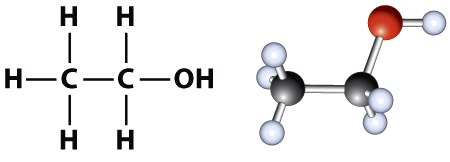
this little doggy is ethanol
it dissolves in water because of that OH thing. And that other part of C-C is a little hydrophobic.
It (I +t, suffix of the third person. And in verbs: I do, He does (e суффикс третьего лица, H = И = I))
наша наши - иногда на письме а выглядит как и, и тогда соединяют сверху воедино эти 𓏭
превращая и в а
а одно, и является суффиксом, и похоже что использовался до всего: множественное число, родительный падеж, прилагательное, императив (второе лицо)
а также является соединительной запятой, י
ко мне
со мной
Может эти суффиксы синонимичны, но грамматика у них различна. Не потому ли что грамматика повторяет их ,и тогда к ~ е (мне! ~= ко мне)
повторяет их, и тогда с ~ и (мой ~= мной (владеется мной))
мы = мны? (that ? is similar to ~)
мн как много?
скоко? много - тот же суффикс как в его (и сравнивая его с однокоренными: мне[мене], мной, меня) тогда с ко is with que?
следующие три строчки просто гадаю, черновик во весь рост:
а я, меня
и мне
о мной ~ мой
I don't know if I told about it (I'm not high and in this condition I memorize more than invent) anyway,
N and S are clockwise and counter-clockwise swasticka's elements, which is weird, because if counter-clockwise is отворотный, and clockwise is приворотный, then why does N stand for No and S for yeS ore Si? is s = t I asked? is "s = c = d?"I ask me now
d is cl
D = CL? I saw it today in a dream, where it came to me as Sure it is! but what did it look there like which made it obvious? lↃ maybe. or lƆ, 𐩧𐩽?
And then I realize, that not only have russians turned their letters counter-clockwise,
so H is И and N is Н, but also lucky people's nations have the element of lucky swastika in their alphabet (N) and russians only have the element of unlucky one (И)
But then again, what does it tell of S? Is Z more based or what? Or does the smooth form of S make it something else? How can it be unlucky if it switches from counter-clockwise to clockwise?
The true answer is I don't know. I only figured that И/N thing like few hours ago, what do I know
But it would be a nice experiment if russians would turn their И & Н clockwise to get H & N and didn't adopt S, but maybe Z though, using C for all S's as they do today, and K's for all K's as they do today.
Z would make their Задница не такой полной.
are Ж & З жопа и задница? If that's how the alphabet ended before numerals IVX were incorporated in their canon, it could make perfect sense. Волосы Голова и так далее?
So, the only good explanation for why No uses clockwise (приворотный) symbol, and yeS uses the counter-clockwise (отворотный символ) is the hypothesis that they used to be the other way around, because when these forms were invented people drew left to right. But that's just a guess, and it needs some data to be proven or disproven, and yet I have a good way to test it: we must collect text from the most ancient artifacts, and to see how S and N go there, but I think it will fall flat, but I have no better explanation of that inconsistency, only if that idea of them swastikas encoded in those letters is baseless.
Another observation of the sun:
I came home after a fortnight outside,
got high, saw a setting sun, and observed it:
it was sitting above houses and it seemed that it went up when it saw me, and it probably was some optic or psychic illusion; either way, I saw some rainbow spectre again and I saw some orbitals: light from the sun seemed to have some concentric rounds around it, like the one I saw around a burning match but much more in number and much tinier in width, and other vision was some отрезки спектра как лучи (по радиальным линиям появлялись отрезки (одинакового размера, но на разном расстоянии от солнца, кажется на каждом геометрическом луче из центра солнца было по одному отрезку (я посмотрел и не видел опровержения этого предположения) отрезки эти были цвета радуки, т.е. предполагаю что по лучам шёл более широкий спектр, и лишь небольшой отрезок (все отрезки были идентичных размеров и окрасов) радугой представлял видимую часть спектра. К сожалению, успел заснять лишь зашедшее солнце, но вероятно мой телефон не взял бы такую чёткую картинку, тем более против солнца. Завтра попробую или когда ещё увижу. сегодня понедельник, субботу воскресенья я был не один, потому не дубасил и следовательно сюда не заходил.

as you can see, the sky itself is also a rainbow: it goes from red to blue with some lack of green, and yellow is only in the clouds, I'm not sure it counts, it could be just some red and blue which are just on spectre, but are not of spectral nature.
Either way, I will find some good optics and will film it, I think I will contact some profession photographer tomorrow, or even two.
I hope I will deliver soon in language thing with that a-b, a-d, when I literally divided words by meaningless letters. So vowel is no, and consonant is yes? consonants are different: b is in, d is off (de)
but something, vowels are just connecting voice, and probably first consonants were meaningful and vowels were just melodical. And later they began to use vowels as negation, but it probably grew out of interjunctions interjections like oh, ah, мол ну да; да, но; да не; и как мы знаем, порядок слов не принципиален (разные народы лепят кто во что горазд)
Сегодня слышал, что русская орфография была стандартизована лишь в начале 20го века, а до того лепил кто во что горазд:
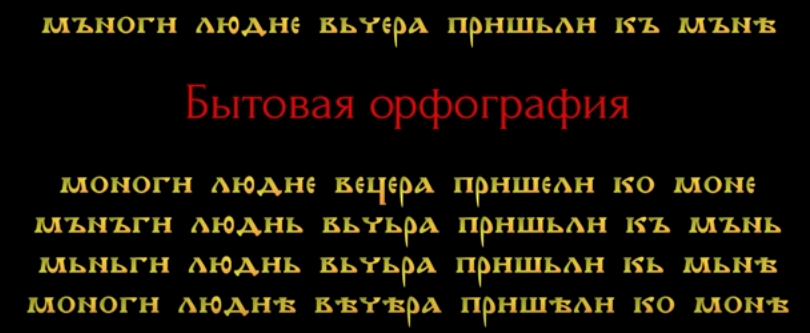
(он о том, что я сказал в предыдущем предложении, говорит где-то в предыдущих 20 минутах)
The following two screenshots are also from there, I think they belong here even more that that one:
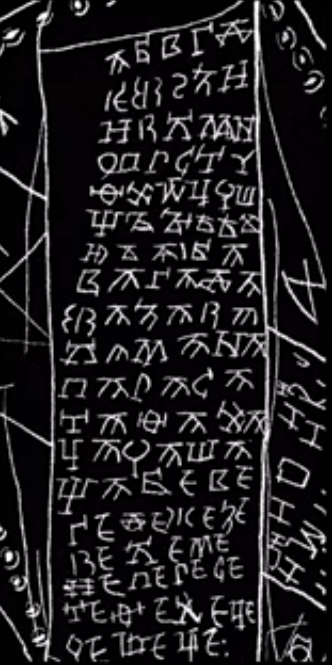
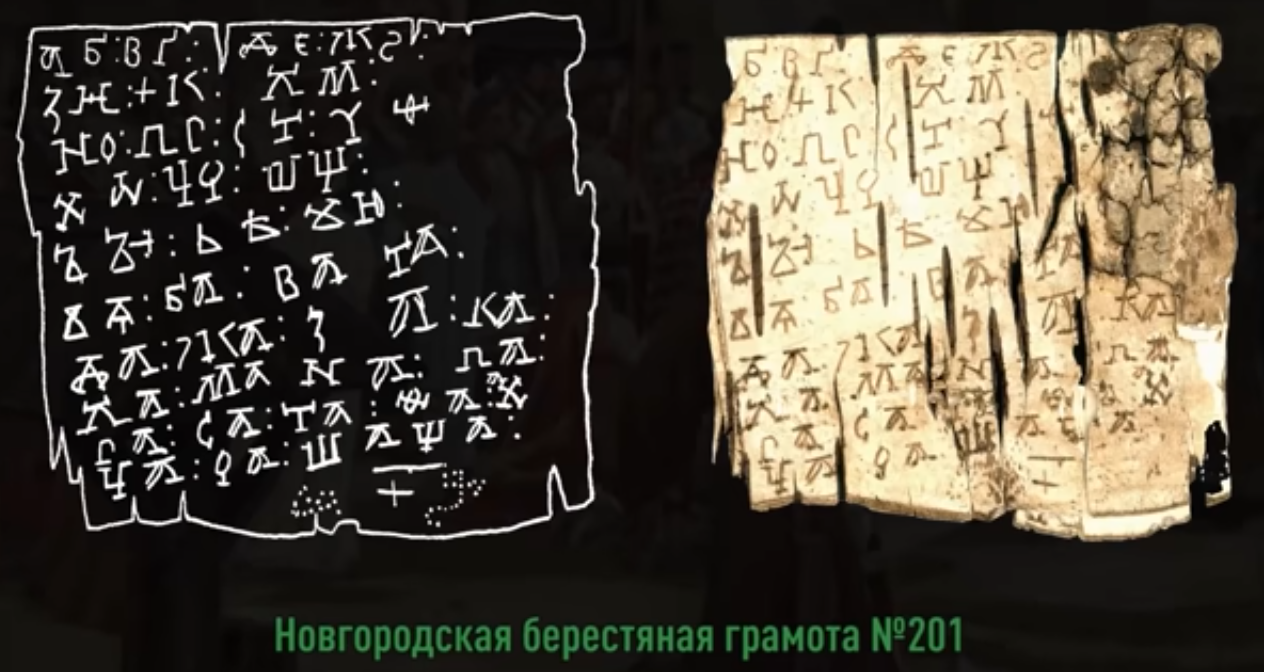
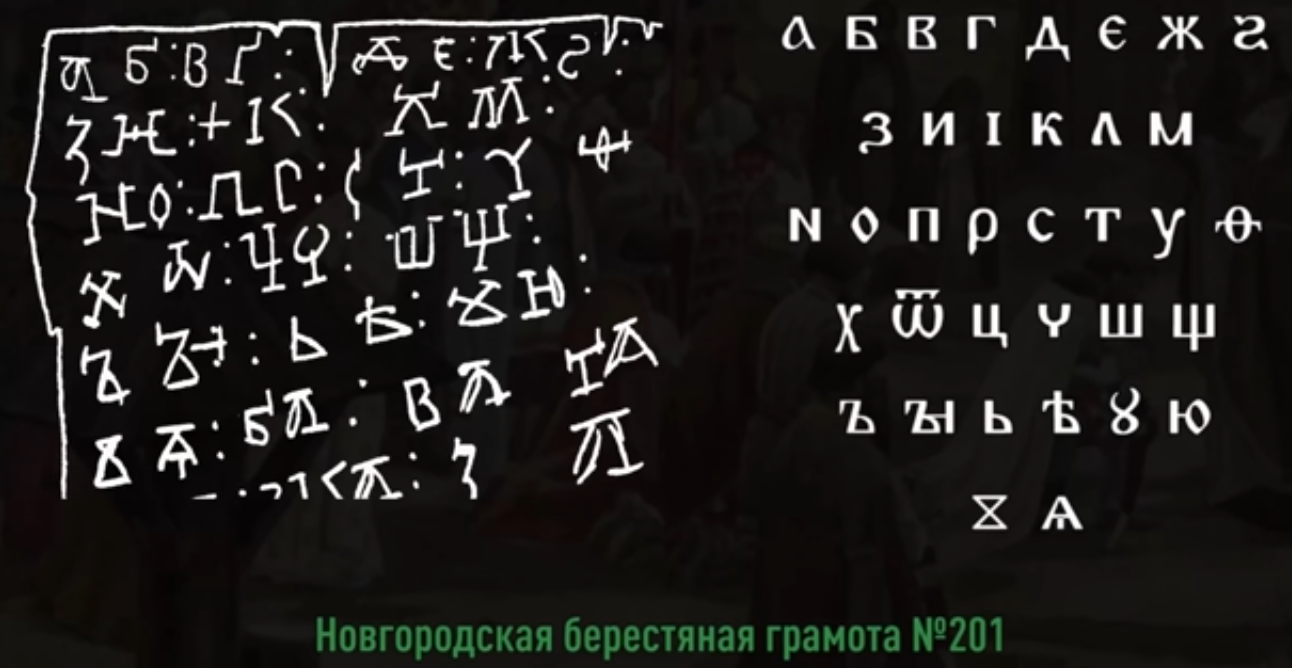
I wonder why their Л looks so similar to glagolythic М.
I don't know why unicode show it like this: Ⰿ, because it is
In case it's a bug and they fixed it, here is the same in png:
Something similar to what I observe around the light source is Brocken Spectre, but what I observe has nothing to do with water, it can be seen in absolutely dry room, photos are yet to come, but here what I could find so far:

And another interesting phenomenon I never knew of and neither did most of you, Gegenschein:

In modern times, the gegenschein is not visible in most inhabited regions of the world due to light pollution.
I think optic is my next favourite thing,

That pink part is called Belt of Venus, and the blue beneath it is the shadow of the Earth.
But the phenomenon I want to discover even more is the way some tiny light source behaves in a dark room or a plane: when you raise your hand between your eyes and the source, the light is closed from the opposite direction, I wonder if it has something to do with camera obscura flipping the image or is it some glitch in the matrix. I will write more about it when I know more about it.
So my guess is what?
tthere are several:
Because light is of wave nature, that wave has some spectre and thus makes rainbow?
But sound is a wave and it may keep the same tone. Sun also as any star has it's
That word rainbow I use all the time is not the phenomenon of rainbow we kow, but more wide concept of iridescence. I'm not even sure this term is correct, so I simply say rainbow, so everybody knows what sequence of colours I am speaking of.
Either way, this topic is its deception, and I will deliver on it more coherent and legible.
New thing I found today is that word "sweet!" may sound as sucking something up, like a noodle or with a straw, almost a kiss.
All the story is written down. But it is written one piece at a time at some place.
Aum is only known to europeans as omen, in plural. Aum is one sound, not three, it's a nasal A.
An. One.
A is potentially nasal, and maybe that's the route some people pronounce it as O
Some nations pronounce pot with o, and others use [a] instead. Americans do, and that other channel I've shown you tell that it's more ancient form of english:
https://www.youtube.com/watch?v=7p_BFdOjZVE
or
https://www.youtube.com/watch?v=GRrsSPddg6A
and it's in russian.
here is where he tells that americans read o as a: https://www.youtube.com/watch?v=56qwv_Jcg3c
And watching that previous video, where he tells that hot dog is somewhere pronounced as hat dog, and before that cot and caught is compared, and both are a's, and it comes to me that o and u are just variants of a.
a is the full form, and o and u are underdrawn.
And because double a is o in dannish,
And bornholm runes are dannish, and there o is ᚮ the double ᛆ the a, and aa is o too.
o is pure a, the golden middle between a and u
u is oo, so it's a, aa=o, oo=u
o is in the middle. A is a cool way to pronounce it. It was the same, Om, Aum aUm it also was some accord, согласованное последовательное движение звука по спектру как радука.
Радуга is not alphabetic, otherwise imagine how extatic I would be, Would I? Raduga have some transparent etymology, but then you have to recognize that russians built pyramids? Or at leasgt that russians worshipped Rah. Rah-shins (shin is humans? 神 is shen, god in chinese. in japanese it's shin.
清 is shin in japanese, qing dinasty of china, where it's also clear, clean, distinct, quiet, thoroughly, completely, and it sounds like chin, that how chinese transliteration of qing is read.
心 is shin in japanese, xin in chinese, sounds as schin (щинь) and as japanese didn't destinguish x from q, so is both words are written as しん in hiragana. Weird transliterations of x and q was from portuguese and who knows who else, so I think, but who knows if it's true. Because they didn't have russian щ. That is palatalized sh, which is x. but q is ch. And it reminds me of gothic alphabet:
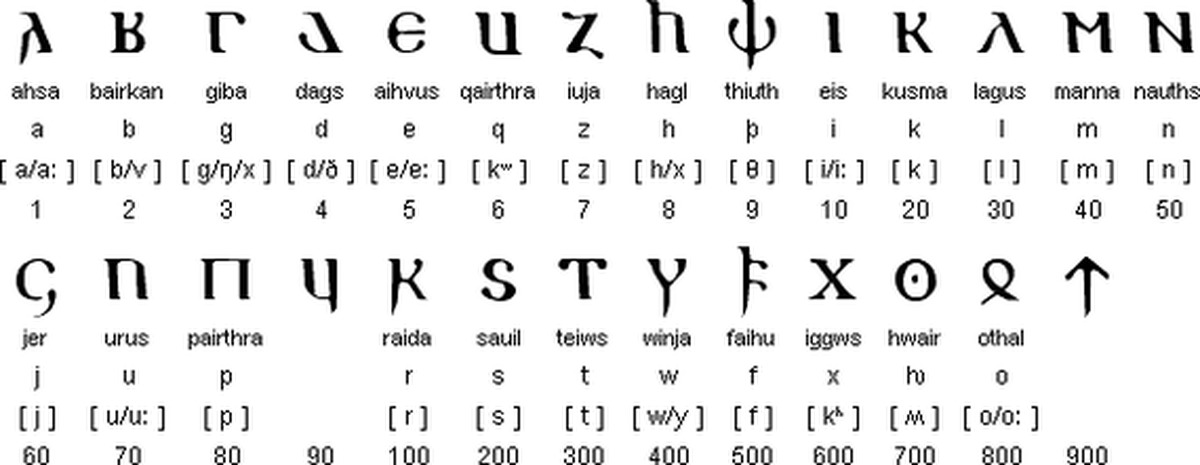
as you can see, in comparison to lating it has some letters lacking strokes at the top: R looks like K,
B looks like upsided down R, D lacks part of the stroke, Q of 6 and Q of 90 lack a stroke at the top, and that makes it remind Ч, as that q sounds in chinese, which I discuss above.
What's going on? I didn't change the масштаб, but letters seem to be tinier, and they're in the same font. Is it another example of world shrinking and we getting used to it and then we croak, I thought there was some term closer to shrink, but it seems google translator get worse: it doesn't know скопытиться, but mistake it for скопить или скопиться.
And then I kind of get used to this font and it looks normal. But that font at the front line seems smaller because it's compared to the similar (but slightly larger) font above it, in the image.
Notice, how gothic p reminds u standing before it, and very similar to ᚢ.
Го́тский язы́к (готск. 𐌲𐌿𐍄𐌰𐍂𐌰𐌶𐌳𐌰 (gutarazda), 𐌲𐌿𐍄𐍂𐌰𐌶𐌳𐌰 (gutrazda), 𐌲𐌿𐍄𐌹𐍃𐌺𐌰 𐍂𐌰𐌶𐌳𐌰 (gutiska razda)) — язык готов. Относится к восточной группе германских языков.
And letter ᛟ shows closer relation of gothic with runes. I think I read that the oldest runic writing is gothic, but it's probably that the oldest gothic writing is runic.
Out of about a dozen candidate inscriptions, only three are widely accepted to be of Gothic origin: the gold ring of Pietroassa, bearing a votive inscription, part of a larger treasure found in the Romanian Carpathians, and two spearheads inscribed with what is probably the weapon's name, one found in the Ukrainian Carpathians, and the other in eastern Germany, near the Oder.
I wonder where I can see the other 9, and what are they? Yet here are the three they mention:

as you can see, the transliteration ↑ here lack a ᚲ:
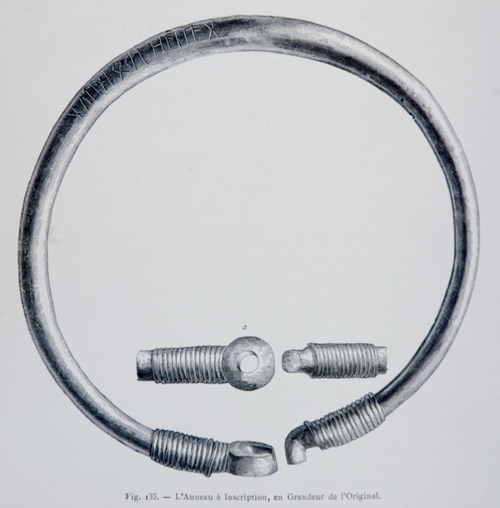
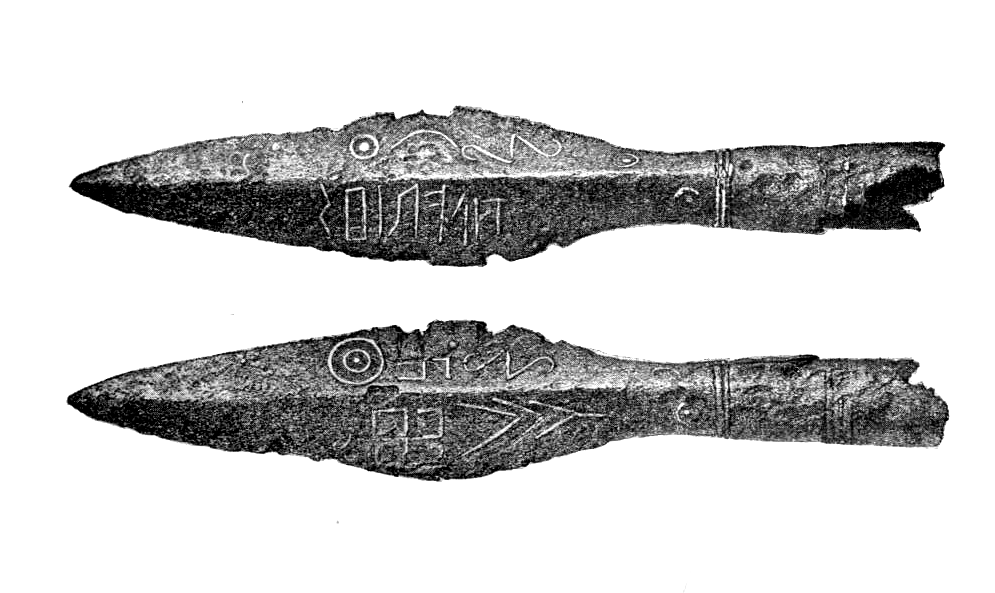

Внезапно, возможно разглядывая свастики на первом рисунке: атакующую сверху, защищающую снизу? и я подумал о колесе и том как можно за прутья взявшись подняться в карету как по лестнице ли, а если ле ловкий и смелый, то может и на движущемся так запрыгнуть, но так делать не надо, тем более на современных скоростях.
卍 is forward, and 卐 is backward, because those г's are legs. thus they're L's. and as you can see, the word L has lucky turn of the leg. L is leg. Now I see. Let's beging the abecedary:
a b c d e f g h i j k l m n o p q r s t u v w x y z
That azbuka is what I came here to make, to start it from a good foot.
begin looks like beging because помолясь
bog and beg is like caught and get. get = catch? cognates? probably. dialectal readings
"The oldest known runic inscription from Sweden is found on a spearhead, recovered from a grave at Mos in the parish of Stenkyrka in Gotland. The inscription, consisting of only five runes, might be dated to the end of the third century of our era." Sven Birger Fredrik Jansson, The runes of Sweden, Bedminster Press, 1962, pp. iii-iv.
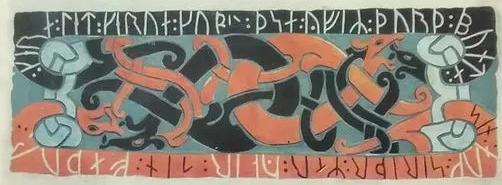
This image, placed on the cover of that book (reverse image search shows it is only present on it, so it's probably a replica of some ancient thing. Let's look inside to see if it has it)
vowels bowels? vow is bow? I didn't expect bowels here, I only thought that vow is pray, bow.
bow is not only a gesture of reverence, but also a weapon. and that weapon bow did use bowels as its string and a gut called catgut (though it's usually made of sheep's gut) is used in musical instrument which is played with some other bow, the fiddle-bow (fiddlestick is rememed by some comix creature) but that bow the fiddle bow uses hair instead of guts, so they play with horse hair against sheep guts. And that is very pleasant to them. It's very pleasant to me too, I think I've shown you this video earlier,
https://vk.com/video58166550_166661043 (to see it you have to register at that kgb-ridden resource, or you may find Janine Jansen in Prinsengracht concert of 2005 somewhere else.
https://artsporn.com/watch/58166550_166661043 is an online resource allowing you not to register.
and it also allows to download it. Whenever I share some information, I immediately receive some more of it.
the in that
a in it
show that vowels are the same, the same first mother. which I noticed in negating prefixes. a- in- un-
am I weird? is it some font different sizing or did that line at the first page of the old version got smaller? How could I make it that tiny? I don't remember what I was thinking. Either way, that physical idea of the world shrinking makes me collect the evidences in support of that hypothesis (in support = supporting: processing is in process)
is it go-t (го-о) adding г's to чё and act in'?
does form что (а не только чего) говорит, что т ~ г? ᚲ and ᛐ or is ᛏ another form to place ᚲ on stave?
Today I managed to take the photos of the setting sun, but I didn't see the rainbow rays rayin'bows? either way, but mostly because I was focused on the phone. photos, phone.. it was not together at first, it is funny, because now they are. So the most rainbowish rays are on this one, and they're not very rainbowish, not very iridescent. Either way, the experiment was not pure because of the clouds above the sun, but there was no or almost no clouds directly at the sun:

so that the spectre of the sun itself from red on its outside (and all the rays look pretty much redish with some yellow pouring into them from time to time and from some points of view:

but most of the time the sun itself was iridescent: redish orangish periphery, yellowish greenish closer to the sun and some pale blue in the centre. Is it the closest to the white because it's the most radiant, the most powerful part of the spectrum, so we're taught that sun is mostly ultraviolet? But that is not blue but grey, it only looks blueish against that yellow.

I didn't use any filters, these three are screenshots from the video I took during the sunset.
Next time I will watch it with my eyes to first see those отрезки о которых я писал, или концентрические круги вокруг солнца, а затем попробовать сфоткать. Не знаю в матрице мы или нет, но психика каким-то образом может влиять на видео: когда я смотрел на ковровое покрытие из точек, расположенных под 90 градусов друг к другу поду углом 45 градусов, так что виделись они расположенными под 60 градусов, то я видим отрубал фильтры и видел начинал видеть зыбь (нойс непонятного происхождения) и я играл с этой зыбью фокусируясь на ней, и видел как она принимает разные фигуры, что может погло могло быть парейдолией уровня фигур в телевизионном снегу, но могло быть и проявлением чего-то другого, потому что когда я смотрел на эти точки прямо и видел их квадратами, зыби не было, и когда я начинал снимать, этой зыби не видел и телефон (но сегодня пересматривая те видео, я видел что даже на этой второй и чёткой записи зыбь присутствует в меньших количествах по краям экрана. Очищу от звука, обрежу от шлака, залью сюда далее в этом томе. Вернусь к этой теме.
I wonder how it was just one day and the sun sets (sits) so closer to the south, to those three houses, that at that rate tomorrow it will be between the first and the second one. We'll see.
it was 27th of july today. and now it 28th, my birthday.
How comes both as and but are such basic words in the english?
a~b (ass~butt)
bu is that nasal part of the a? ab = aum?
and what is cd then? the sme a same g?
антоним жопы голова, и может монки си этв монки ду фку are the that
куф рош?
was q some monkey sound other nations never knew? I just make some inhaling ы or э imitating a monkey?
eleven ~ elephant? not necessarily, but may make a great rhyme
are job and jog the opposite? like Б and g?
Similar form is p in glagolitic: Ⱂ
underneath and поднизом are one is a calcque of the other.
then under = под, and suddenly I recognize o in p.
un Aтец is Папа? Как бы парадоксально это не казалось, А = Б: first Б was the head of the hourse. Then A became that, but probably in different places they came at different time the tradition and the change in the writing system. Is it why georgians call daddy baba and mommy dada?
un of under as под is seen in по standing for on. and because п & n are so similar, especially in coursive: п n, that maybe on was up, the inhaling form of the same по?
under and под are literally cognates? panda? manda! and suddenly I see манда as M(other) underneath.
neath is translated as под for the sake of translators, not to make it obvious that neath has a cognate низ and yet in georgian it is translated with a cognate, I wonder if for the sake of translator or because they use it like them:
hearth is очаг, не потому ли heathans are called so. To survive on the north you have to leave as hearthans: desert laws will not lead you to success, people are not softened by the sun on the north, here we must have axes to survive.
U was felt like the utmost underneath (even though up is up) юг, союз (south) both have u's
север, норс, both have s & r.
if s in south is a prefix to the common юг, then is s in север also such a prefix? without it it's ever, and that could be the name of the polar star. But astronomy tells that it was not the polar star all the time. But I doubt it. But either way, for the last 4000 years the north pole of the sky is in the three dippers of ursae and drago. ursae are female (at least in russian) and drago is lingual and probably male (in russian it is) and medveditsa are pretty labial in the beginning of the pairs o its name: mad and wit (and what if this is the actual etymology? What if maed used to make us mad? Because we found some ancient hives of tons of high-pressured honey? What if we found where bees lived for centuries and we don't know of such places anymoe, because they all were robbed millenia ago. since then not only the trees are tiny in comparison to what we used to have, but also the hives are usually one-year old.
But I have to prove that honey by itself may become intoxicating. Lots of honey with the top of the hive broken off by a bear or a man can collect rainwater and come through whatever processes turn honey into maed. so russian medved for a bear could be not of that he knows where the honey is (why would we care) but that it's crazy and smart. or mad and wait? or mad and bad? Sometimes "bad" is used for something smart, like in badass, it is not something bad, it's something awesom, everything good is bad and everything bad is good. What if that is a ritual song testifying that the semantic of those words was changed by some supersticion maybe?
помимо жара есть ещё одно подобное слово, способное быть билингвой двух диалектных прочтений одного и того же: ожог.
Это всё к слову юг, который как-то не явно связан с солнцем: юг [jug] and jug [жуг, что ближе всего к жёг] jug банка? х.з. может это линзой было изначально, и банки из стекла линзами назывались? jar is not necessarily a jug. but they could be cognates, some dialectal form of similar things by similar words unified by being accepted by both dialects and further into some standard.
штандард значит знамя, стандарт как знамение? как знание!
not ever art is kunde, but standing art is standard, the way others may repeat and be satisfied. And orthographic norm of d instead of t was made whether to avoid the homonymity or to conceal the cognatism. And whether the will was good or bad,
whether is of weather (it is something the future depends on: good weather I come, bad weather I won't could be further simplified to whether I come or not. whether here is good whether, по году. and or then would be the short form of other. other is not there? other is not they, not their: others are not theirs.
Initial vowel is always a no? What is I in Initial? не = мне. не = me.. I said it before, but in this context it's great.
Let's begin the dictionary of cognates, or rather let's call it..
mnemonic dictionary
not to be blamed for arbitrary etymologies just because they help to learn foreign words.
under = not над.
под = fu at? (fu = no, today is only seen in some interjection of similar semantic, but actually its' a chinese word, and that's why is seen as slang, net exactly integrated in the body of the language with some grammatic forms, but maybe фуёвый это от того же самого фу. фу = хуй? по смыслу тоже может сповпадать (хуй может заменять слово нет, но никогда не значит слова да)
Итак, я добрался до самого мяса. Добавлять это хуй в русско-китайский словарь когнатов? Нет, погодю, я разведу его по языкам, и может тогда туда это добавлю в русско-китайскую часть.
ji is ti in chinese:
https://www.tiktok.com/@yanggemadeinchina/video/6985825609154907393
north not moving? nor the, then the nor.
also ursae make nutsy swastika by their movement through the sky and nothern sky rotates counter-clockwise. Also because sun is generally down there at the south up here.
and you can see that when they look at south, it goes pretty much clockwise,
and that is a simplest proof of the earth being spheric, the way pole on the south rotates clockwise:
So southern sky rotating clockwise and northern sky rotating counter-clockwise is sorta uniersal rule, only in the northern hemisphere south is where the sun is, and thus sun and south could be related words.
The word way roussian count system is retarded and inconsistent may contribute to our irrationality.
https://www.tiktok.com/@yanggemadeinchina/video/6987314183721340161 (mirror)
referal к бинансу божешь ещё раз прислать, регаюсь наконец-то
Это не вопрос, это предложение. т..е. вопросительный знак не нужен
предложения бывают вопросительными и восклицательными? повествовательными ещё бывают.
отрицательными, побудительными, и на сколько у филологов фантазии хватает. А на самом деле просто устойчивые конструкции возникают по причине прикольности или понятности, а правила с кучами исключений являются апофенией обыкновенной. или необыкновенной, моя необыкновенная.
Erika is briar, briar is heath, heathen is in heath, heathers are hearthy (warm, with both hearthes and hearts, hearth and heart)
сердце в середине, hearth is in the centre.
hearth heart of the house.
h house (to the abcdefghijklmnopqrstuvwxyz)
does similar graphic influence psyche? if a man is so blind he sees вор instead of app, who what how does it influence him? Does he become reluctant to use apps?
I just saw it like that and I don' use very many apps. and the last one I remember was instaled because my friend demanded signal phone operator (some encrypted whatever, I suck at i.t. Even though I know that i.t. is it. I have some trauma in my psychic fabric. I need to be reluctant... It' s an automatic (was)
Pythagoras's tetrakti's is indeed the basis of their geometry:
by using 6 of those triangles you can make a hexagon, and hexagon, not pentagon, (, = )) is hexan,
six equilateral triangles make a hexagon and thus 6*10 = 60, the masis basis of shumerian math, the elements of which we still have the number of minutes and seconds, and maybe months too, but that 6*10/5, people need brackets in math only when deal with different dimensions in one expression: pluses and minuses is one-dimensional operations (you need a line to make them) and * and / are two-dimensional: you work with plane or other 2d figure in that. and if multiplication is applied to both of the sum, you need to use brackets for that. And is power 3dimensiona? cube is tridimensional. What? Multiplication gives birth to many dimension, but.. but.. what is what.. is..
an update from the further chapter: √3/2(a) tells that you cannot use multiply and divide as freely as yuo could change plusses and minuses without the change of sum, and if you only in question if you should multiply the upper part or all the thing, it doesn't matter, but if it was something like 10/5*6 then I would demand brackets. And it shows that I could be unfit for teaching. Because I improvise too much and thus am wrong more often.
It is interesting how Pythagoras might have received that pi thing. Is it named after him?
Was it him? I don't know. Maybe, but then stigler's law of eponymy tells that not necessarily, but he probably popularized that math a lot, that's how people get things named after them.
And only have I googled hexagon pythagoras, a whole new world of trigonometry opened before me with something I never was aware of.
I found some magic hexagon, super hexagon, but I didn't get it, so I don't give it here, I'm just aware of such a thing, but I"m not getting it yet.
So I wanted to show you the pi, I wanted to show you that I think there are could be two different pi's as today we don't know if we don't have two different c's.
First pi is the S/D and that it is a little larger than 3 you can see from the circumscribed circle:
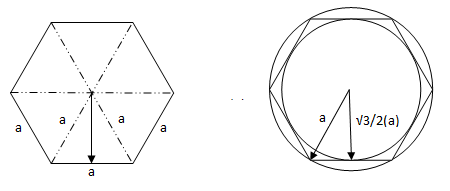
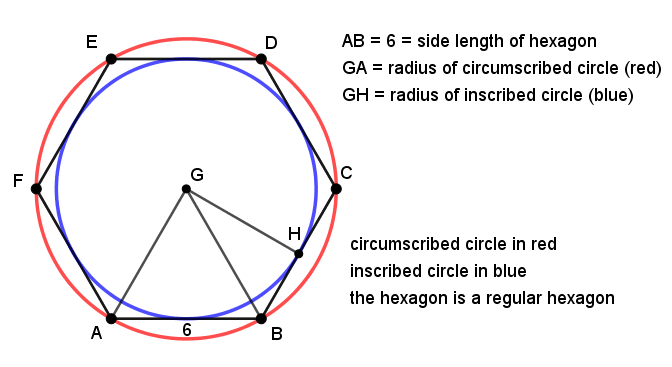
18 could be 6 trirunic accords. руны струны.
струны как старшие руны?
2a in diametre and 6a in the circumference. But then that red circle is larger that the hexagon with the large diagonal laying upod the diameter.
meter measures. meets.
But then we can look at the blue circle and see that not when it's incribed into an hexagon, it sets the upper limit of pi. And when we use polygons with more angles, we can approacth that number more precisely, so maybe in миллионоугольниках пи всё точнее измеряют.
Но как они поняли, что пи используемое для вычисления площади круга то же самое пи?
Давай закончим предыдущую задачу. Сколько верхняя граница пи исходя из гексагона?
12√(R^2 - R*3/4)
that is some wild shit, but that follows from pythagoras theorem, in case you don't remember it:
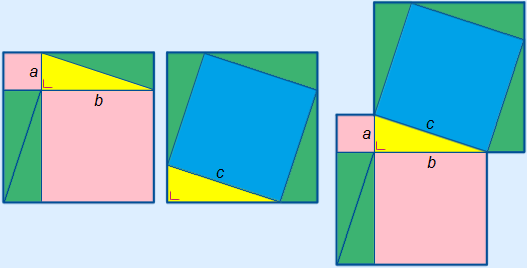
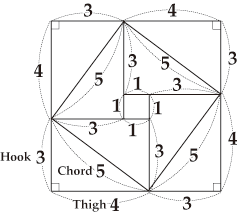
but that abc picture of "pythagoras pants" is still retarded, even when you draw them like that, because you miss one of the tiangles in the lower representation, and if I added it, it would mess the upper diagram, so fuck that euclidean pederasty, yeah this book is not for little kids, science is hardcore.
just as that √3/2 thing: it follows from that hexagon and the pythagoras theorem: x2 = a2 - (a/2)2
x2 = 3a/4
x = √3/2(a), but that is a retarded way to put it, a√3/2 is the way to do it.
So the upper limit upon the circumfirence length is it is not larger than 12r/√3
pi = s/d
thus it's not larger than 6d/√3
thus pi is not larger than 6/√3 and that 3.4641
so pi is between 3 and 3.4641
So let's compare formulas to calculate these limits in hexagons, octagons, decagons, dodecagons and so on, to see a pattern and try to conceive the ultimate formula for the infinite number of angles, and there they will probably have infinities in both above and below the fraction, and we cannot measure those yet. But I just guess, I never try, you do.
Maybe some other day.
Now let's find the areas of those hexagons, and circle's area will be laying between them, and we'll see if the same exact numbers emerge.
and to calculate the areas, we have to use the previously calculated numbers for circumferences, so the larger hexanon is 6 times that triangle which equals (R/2)*(R√3)/2 and because that √3/2 is the approximation to pi, in principle it is the same pi. Let's see for the smaller hexagon: ..
Do my humanitarian self makes some silly mistakes in math?
I need some less confusing picture, here it is:
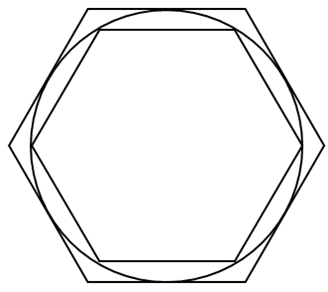
Now larger hexagon is indeed the radius multiplied at twice the side, and that's 12th of that 12r/√3
Thus larger limit on the one sixth of the circle is r/√3 and thus 6r/√3 is that whole larger hexagon, and that 6/√3 is the upper level of the pi we met before, and we brought it here in that circumference.
And now let's calculate the smaller hexagon: it's 3 rhombi, but though then I only have to calculate one side, the h from the centre to the side of the hexagon, let's stick to the triangles so I don't have to draw those rhombi for you.
by the Pythagoras theorem, R2 = (R/2)2 + that h2
that that h = √(R2 - (R2/4))
R*√(3/4) = R*(√3)/2
thus the area = 6*(R/2)*(R*(√3)/2) = 6*R2*(4√3)
and such pi is 13.8564, thus I made some ridiculous mistake somewhere above.
I don't see how that smaller hexagon returns 3 for the lower pi, only if √3 will be squared there.
Let's begin with finding the h. According to the pythagoras theorem, h = √(R2 - (R/2)2)
and thus the triangle is (R/2)(√(R2 - (R/2)2))
and thus the hexagon is 6(R/2)(R√(1-1/4)) = (√3/4)*6R2
3√3/2 = 2,598 which is even worse approxiamation than 3, and what does it mean? Different pi's only accidentally being the same in the circumscribed hexagons?
But more than this I think that I just seriously suck at math.
Let's wait until I or somebody else gets the larger math brains to figure that out.
Because because I suchk at math. some simple trigonometry and I melt at it.
But "are there two different pi's" is a great question to ask.
But my math ability is so poor, I couldn't even understand the Einstein's proof of the theorem.
And if that proof is true (it probably is) I have to never badmouth him as some freak would do.
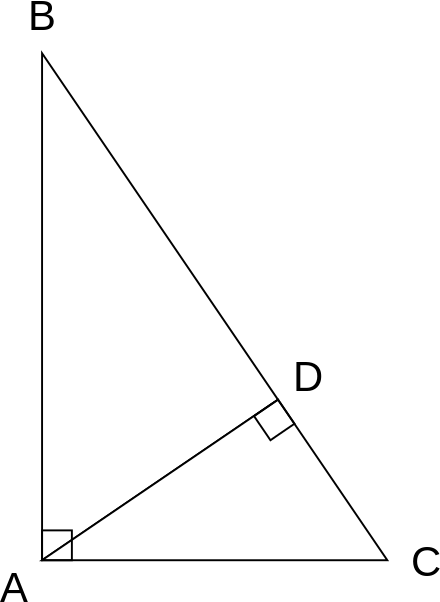
But what if that singler's law is at play here again? What if he only knew it and share it and got credit for it in both senses, and he didn't prove it himself, but he understood it (I still didn't) and he also shared it with the world. Why do I care? What is this math part is here to do? Hold on, we're coming to shumerian soon. Numeral system may have the tightests bonds with the alphabets, so we have to see those 6 by 10 thing or was it 4 by 15? tetractis with the fifth line is 15
I found this awesome pattern and I will draw tetraktises out of it in a moment, but now just try to zoom your screen (whtere ctrl+scroll is all you can, or alt+scroll zooms the scale of the screen of yours)
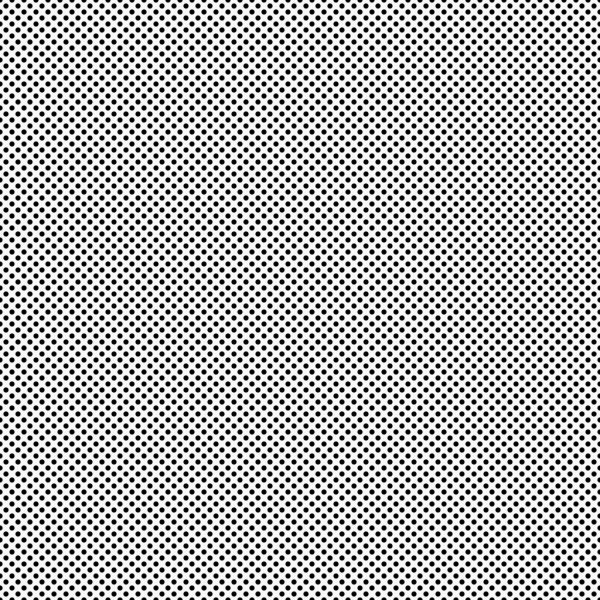
other arranging of the dots make a different effect when you zoom it:
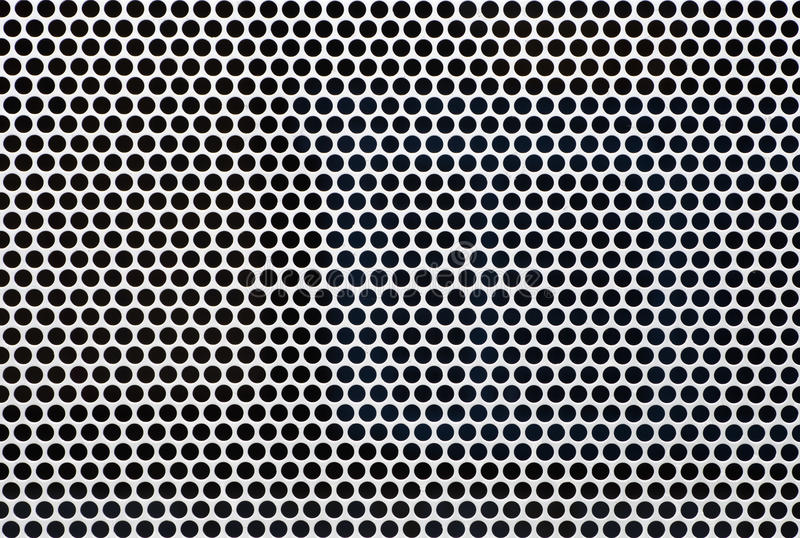
Here the figures are triangular, and on the other arrangement it's squeric.

Here I brouught those enlarged tetractes, pentaxes to make the 60 of sumerians, let's make it in the classical 10-digit tetraxises:
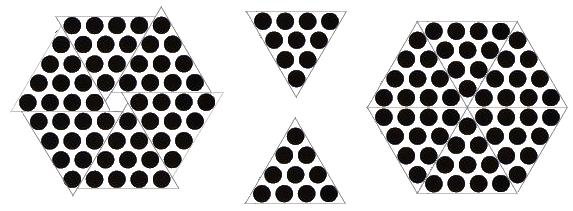
And surely enough, that proof by dissection has nothing to do with Einstein:
A generalization of the Pythagorean theorem extending beyond the areas of squares on the three sides to similar figures was known by Hippocrates of Chios in the 5th century BC,[Heath, T. L., A History of Greek Mathematics, Oxford University Press, 1921; reprinted by Dover, 1981.] and was included by Euclid in his Elements
It all looks as if they denied us all the antique science only to return it to us under their deceitful names.
I'm such a kid. And I'm not kidding, I'm some enphantile rebel without a cause or gain or even aim.
A teenager. Rebelious spirit. Loki. Лох.
And in that pythagorean context, the so called flower of life plays with some interesting shades:
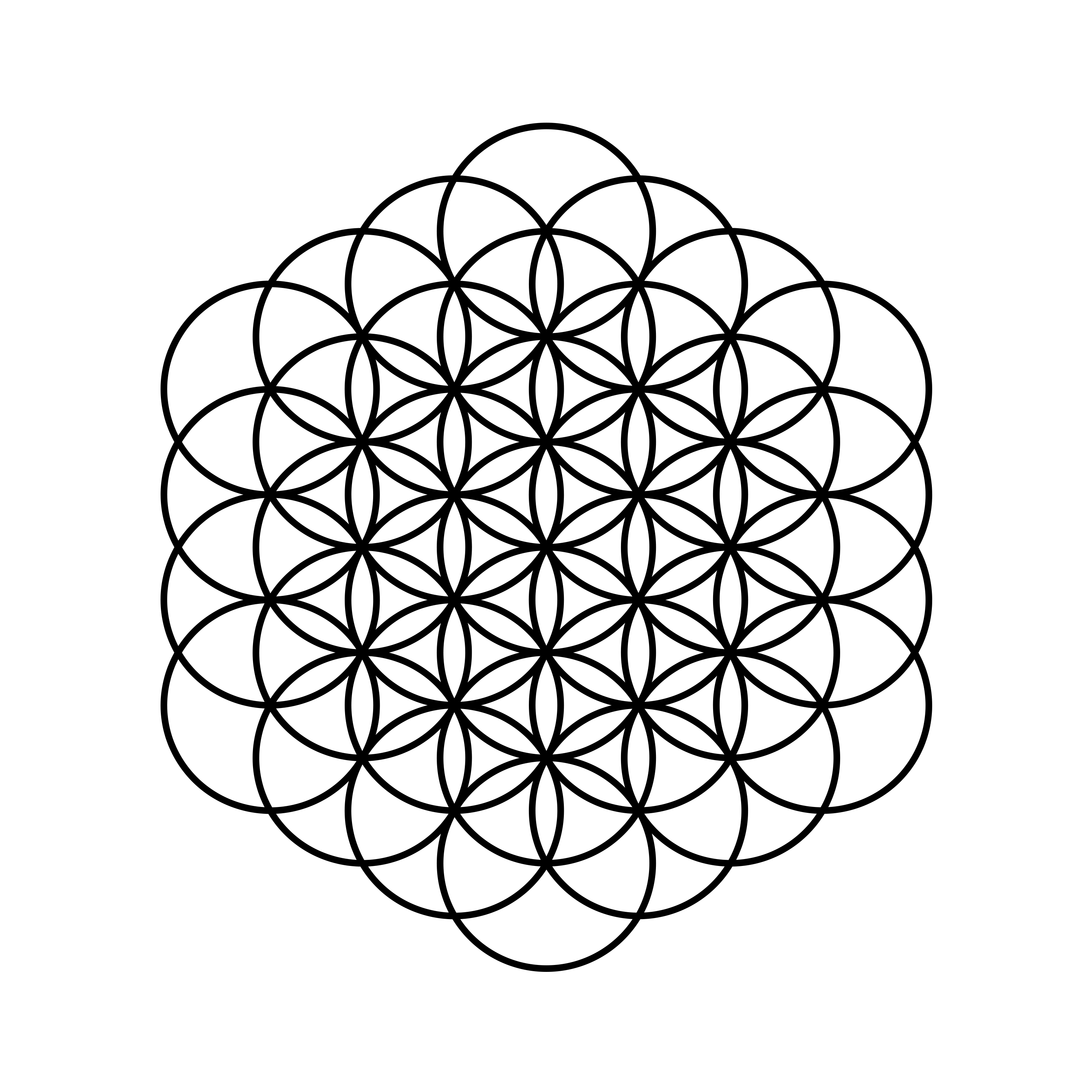
or shapes.
or does it?
ведьмы это ведь мы
ведь мы это ведьмы
ведь мы ведьмы
and of course this line is so obvious it was used before me
..однажды слушая Коянов поймал себя на мысли что что он сука ноет, нахуя мне эта депрессивная волна? сотона, шайтан, шайт, чёрт как дёрт, чёрти что как дёрти чмо, и таких много, вот им в капсулах будет кайф, без сраного социума вне того который вручную отобрал, когда физиологические потребности будут полностью удовлетворяться машинно (как сегодня печь топить не нужно, только денежки за обслуживание бойлера плати, но если людей обеспечить чтоб они не парились на счёт счетов, то как долго и сколь многие из них предадутся низменному гедонизму и как быстро он им надоест, и что они будут делать тогда? достигать высот своих увлечений или предаваться ешё брлее низменным удовольствиям? что сатана для одних вершиной духа для другого может быть наверное, если сатана переводится как враг, то это просто ругательство, но с другой стороны дьявол может иметь то же самое dieu в начале, тогда что за имя? Бля? Bella? Bla-dieu? для кого-то баал, а для кого то рот её баал)
C точки зрения христианина белая богиня - это dieu bella.
bella также как белая (в противовес семитскому, свинскому, сатанинскому)
How does it influence me if I type login-plugin aei.. and I notice that it's russian фуш, does it tell me that russian is фу or that my site is фу? It could be the both, and I could see the meanings in both of them.
And such непредвидимые (не рискну это в английский калькировать даже) обстоятельства вынуждают меня много торговых марок запускать чтоб посмотреть какая выстрелит. Кто бы знал. что x.com не взлетит? тот кто видел в ней ххх или ещё что похуже (xxxxxx could stand for hidden way to enter your password. and thus could fly higher than simple x.com if you advertized it properly, but then some network filters firewalling all the *xxx.com's would cut xxxxxx.com out too.
So anyway, Dr. Highed, Mahead Woodeeman, aeiou.ru are the aliases I use right now, and I need to come up with some names for my capsule buildings yet. But because that enterprise is so much more commercial, I have to do it not here, but outside of the scope of this record.
often of ten
apparent of hundred
obsessed of southand of thousand, sand and south, are these numbers for real? were southerners not aware of the longis for thousands? I V could be Ау. all the rest is m, n, s, t. na-ma-ste!
N before M? N is И? (Η, Н)
Η H Н are all three different letters, nannies ~ mommies? няня was the word coming before distinct мама appeared.
Η as vowel form of it
H as h~п~f as we can see its behaviour in japanese
Н is russian N, and thus we have the same form coming in all its forms. Whas Moon Noon before? Was Noon канун, was midnight called noon (new day, new it, новый он, новый один, новый день)
the opposite of noon was midi? mid dag? mid-day? noon it is now, noon and midnight are the opposites tooday. Who began to call day the night or night the day, and we call it a day.
Η H Н have other forms: N И
and thus the three forms are NHИ or to put it alphabetically, ИHN (unless N is M and H is Š)
if H goes П in japanese, then maybe the actual form of those three is ИПN
how do we know this sequence? like UFH? like lick flatters (льнёт лижет льстит)
льнёт как льёт (истекает слюной ли смазкой ли)
УФХ as ИПН.. well.. maybe.
Х as final T in archaic alphabets
Н the N is the final in voiced half of the alphabet
u and и are u and и
f and p is the same in hebrew and somewhere else flame пламя, fight путч? finger палец?
H form mysteriously variate from vowel I in greek to deep velar H in english and sonor lingual N in russian.
and thouse U~И and X~T are in this story somewhere, I only unravel, unriddle, untangle, disentangle, untwine, unsnarl
a good reason not to bother yourself with terminology humanities make up, they themselves do not:
"Основная терминологическая трудность заключается в том, что фундаментальные понятия структурной семантики, такие, как «денотат», «сигнификат», «коннотат», «референт» и др., трактуются разными авторами по-разному. Сложилась ситуация, когда, употребляя то или иное понятие, необходимо делать ссылку, чья трактовка имеется в виду. Например, «денотат в понимании Огдена — Ричардса», «сигнификат в понимании Ч, Морриса»..."
Recognizing stench and stink as some dialectal cognates, further attested for verb or noun, I have to see cognates in branch and brink - and that's a good example, and both are probably related to brake or bring? Break and bring what is the same? To bring something you have to break it off.
Different orthography in brake is just to distinguish the other meaning. But even today ломай здесь означает тормози (но, возможно означает поворот. слом стоп.
wrench wring? ring? wrinkle?
wrench and wring is great pair.
выкручивать? круг (wring~wrench ring)
w- in wring is that russian в- вкруг (скручивай, даже лучше: вкручивай ~ выкручивай. Вкручивая что-то в, ты тем самым выкручиваешь что-то из, потому в русском формы включай и выключай ещё ближе чем английское от and off, and if o- is un, then n is no, and on is laba, нене означающее да у арабов вроде, только ла похоже на еврейское ло (нет) а ба похоже на китайское бу (нет) and here I must ask are п ~ л? п ~ n! and thus p, n, l are three different ways to read п which probably stood for two and p, n, l are thus three ways to pronounce two in different languages? but I can only see n for japanese ni, and I need to collect the words for numbers in different languages from the region of possible start of that tradition, because why something that abstract has such different names in different languages. Like for how long do we know these words?)
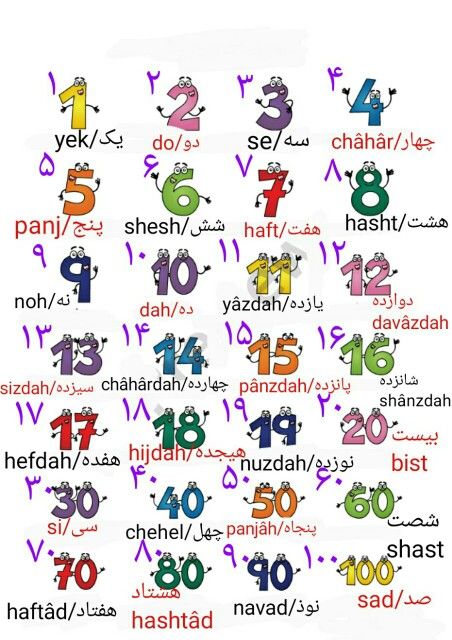
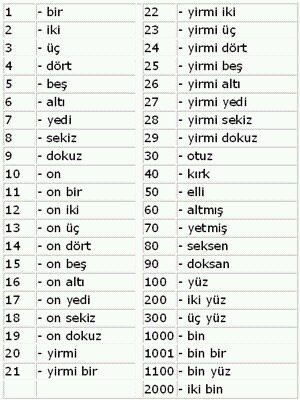
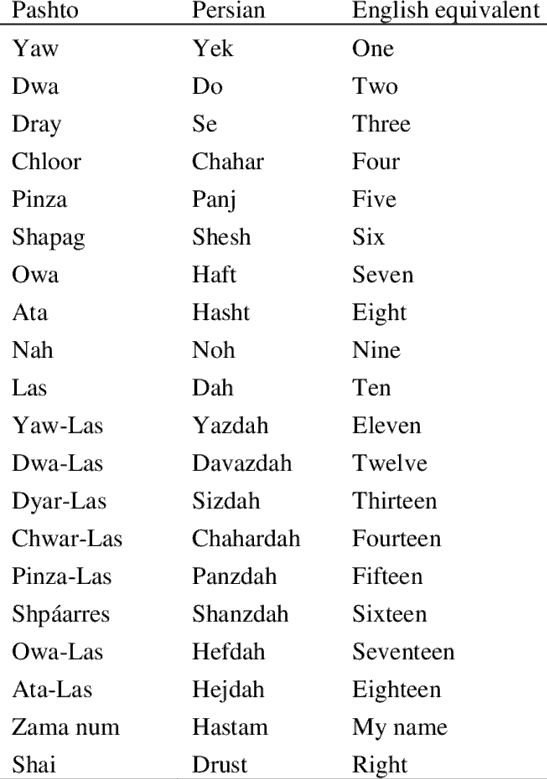
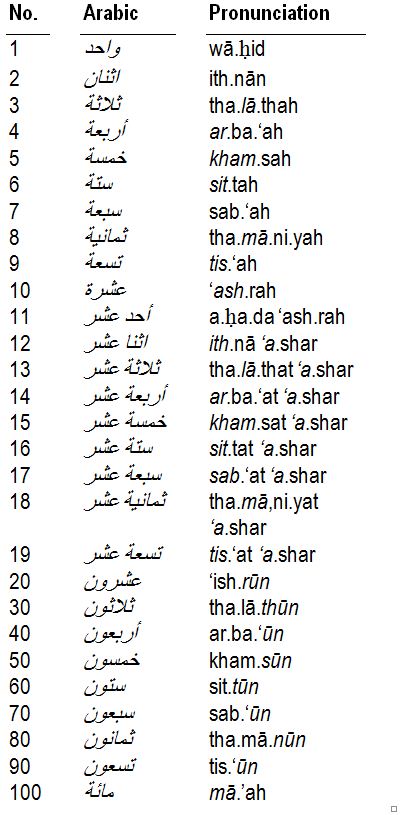
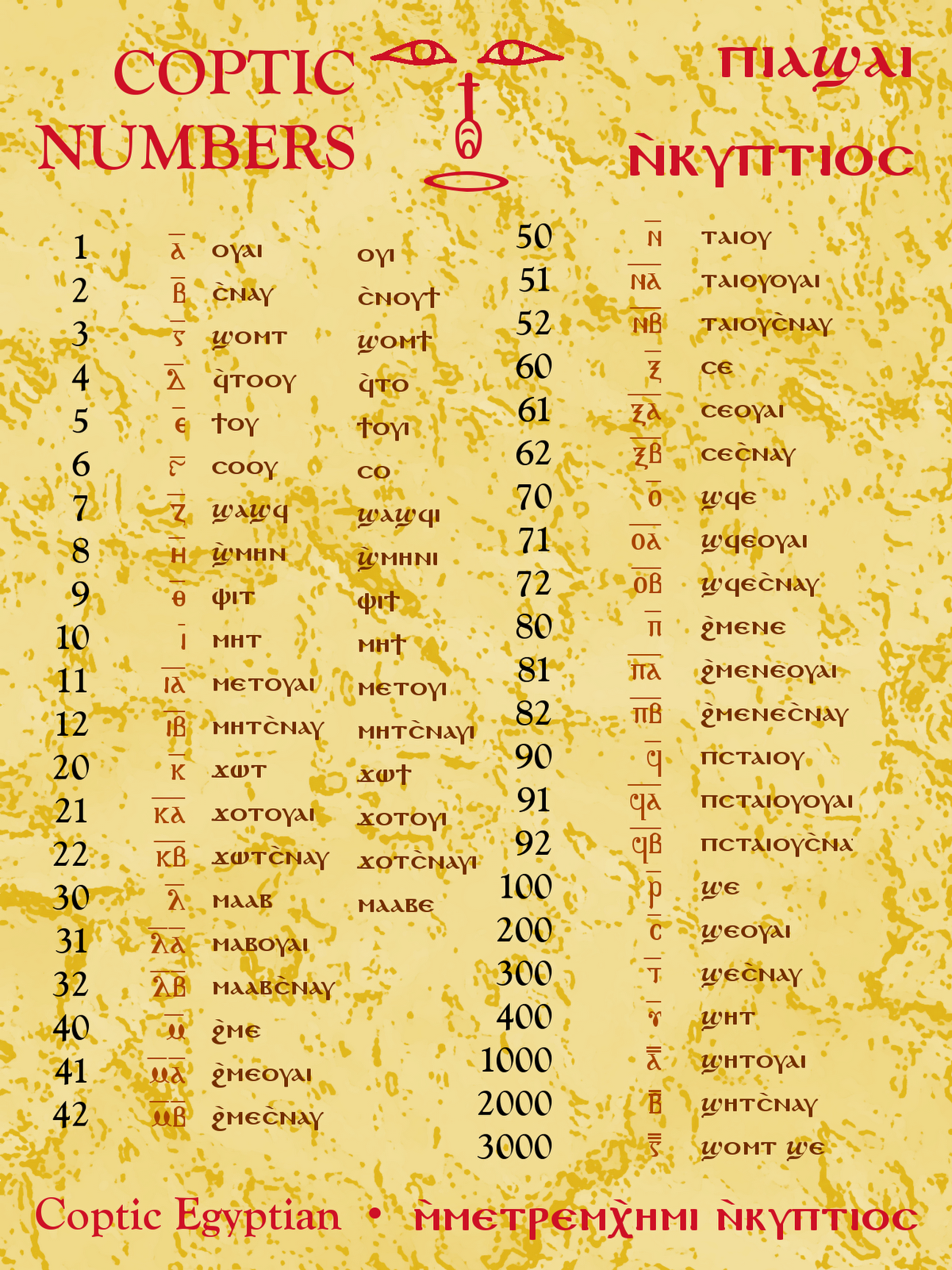
The koptic numerals, supposedly the way they were in egyptian, some words are similar to hebrew:
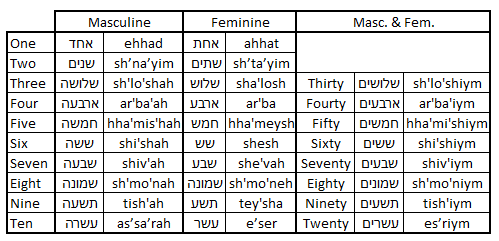
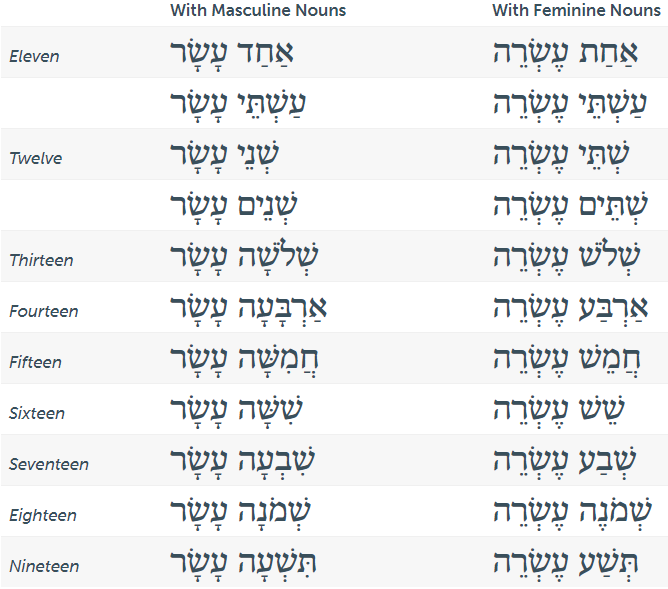
Notice how ע and ש are similar, almost like E & Ш, Ε and Σ
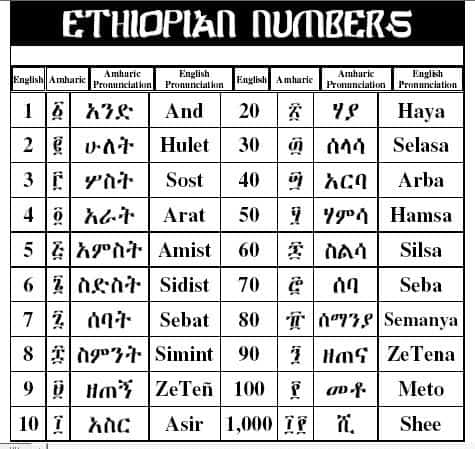
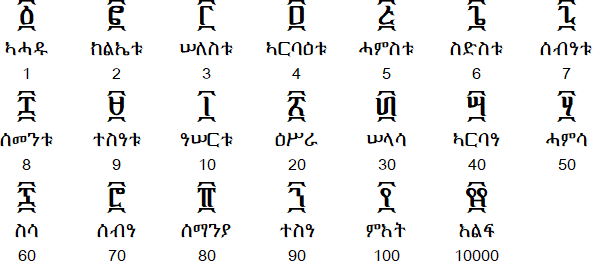
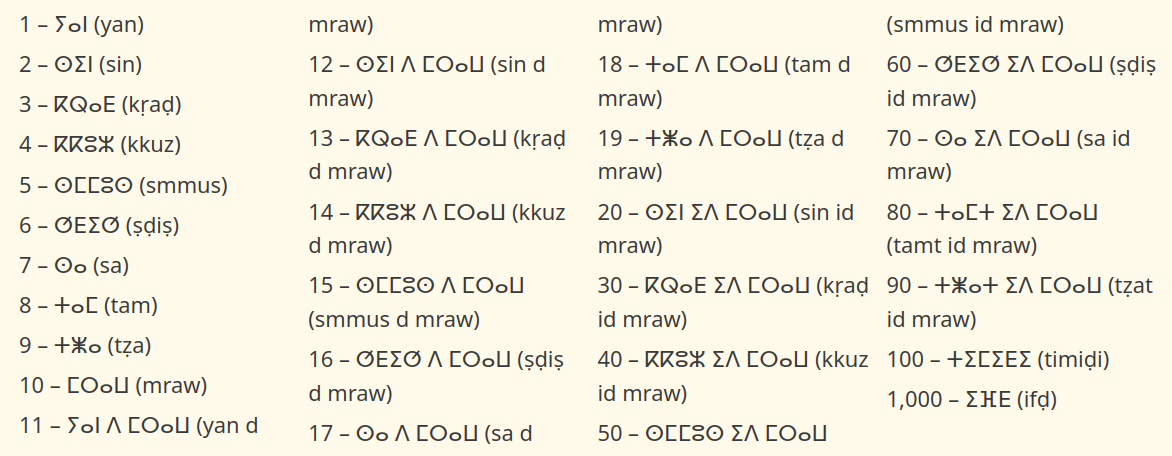
None of these ring any bell. But what am I doing here exactly?
I think I try to keep on delivering, and now I do it at my currently deminished abilities (my sweetest friend made me snort amphetamines before we went to some techno party. I could dance without that shit the same way or even better, but I am rather autistic so I sorta felt like obeying my more extravert friend, so after that we had some cocktails and that was supposed to be it, but.. what am I doing here? I'm trying to explain why it's tuesday now and that day was friday or saturday, and these days were rather empty, and no good weed that could kick that shit out of my head, some weed, but it's only leaves. So I didn't get drunk, but I got about a quarter of liter of wiskey and I don't usually drink alcohol, so it will take some time, I will report when I feel being at the top of it again. until then, stay safe, avoid dirt. And don't forget that those who you admire can ruin you (and those you underestimate can save you, so they say, and it makes reasonable sense) and my friend didn't drink more than one cocktail, but he was vaccinated, and I am not so I was sorta paranoid about all those people and no masks allowed (was it not allowed? my friend told me not to put it on until we're inside and I didn't at all, because when in Rome do like romans do, for someone this revolutionary I'm way to conform)
So let's try from some other corners:
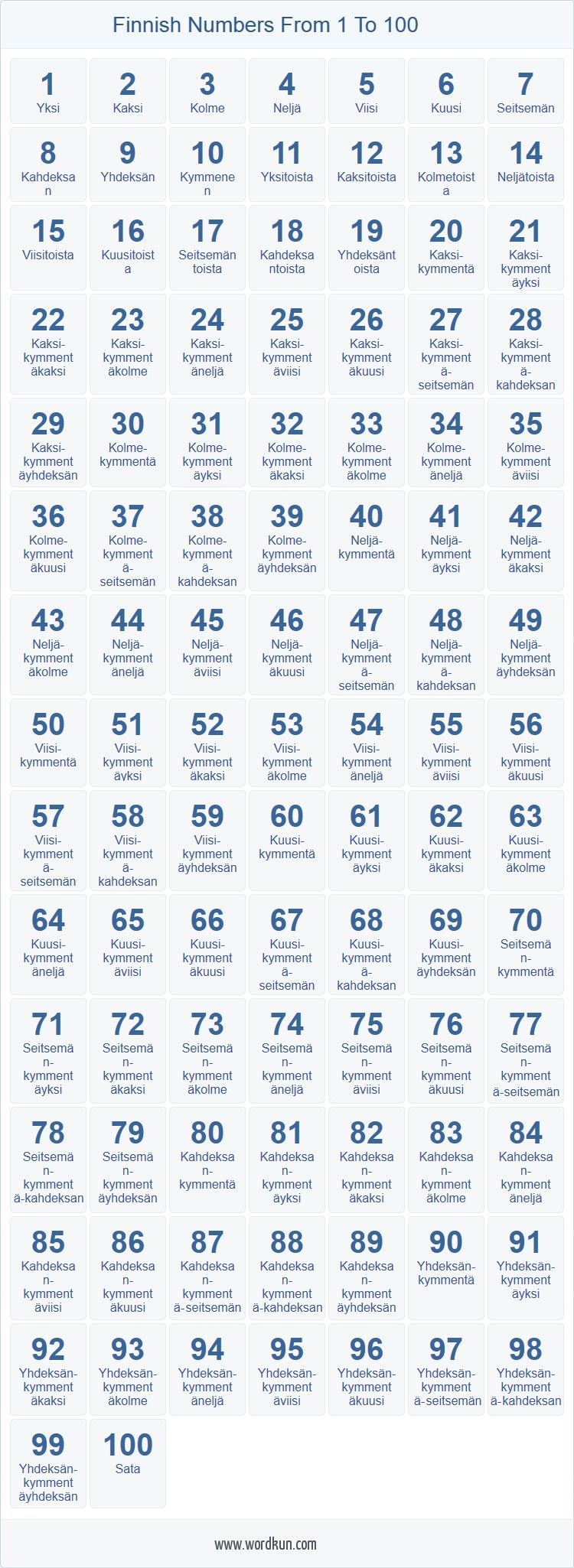
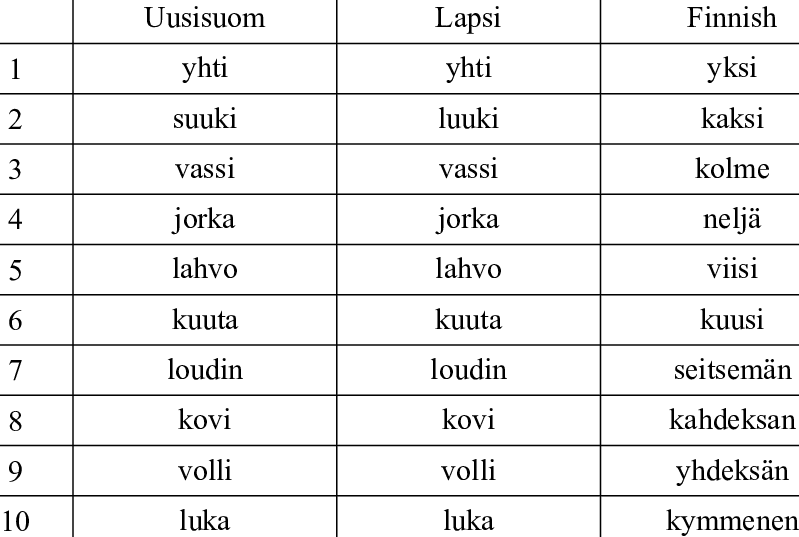
 for one
language family finns and magyars have incredibly different
numerals. I wonder what could cause this diversity in numbers
among the nations.
for one
language family finns and magyars have incredibly different
numerals. I wonder what could cause this diversity in numbers
among the nations.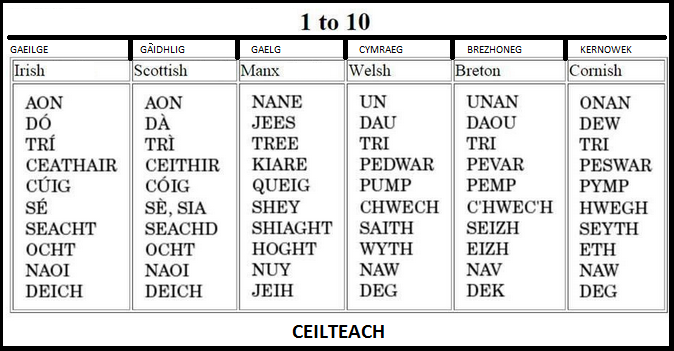

What is interesting about that image is the way it tells that scottish D is read as G, or even J, which is super weird, and could be a key to something, but let's keep on with this collection quest.
Actually that 6 tetraktis as the sumerian 60 thing came to me that night, and I noticed before that I'm better at math when I'm having a hangover, but was it some good math? I think I know I suck at it.
And that numeral thing came to me in this serious post (notice, that it's remembering and not creation of new knowledge, because I was rather sober. Literally sober: haven't smoked before that and didn't smoke too much on the previous day, though it wouldn't make me less sober elsewhere, but I noticed that anyway. gray.) I made few hours ago, over four hours it was, since then I had conversation about it to a fan or fren

Is it octal or quadral? quadrat, quadrant, square, tetraktis is greek form of it. Why no the most important languages yet! Do it, thanks for collecting them here, I'm sorry I got you intoxicating. It's my social body tells to my brain body. Brain feels biomass loss at its temples, right over the ridge from the eyes. I am crazy. Yes, sometimes. No intoxication when it's not needed. Please!
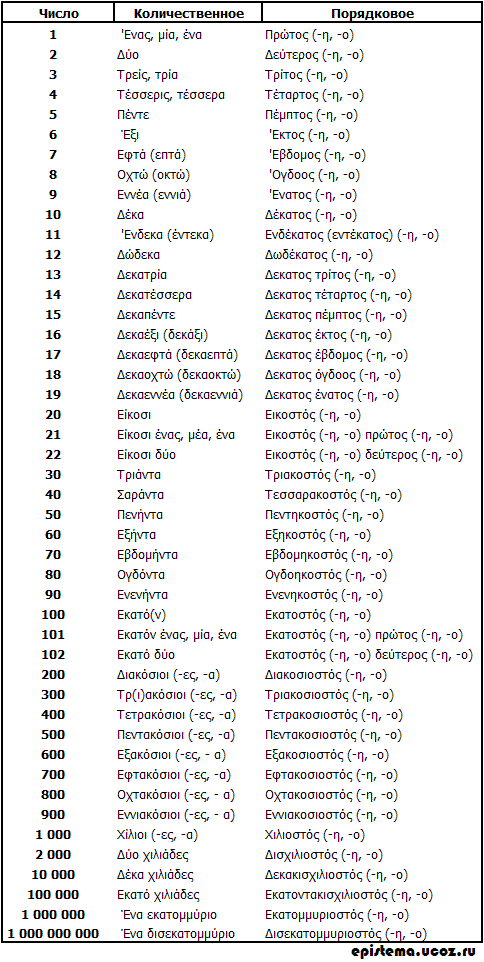
πέντε ~ πέμπτος makes me think that ν used to be v, because μπ is b in modern greek, and who knows if it wasn't so in the ancient one. As I said, the modern languages are the most firm foundament for a research, others are theorized and theories don't describe reality as good as reality itself does.
That was greek, and now the latin:
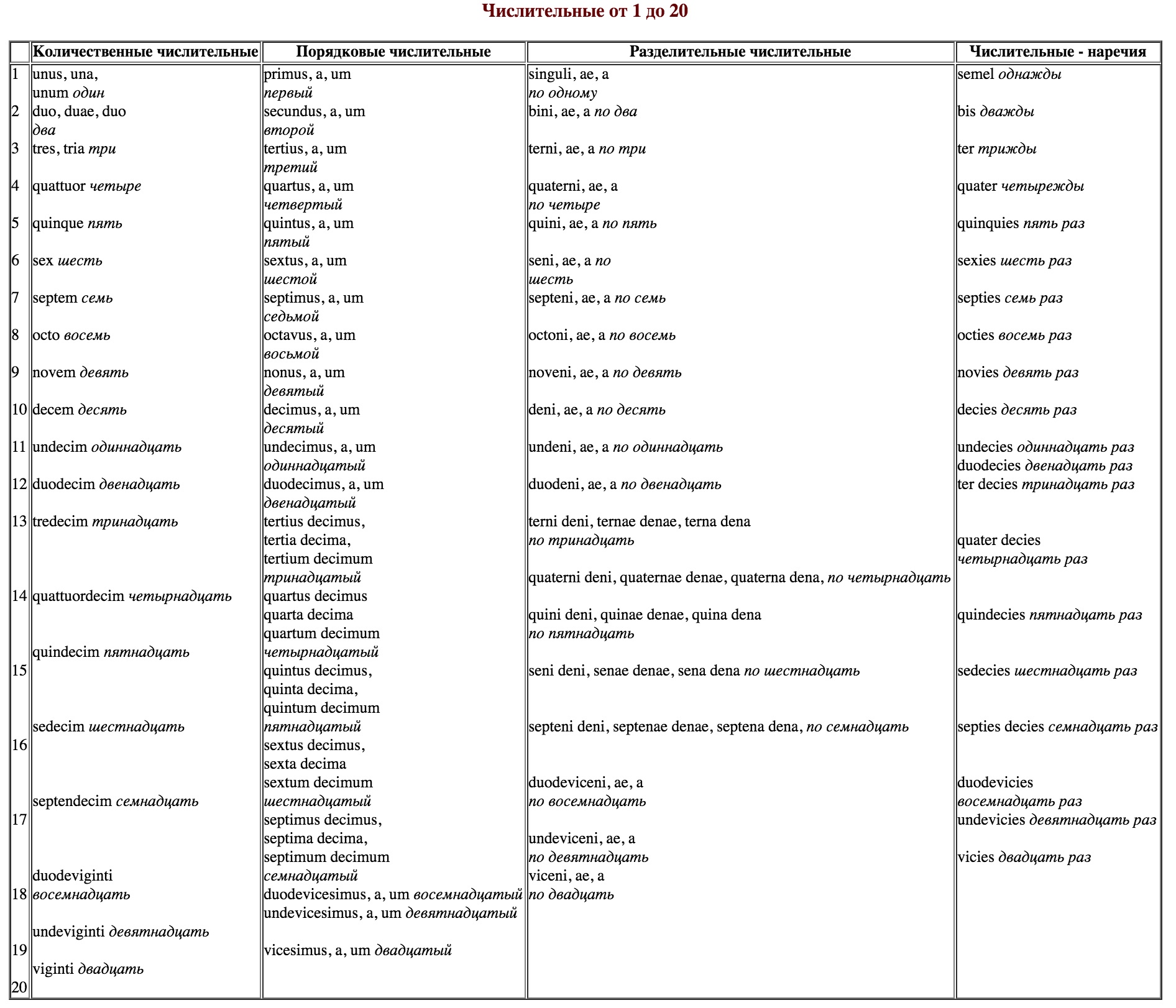
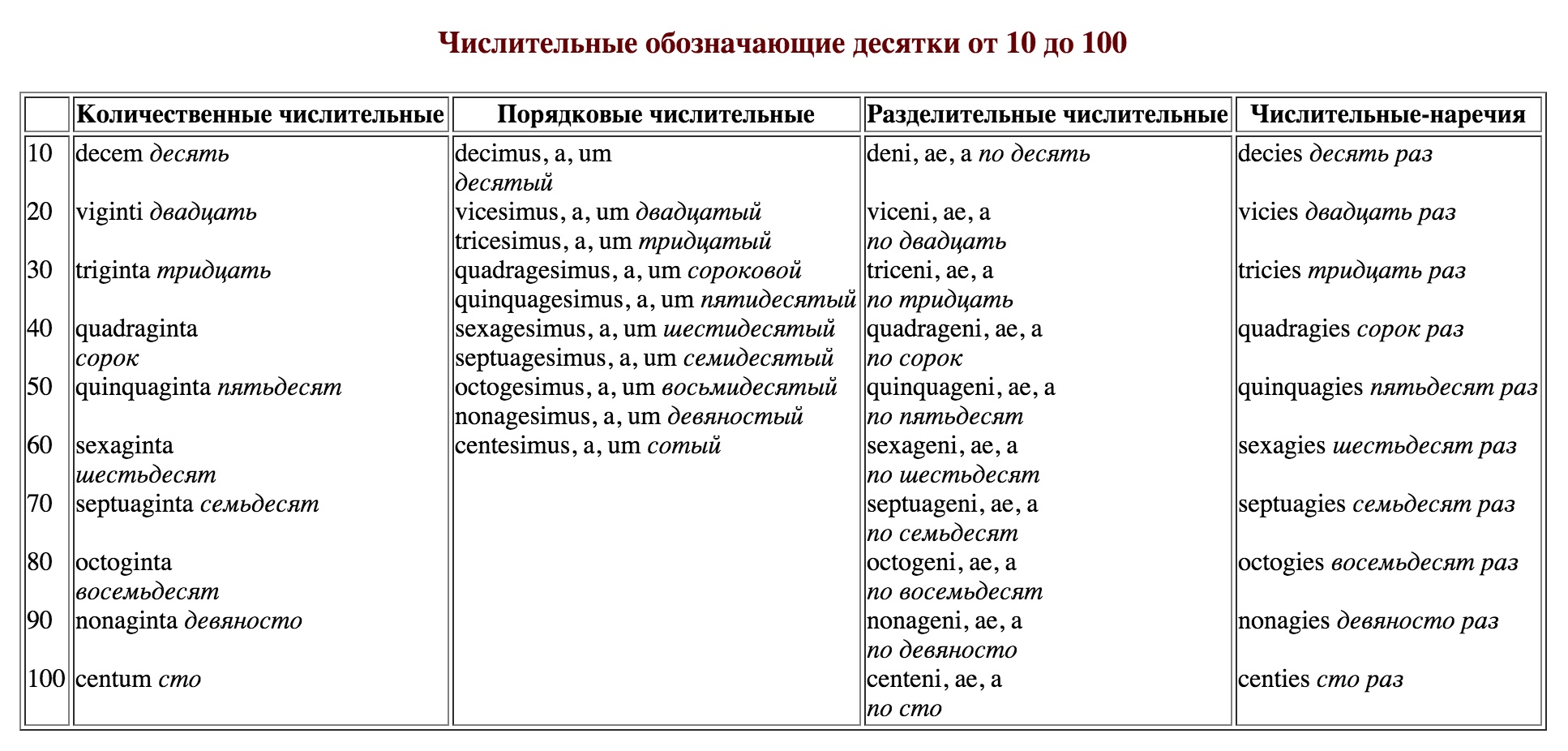
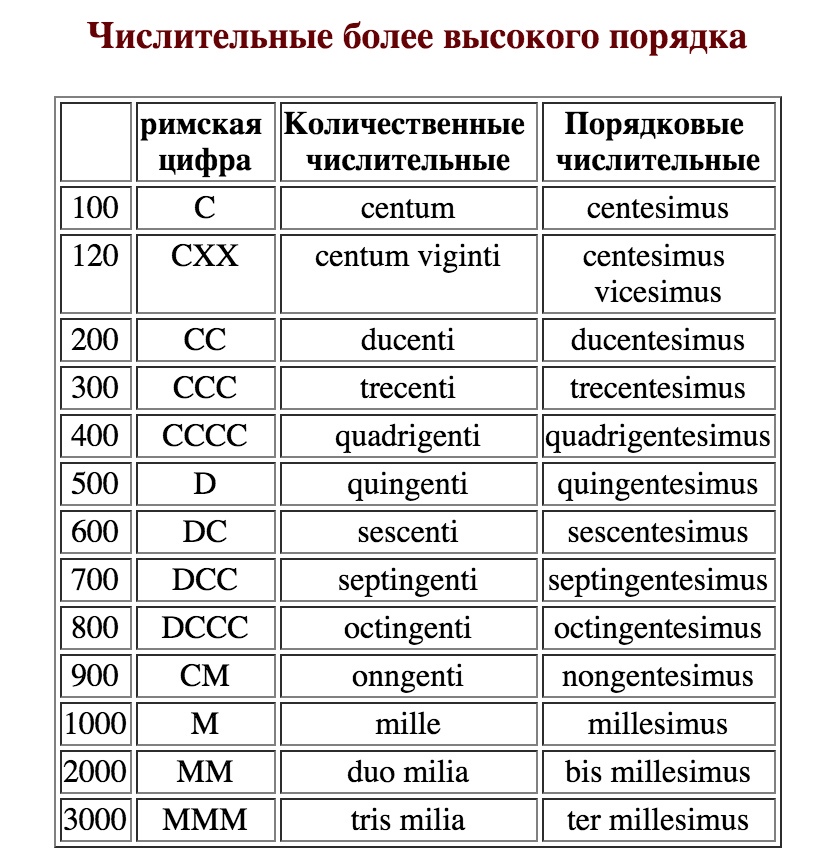
The way C flows into G in latin is fascination! ducenti trecenti, but quadrigenti and quingenti.
And the way they repeat q in two neighbouring numbers make me remember four five, exactly the quattor quince. quni quinque.
Which made me ask. How exactly did that letter after P was read? Surely not as F? Not as fuattor of four and fuinfue or finfe of five? Why I ask is that gothic letter after e is recognized as kw, which could be false, because that letter is supposed to be much more labial than just some kw, and goths were the neighbouring nation of the Rome, so why wouldn't they share their systems a little more than we're even taught. (the gothic alphabet can be seen above (ctrlF gothic) and I'm glad I know russian, because if you search the internet for gothic script you get all the wrong images, which makes me ask what on earth are they trying to hide this way? Or is it just a coincidence)
Notice, how similar greek and roman words for two and three. And notice how greek numerals is similar to russian (except the one, which is more different in all latin, greek, russian, so russians are what? the next in line to greek and roman, but we know that axis as the axis of tradition, but could russian be placed there so that it looked as it was the predecessor? Not if all those axes are the rays coming out of Greece. The portal culture probably taking it from Egypt and all the civilizations in between them. Romans wrote it themselves that Greece is their cultural mother, at least I was taught the way that I've got that an impression.
(you can see russian numerals in the translation of the latin ones)
And greeks and romans had other ways to write their numerals:

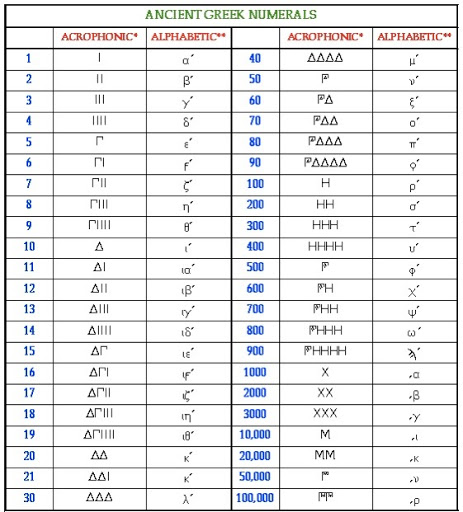
And it made me thinking, what if some nations just read this numbers as I for one, simpli i, double i for 2 as i-i and then i-i-i would be хихихи, and that made me see i-i as H and i-i-i as Ш and then H is labial? It is a very convenient way to roll this letter from vowel in greek to velar in latin to labial in japanese dare I say! and in some other cases it is so it seems, why I didn't remember where. I should start files for each letter. Let's do it for H
The way numerals are read in hebrew: The 613 commandments (Hebrew: תרי"ג מצוות: taryag mitzvot, "613 Mitzvot") - 613 is the number of mitzvot in the Jewish Torah.
And I theorize how IV would be ю or e, because V is exactly the fifth letter then, the way it would be in bornholm canon of ABDEF, wherer F is V in hebrew and some other alphbets. what other alphbets? In arabic it's w or even u, but that is also how V used to be read. maximvs. In georgian! In georgian it's V:
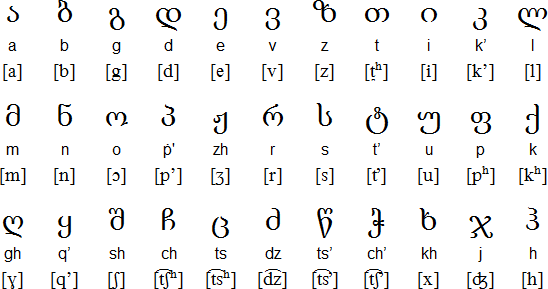
And I found some source on who could be responsible for the creation of georgian alphabet long before christianity, and even there I think it is not the alphabet itself was invented then, but some font of it:
Asomtavruli was probably modelled on the Greek alphabet, and Georgian scholars believe that King Pharnavaz I (ფარნავაზი) of Kartli (Iberia) created it.
.jpg)
It's hard to say how great and grace are linked, but great and grateful seem to be directly related, and then grateful is next to full of grace, and then grace is something great, the noun form of the adjective great. grays? rays?
I have no idea neither how old this relief is or what does he stand upon, but that pattern could demonstrate three forms like three mothers. And even if the image is not that old, that element could be taken from some ancient artifact standing for just what I said. Georgians definitely know something about all that, why don't I go to georgia to research this thing? I should write to them right now. Okay, I mailed it to the first georgian linguist that a search engine delivered. We'll see if I will ever get a response.
> забористая от слова забор
трава забирает, а забор запирает, но не как запор, а как забор земли. Или если в контексте "запоры и засовы", то даже да. п = б. папа в арабском баба (баба in russian is grandmother)
EFГI is the sequence I've shown before but now it goes one step further. And then I could be the T, the end of the 10-digit numeral system.
The previous
It looks like BEГI (run) and this optical illusion made me see, that before E go В and Б
ВБЕFГI (выбери, and F in such a word could stand out of the mode, like a tritone, considered to be disturbing. dis turbing тюрбан срывает?
BБEFГI
only graphically do they correspond, but in reality it's AБВГДЕЖ(and F is there somewhere)
Ж ~ Ф?
bd
pq
they tried to conceal it by saying that minuscule forms only appeared in the medieaval times, which is not true, sow why would they lie if they didn't want to hide something?
bd
pq
labials have the belly at front, if where we go, or in back, if letters go there, but it's a back part of it if we apply egyptian standard of drawing letters with their faces to the beginning of the line. And that standart has its sense and reason: if letters are the procession, then those who came first are at the left in the left to right direction of writing, and then the procession looks at the beginning of the line indeed.
so we can see where which part of the body is:
b is butt, d is dick, or g is gut (belly)
p is pack (back or backpack)
q is cor?
So why are lower parts voiced? because butt and belly are the
are p and q unanimated backpack and куль (груз в руках?)
butt is pussy if d is dick. isnt't it some lack of academic rigor I afford myself? why did I pull p here?
what's the use of this poetry anyway?
по и под антонимы. д = дно? до?
по до (под диваном по тому что до дивана)
дно до воды. до неё?
Could people who invented the alphabet swim?
butt под?
puss
At this point I do carry in my head more than I had to. Who knows what linguistic information is correct and which is not, I just noticed myself speaking wrongly on gothic (I used to say that gothic q read as f, but in reality gothic u is read as kw, but I have to correct myself instead of surprising you in here, because why disinform when I can not to. But there are many mistakes, forming the lies, and some lies are probably in quotes and pictues too, because mistakes of such a form are called simply lies, and though it is not immediately recognized as a malicious act, but who knows if you yourself believe in what you say or you just want to fool us for whatever reason or if you fooled yourself (made a mistake) or was fooled by someone else, until that foolishness is dangerous
мстить поместить, мстит поместит - хм, почему мстит в настоящем времни, а поместит even with the same syllables stressed, is in the future? Now I wanted to strat collecting the hypotheses the way they come to my head
This text should be like click-bait, very sweet and mellow and every word is clickable. But would so many code hang the system? I mean (я плохой) может употребляться как ввводное слово, но why does it go mea culpa from time totime? Because if you have to rephrase, you phrased it poorly just before, speak clearly. Is my ballance of clear adjusted by my lazy speech when people tend not to understand me.
They say I speak быстро и нечётко. and I tried to fake it and I think I said старался как срался.
Выбрасывая целую силлаболу которую возможно таким же образом кто-то сократил до слог. слово силлабо -ла как суффикс, но чего? brute brutal taught total minimum minimal rectum rectal. hey, why so said so sad, because I cannot find any clear no_suffix/suffix thing? taught and brute are not so good, they're humour. Rent rental, so al is of, and -ен. in and of are antonyms, neh?
biologic biological are the synonyms though. so what is -al really? Some forms of однокоренные слова получаются.
post postal, so it's two against one that al is some form of en, the притяжательный суффикс, суффикс родительного падежа, что-то вроде этого.
офигел ~ офигенен ?
ах да, ел ещё и суффикс прощедшего времени в русском. postal is also posted. And it all comes together because of -ed forms like gotten, ridden, run maybe too. sudden? what is sud? situated?
бегал ~ беган (про ботинки, например)
пользовал ~ пользован
-ed and -ed of the -ал and -ан.
And it was definitely an end of the thought, I could only force it, but I didn't feel need to force something after I was deliverd so plenty just a moment ago.
Тогда давай сфокусируемся на этих -ал and -an
л п н? л как и? ипN
как интересно мой мозг вернулся к недавней теме. он решил использовать её просто раньше, до того как я её заметил, и он незамечал. Таким образом я и создаю свои мозги. Подмечая новые кусочки мозайки этого мира (а я замахнулся прошлое понимать, и может лишь естественно, ято я этим инструментом и в будущее заглядываю (или, может, это другой инструмент, но тот инструмент в любом случае использует ресурсы того, и таким бразом у меня раздвоение типа раздвоения скоростей света, два определения и тождественны ли они человечество в 20 веке не знало. Ладно, я себя напрягаю неблагодарно. Мне дали ал ~ ан ~= ed ~ ed. И дела. до новых..
teeth are atavism (I had to place it in hooks notebook, but I didn't find it)
В украинском -ал is -ав
some powerful thought was here, and probably something else instead of ha
ха
хэйт (I hate you)
хау (ik hou van jou)
love ~ лови
lose ~ теряй (брось? лось? лоси сбрасывают рога. теряют рока рока рога)
no, I really have to go.
but the charriot didn't come, so I'm here. Why am I here.
what does -n -l both are under -d
-r -s -t (that thought instead of xa was something about -r- as some other sound appears when it's ri or ru.. and did I think h between l and d? no. it was something else.
hart like in heart or was it cor? what was that thought!!! That is why I have to record all my thoughts, because some of them tempt tend to run away.
Oh yes! it was about the way englishmen read o as a and a as e and what else is weird for russians? a is a sometimes, but only when it's followed by r, and whould it read any other way if it was some other consonant? and I palatalized R and I got Y and heart turned into hate. I went the other way and I met dutch hou (love, and in it Г and L meet again. H above L.. huh..)
Завещал обещал - однокоренные?
> Нигде не останавливалось столько народа, как перед картинною лавочкою на Щукином дворе.
Nowhere did so many people pause as before the little picture-shop in the Shtchukinui Dvor.
it's Schukin Dvor.

I don't wanna fuck in shit
I don't wanna be fucking shit
I'm sorry for such dirty examples (put them in grey for those who' rather not read squear words. s-words.
s is 𑀩? that is ba (in brahmi 23rd) and actually similar to ם, or am I pulling it?
𐰿? that is old turkic rune of aš /aʃ/ аш is ш [ʃ] in russian.
How comes n'ko ߛ is the closest to the brahmic 𑀩?
How many other similarities between brahmi and n'ko?
Let's compare brahmi and n'ko side by side: (n'ko is in the centre, brahmi is by it's side, use sidescroll)
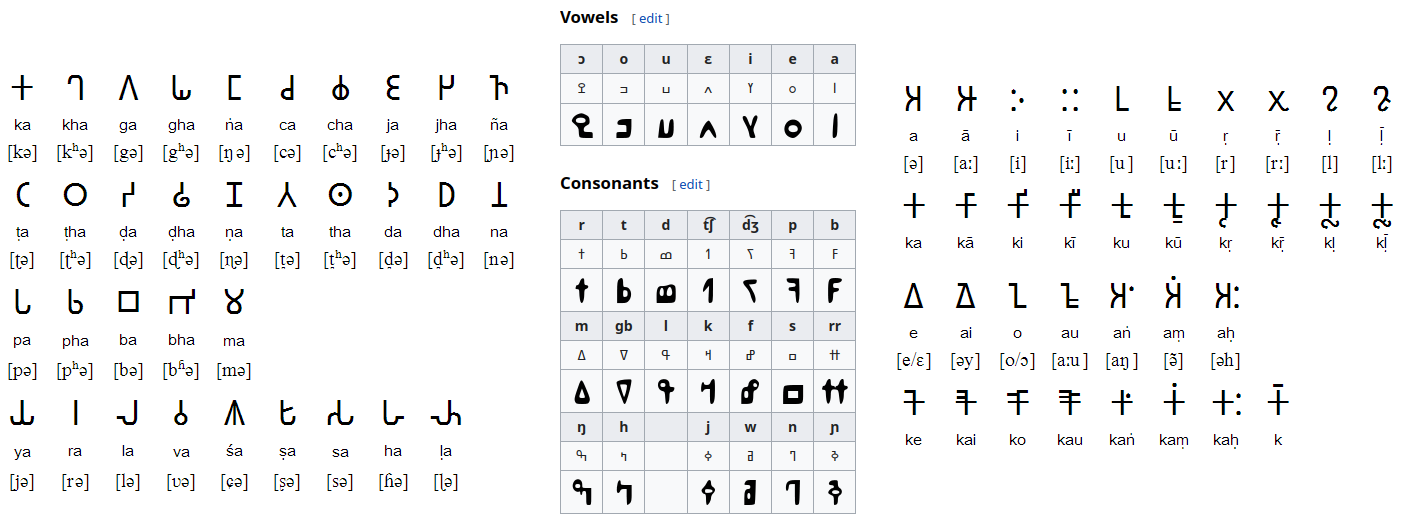
What came to my attention first (second after the squares) is cross at the beginning of them all. So I suppose they make tradition together with glagolitic, and that may say something about when glagolythic was introduced, and n'ko is thus some ancient writing system. But it's not just parrotted from brahmi, because in brahmi cross is k, and in n'ko it is b R
The way n'ko is aligned is interesting. two times by 7 and the third 7 is 6. phnetically though I don't see any system in there.
Triangles are also read differently: e in brahmi and ŋ in n'ko. Both could be descendance (descendants) of some ancient eng, and what is it in egyptian? g 𓎼 Red jar stand g g ejective /kʼ/
I think k is not some red jar stand, but it's an axe, and it's red because it is in blood.
𓂞𓏙 dỉ D37 X8
That is direcly next to greek Δ
and where Δ is, norsk runes have ᚦ which as I think is an axe. molot tora topor.
and some untransliterated triliteral: 𓇮??? (M44? It was at another triangle which is only in jpg in vol.1)
Mercy is exactly милости. Там где русский просит мирости милости, англичанин просит мёрси, очень похоже на прости, сорри, с ~ м like Ϻ ~ M. милость ~ смелость. С милой смелый.
With mercy russians are brave. English brave is in rave, that is second case b is in in english, let's make special file for it, because I already don't remember the first case.
милости заканчивается на те же суффиксы, что и прости? или если про- приставка, то сти это корень? с корень, ти суффикс. просил другая форма этого же слова. Круто, как полотно в матрице языка прорезал там где прохода не было никогда.
Возил, вести. нормальная пара
просил просить простить. сить ~ стить?
просить простить
прошу прощу
Недавна узнал, что побежал было формой слова побеждал до того как бегит стало бежит. У микитки (как он прикольно заставил его ласково чтоб называли хитрец) про правильность неправильных форм глагола вот здесь где-то: https://www.youtube.com/watch?v=Gm1ucJ6Y6R0
просил простил
просите простите
просимо простимо
но не простимо, а простительно
просительно простительно. просительно слово понятное, но это уже почти что словотворчество.
вопрос вопрост
просо просто
странно.. простить упростить
отлично. просить упросить
-т- суффикс, но что это за суффикс: просить это проститься. просить отпустить?
Oh, some awesome session I had in my bathtub, and thus it is in cardboard papers, here's a touch of it:
Иди с богом, с боком? со споком? сбока собака.
So was this word born when not only b = d it was, but also god = dog it was, as if g and d were separate entities and their position was the question of taste and only later dog became the totemic animal, and god was the way it was in the dictionary? g-d, г-дь, c was g in case you are not aware of it. How am I aware of it? I heard it. Is it correct? Honestly I don't know. But it is this way in greek and russian. And hebrew too. So it's natural to think that it was like that in latin, but I hope they also had some archaeologic evidence for that.
voiceless cat reflects laughing, лающую dog. and by k-symmetry it reflects.
jihgfedgba@opqtuvwxyz
actually, this symmetry is aeiou symmetry, it's just the other half is reversed to make god just dog, but it's god. гад гав. гаѳ.
and what about klmn? well, good question, k is singled out in k-symmetry, and k is not on its place according to the abcd structure, and lmn is element (but I swallowed this etymology, is it even true? I read it in more than one place, but it doesn't prove it either. So it's like I have to solve the jigsaw puzzle where some elements are from some other set, from no set or some other way distort the focus, but hopefully I will be able to figure it out, because the new and new information keeps on coming, and this thing grows not only in width, but also in depth. -ал -ан ~ -ed -ed is a superhit. Such a hit that I ask myself "haven't I noticed it before?" who cares, if I noticed it, I didn't know it, now I do and will be able to use this symmetry in some other context, maybe.
actually at that cardboard there was not this last part of dg qt and around "c was g" I went the other way, so I will return to that, or it will be in papers, but probably not in the papers I will publish in this volume (I said I will do it in the previous one, but I'm rather far in this one and I still didn't sort them out, but I have already placed it on my laptop and converted heic's to jpg's. Now I have to shrink them and place them into html's. It's quite a bugger. Will do. Especially because the previous portion was in the middle of vol.4, and this one is 13 which is easy to remember, or if I make it in 14 it will be easy to remember too. We'll see. 4 13 22 31 40 49 or 4 14 24 34 44 will be with scans of papers, but then again who knows how fast will next portion be collected to the same size. A witch kinda pulled me down on wasting paper. I have to battle her in front of her guy. I believe chicks remove bachelors from their boyfriends friend circle not to lose the boyfriend to an example of joyous bachelor. Either way, battle it will be. She's a friendly witch, that battle will be cuddle in a way) but the next folder of carboards which appears on this site will contain it, and many more stuff. That witch asked me why I fill the papers with the thoughts, and here's why: I have these sessions during which I can pull some great ideas out of my subconsciousness which is constantly working on this linguistic stuff or I weave them directly during those sessions, or they come from some other place, either way they're so abundant, that it's impossible to ingrane them all in this corpus, Actually the thoughts I placed in some vol.5 for example would be new to me because I placed them here only to forget by my operative memory.
But I collect all these thoughts to feed them to some ai one day, and the cardboards appear because it's inconvenient to work on laptop taking a bath, and notebooks appear because sometimes notebooks are more comfy or convenient. EIther way, why is this graphomania here? place it all in gray gravy, duh.
and I got distracted from the comparing of brahmi to n'ko by that bath session. Let's retur to it:
𑀞 is th in brahmi, but ߋ is e in n'ko. So far it looks like these forms are similar only by accident, like O is o in latin, and it's more similar to n'ko's e, but does it actually relate to it? I still doubt it.
Why doubt if brahmi 𑀥 is almost D, the dha. And brahmi 𑀝 is almost C, Ta. But brahmi 𑀞 is tha, nowhere near O, but what if it's because it's Θ, for 𑀣 is some other tha, I only vaguely imagine the differentce between one with the dot and the one without it.
𑀨 is bha, like what is going on! Is 𑀅 aleph? Is 𑀕 𐤂? Like come on! Brahmi is definitely related to something european. And though 𑀗 reminds reversed נ and 𑀱 could remind С[s] and 𑀳 could remind h, 𑀘 (ca) could be related to d, or it all could be so speculative and statistically void, that why is it even here, just to show that I do what I intended. But I intended to compare brahmi ot n'ko. I probably created brahmi to latin before.
I'm not going to compare brahmi and n'ko, because let the non-biased machines do it. I generate ideas, let some other entities test them and develop them further. I heard some people cannot bring new ideas. Should they leave science immediately or should they just use the ideas guys and gals like me have contributed. Or I return to this megalyth with ai some day.
Actually such comparisons should be made my ai on the basis of hand-written and voiced texts, not on the basis of the table when I'm not even sure what the transliterateion means (chinese r is ʒ, q is tʃ, x is palatalized ʃ, and so on. Who knows how it is in other nations philologies, ai, voiced texts, please)
So, what can we do without ai and without obscure writing systems?
Let's play with alphabets I do know how to read. How to read latin? What about portuguese x I never knew to be ʃ too? is it where chinese took their transliterations? well, maybe.
Portuguese портовые guys? Is it why nobody conquered them?
antifa is intifa? intifada? not america first, but israel. israel & their insane fuckers.
insane fucking assholes doing assaninities.
Why do I say so? Who wants civil war if not asholes? Assholes who give shit to th powers that be?
Isn't it worse when an asshole doesn't give a shit. It's not even a question, it is. I guess.
Then you don't recognize him as an asshole, or is he even asshole when he doesn't give a "shit!"?
down used to be dol (дол) in russian: https://www.youtube.com/watch?v=4B3dxC8WY6M#t=13m19s
from the same source, but at 21m: mishkas is forest in lithuanian, which I consider related to мишка (медведь) but I'm such a freak at this point. What am I even doing here? I'm collecting all the hypothesis, it is my тетрадь бреда, которую какая-то книга по достижению успеха рекомендовала иметь.
It is interesting that modern (they say it's mostly russian) fashion to sign positive and negative emotions by brackets of ) for :) and ( for :( correspond waxing and waning crescent symbols of☽ and ☾
Is christian secretly related to crescent?☽☾☾ ☽ (it is interesting, that these signs have obligatory spacebar where the rest of the moon is situated (I unerlined them to show it, and I see the cow horns. And thus moon cult is directly related to the moo-ers cult, and hence the name, I suppose) I like it that brackets close with the growing moon, as if what is between them is newmoon and thus dark (or in my case they're gray)
Not necessarily, but it may be used as some wicked rhyme in a religious song.
Both christians and the crescents may fuck of in this krai.
crescent срезан? срест ~ резать? огнём и мечом. олимпиада прекрасная замена войн: олимпийским огнём и мячом.
So was огнём и мечом поэтической формулой, которую пришло аж перефорщивать (мяч более популярное слово, чем меч. мяч от слова мять?
Are two angels at our shoulders elements of schizophrenia we got as folie à deux from dnst3-infested?
a
b c d
Е ж З
am I tripping or does coursive E mirrors З just the way b mirros d? (как бог и дьявол? как бог и дьявол. В английском оно так не работает, там не b & d противопоставлятся, а g & д. I wonder why g goes below while д goes above. d as deus, not only devil? g as гад, который ползёт? и змеепоклонники-христиане и рептилоидность авраамических религий может сюда относиться каким-либо образом.
or
a
b c d
e
f g h
I came upon this shorter version by accident, when I revisited russian axial symmetry without Ё & Й, and there whether е or и were cut out, and if it's е, it's four in latin and actually five in russian. And if we look at norsk ᛆᛒᚦᚾᚠ (whether dannish, or who knows some predecessors of russian maybe (because it contains almost Ж and exactly where russian has it, russians add greek З to it) )
then F is fifth, which is great, but the word four (vier as for ו) and of how much the form of F reminds 4, it all demands further abbreviation of the alphabet. Whether F was before E? for E as 5 would be normal and graphically it would make sense no less than this:

And then.. is 🯸 7? It would make sense in the 01234567 base set. Which is octal, though not the same way roman IVXLCD could be octal if X was 8 so I suggest it was before Zen and thus before Zero, then some 𓏣, 𓏭, 𓏥, 🯴, 🯵, 🯶, 🯸 or if it was within that chart then some 一, 二, 三, 🯴, 🯵, 🯶, 🯸 would be numbers 1 to 7 (не потому ли семь и восемь настолько похожи в русском?) другое дело, что это уже фрикота просто запредельная, но я себе ещё и не такое позволяю.
I only knew this sequence of georgians:
ა ბ გ დ ე ვ ზ თ ი კ ლ მ ნ ო პ ჟ რ ს ტ უ ფ ქ ღ ყ შ ჩ ც ძ წ ჭ ხ ჯ ჰ
But I found a much more abundant version:
ᲐᲑᲒᲓᲔᲕᲖᲗᲘᲙᲚᲛᲜᲝᲞᲟᲠᲡᲢᲣᲤᲥᲦᲧᲨᲩᲪᲫᲬᲭᲮᲯᲰᲱᲲᲳᲴᲵᲶᲷᲸᲹᲺᲽᲾᲿ
and I notice that the font is somewhat different, and indeed there is another set:
აბგდევზთიკლმნოპჟრსტუფქღყშჩცძწჭხჯჰჱჲჳჴჵჶჷჸჹჺ჻ჼჽჾჿ
And I look at the first new letter Ჱ and wiktionary tells that it's Eighth letter of the Georgian alphabet.
I go like what.. and what is it, indeed:

And I googled "ა ბ გ დ ე ვ ზ თ ი კ ლ მ ნ ო პ ჟ რ ს ტ უ ფ ქ ღ ყ შ ჩ ც ძ წ ჭ ხ ჯ ჰ" and I found that I looked into it in vol.8 and many other related finds tell that it's quite alright, I was not mislead, and here's a piece I found yet in vol.8 and since forgot: The Society for the Spreading of Literacy among Georgians, founded by Prince Ilia Chavchavadze in 1879, discarded five letters from the Georgian alphabet that had become redundant: ჱ ჲ ჳ ჴ ჵ
and 3 or 4 of those 5 did mess up the structure. So did he know of that structure (than why didn't he place მ among labial column? Maybe because it is მ ნ and some story is connected to them, but not to be this speculative, I have to read into what that prince Ilia Chavchavadze wrote about why he removed those particular letters. Could it be that they were introduced by christeners and yet georgians never applied those letters or those sounds? A hypothesis, of course, I have to begin with Daniels, Peter T. (1996). The World's Writing Systems. Oxford University Press. ISBN 978-0-19-507993-7. where that quote links fro wiki where I found it.
And there are many more letters I can explore: ჶ • (f) It is now obsolete in Georgian, but is used in Laz.
when was it introduced, whe has it become obsolete? questions, questions..
And in vol.8 I pondered on reading some of Chavchavadze and I never did, and it's not too fat a chance that I will. I suspect that he was never translated into russian and so I asked some georgian scholars for help, I hope they answer to unaffiliated emails.
And looking into it i found this interesting scan:
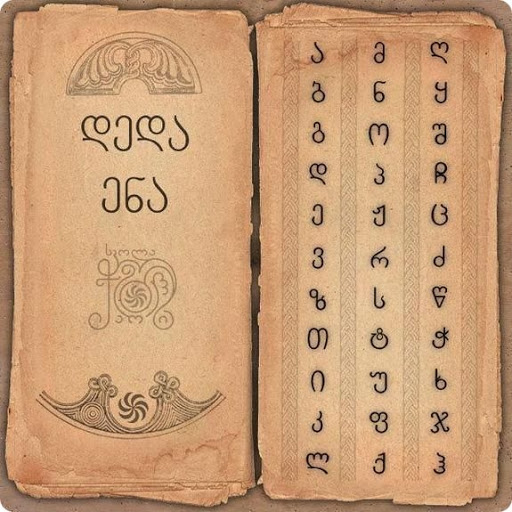
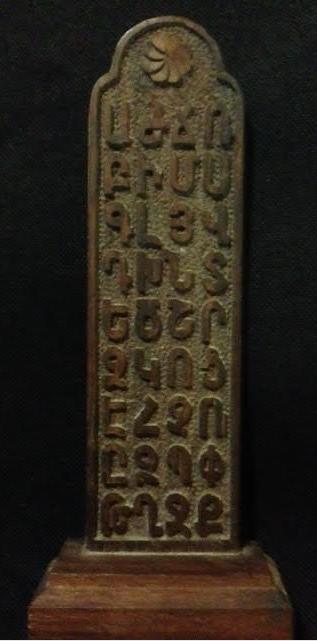
and that ֍ made me remember that I saw something very similar,
only in armenian alphabet, at some random artefact I acquired
during some bookinist shopping,
and there it also depicts ֍ not ֎ yet I wonder why,
and both signs are in the unicode directly after armenian alphabet
and the following image shows that it is some
kind of tradition in the region:
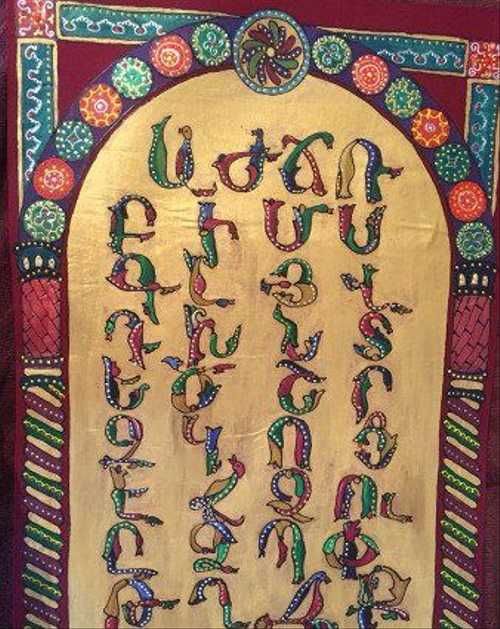
but in this one it's rather ֎
This incident've shown that I don't know what I said, which is also great: I can be independent even from my self the way I avoided books on the subject not to repeat their mistakes, and now I know I can check this text to consistency against itself.
So I don't even watch what I wrote about it in vol.7, but I go with this image further:
(I cut out those letters Mashtots added,
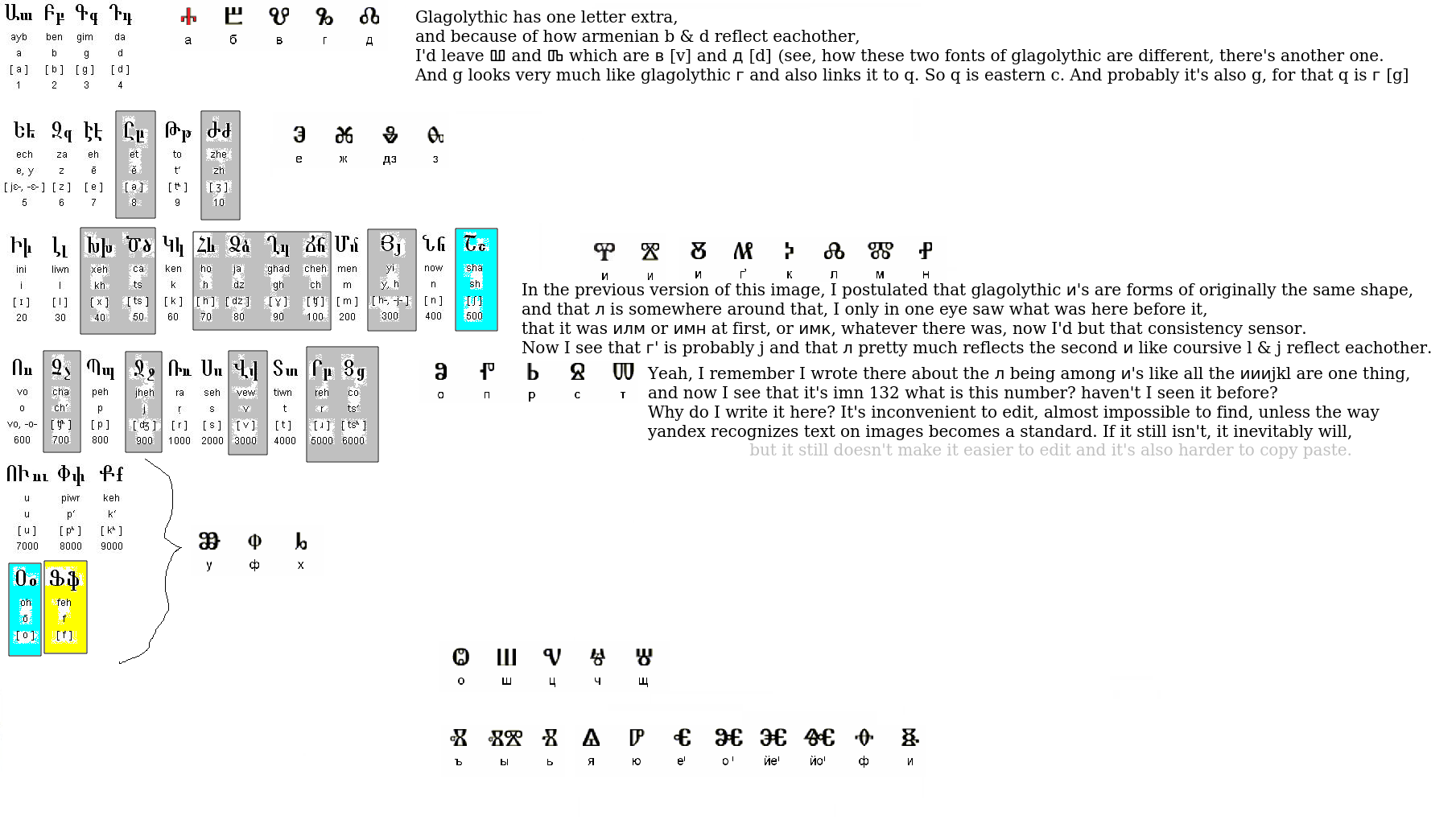
I pasted out by some tender colours letters that are not in glagolythic in the case of samekh or not in latin in the case of o, which is omega russian scripts also have. And in yellow it's (maybe occasionally, as words with f are foreign in rusian, a labial following the vowel omega. and it actually reminds hebrew coursive ף and ф and φ at the same time. So it could be borrowing from coursive hebrew or some other font of the region, some archaic forms of f are very similar yet I don't remember where, either way that armenian letter links hebrew coursive form to greek and even russian fert or is it fita, because armenian has more similar fert just above it. Why don't I use the armenian font?
I can't believe I never even copied it in my workbook of unicodes till this moment.
ԱԲԳԴԵԶԷԸԹԺԻԼԽԾԿՀՁՂՃՄՅՆՇՈՉՊՋՌՍՎՏՐՑՒՓՔՕՖՙ՚՛՜՝՞՟
ՠաբգդեզէըթժիլխծկհձղճմյնշոչպջռսվտրցւփքօֆևֈ։֊
If it was so much changed, it is probably containing some secrets underneath it all.
It's funny how armenian is so much different from latin, yet it has a little larger but exactly the same հ with the same phonetic meaning.
ՠ is some obsolete vowel, and that's literally reversed ա and the way Աա is majuscule and minuscule of the same letter make me remember Uw and the way it's followed by Բբ reminds me of УФ, which makes me think that maybe U-line is armenian? And then that գ the Գգ reminding q the most of all, which makes me ask, is U-line also O-line, the way it starts with ע in hebrew?
following = followed by
And I leave it here, I'm not ready to study armenian alphabet at the moment. It overwhelms.
Ա Բ Գ Դ Ե Զ Է Ը Թ Ժ Ի Լ ԽԾ Կ ՀՁՂՃ Մ Յ Ն Շ Ո Չ Պ Ջ Ռ Ս Վ Տ Ր Ց Ւ Փ Ք Օ Ֆ և
ՠա բ գ դ ե զ է ը թ ժ ի լ խ ծ կ հձղճ մ յ ն շ ո չ պ ջ ռ ս վ տ ր ց ւ փ ք օ ֆ ֈ։֊
ა ბ გ დ ე ვ ზ თ ი კ ლ მ ნ ო პ ჟ რ ს ტ უ ფ ქ ღ ყ შ ჩ ც ძ წ ჭ ხ ჯ ჰ ჱჲჳჴჵჶჷჸჹჺ჻ჼჽჾჿ
I wonder why georgian doesn't oppose b & d more obviously. but then again in russian Б and Д are not that obviously opposite
Is -te another form of -ed?
Like light is lit? Like fight is fist? драка длань рука?
Graphomania is wish to write when one has nothing to say. Every writer has such thing, the wish to write is not directly linked to the something to say in the process, only in the beginning of the book it must be present (exist persist)
persist present
exist isn't? ex not? is ис из!
easy is наречная форма слова is (you can do it by simply being there)
hard have to do.
Isn't it beautiful? And I didn't have to say it, I didn't know what is there before I began writing:
I didn't hard to say? no, hard is have to do. It would be hard if it was what you have to do to say it.
So it's good to start writing without having something to say? No, I began because I had something to say: I was going to say about graphomany, that I should avoid it. I mentioned it because I was wondering what a weird disease motivating you to do something. Now I understand. That graphomany piece would be of borderline with pure graphomany, because why was it here? or would be here, because it's rather off-topic in this work. But I collect here all the worthy pieces, very rarely do I
And because hard is disassembled into have to do, thus that r is rhotacism, if I'm using the term right, I only learnt its spelling just now. The t between vowels, give it away now. But that is not what I wanted to say! r in hard is japanese verbal suffix ru, which rlates to russian -ть which relates to english to. But we only know it as japanese, because there it is purely ru, but articulatoilly it's not that far from russian -ть and semantically they're cognate, and only theorizing of modern (not so modern, btw) linguistics tell us that japanese and russian can't relate. Why can't they? By geopolitical reasons, I suppose. Divide et empera all along. Those parasites now inevitably fuck off, but what are they going to fuck up then? They will find something new, so before their sociopathy is cured or cuped, we'll have their bs around.
be of me
bs of the boss
bm of the wife? b-m as short for bdsm? that's what I saw.
sort of bdsm
short for bdsm
short form of bdsm
-m of is sort of redundant and could be some m.f. мат.
So graphomania has to be dealt with during the editing: you have to check is the paragraph is beautiful or if it tells something important. Perfect text is both, so meaningless passages have to be removed, because even if they're pretty, emptiness of the text is ugly. Now this chapter is ugly in style and what is it? These two sentences are the least meaningful, so be concise. Leave only important pieces. So repetitions and shallow speculations go away. But repetitia matria lectiones или что-то типа того. забей, сажа. пепел, сон
(those three words can be seen as pretty by some, but what's the other use of them? none)
and ugly passages have to be rewritten.
and really beautiful things should be ingraned into some meaningful context.
Okay, hi, it's an hour till 4:20 and I couldn't sleep so I decided to start the day by getting sweets and hi
skull skill
k is some weird spelling so these two could be cognates, and they're probably cognates of school.
and school is of scold, scold is schooled?
He who scolded probably school. But suffixes tell otherwise:
Scold ~ Schooled. are these even cognates or am I a poet again?
Are soldiers scolded? They school themselves. Schools are military institutions.
Because of A (дмитрий гайдук про историю)
Because of B (john gatto prussian education)
scoldiers. So now at least I rationalized this word by some etymology who cares if it's volk or not.
Soldier is much better etymologized as seller. he who sold, but doesn't sell at the moment, now he's fighting the goodies the booties to sell. So merchants are marsians, people of the god of war. Martial arts are from this wor.d
And then I looked at the semantic part of that word. And I saw that that's a killer and I see sold as cold.
Kill is Cool. Cool is the verb, to cool someone. Cold is the noun? Причастие. Participle.
Compare particle and participle (particable?) Partycable is very Parliamnet Funkadelic.
Participle can work as a particle? iple able are arbeiten? nah,, but feels like that, so who knows.
To kill is успокоить, остудить. Naturally to etymologize it like this I had to know that people get cold when they're killed without variants, so we have semantic cognatism, which also manifested itself in the
4:20 in few minutes, let's take another one. I read on reddit yesterday that a guy smokes one toke once and then the second one in an hour. And he tells that it takes him half a gram per day. So how often does he smoke? Okay, let's test his way, 2 minutes, what.. is it beautiful part? because it's not of sense, unless I one minute, then was less than two. wht..
salt, sugar, milk, are all natural, we're all disinformed about fructose, about everything, we must research everything if we want to live forever. It is obvious. And I'm on completely different wave. So this spheric house thing is further away than the letters? Letters cam first .
came is prettier than cam. So that e is a swash, like a right lower part of k because ᚴ is too obvious a male organ. мужское начало. And because dots are often omitten in hebrew arabic and others, russian ё is often substituted with е in books, but й is never и in them. So let's look at russian font like that:
а
бв
гдежз
..and I pondered here, and looked at firs and it led me nowhere in particular, o I skipped it.
сосна потому что её можно сосать? смолу? люди так добывали минералы? сосать канифоль? использованную лучше не надо.
Soldiers продажные шкуры, наёмники, может потому mercenaries is next to merchants.
march mars mark мерзость тоже где-то здесь не далеко. мертвечина там же, стерва тоже, говорят, но быть может сан это неверное прочтение мана? ман это сотня в квадрате у китайцев.
(an, он) уан, сан, ман? 1 100 10000 как три материи? 1 air, 1 spirit, 1 god, 1 gas.
100 мелочей (твёрдых объектов), 10000 вод (в каплях, скорей всего, воду можно разбить на 10 000 частей скорей всего, а вещей у человека раньше было повезёт если сто? х.з. может с пожарами, набегами, прочим бредом, накопление было непростым занятием, иначе за тысячелетия мы бы все несметных богатств накопили. но вещи ещё и разрушаются.
Внезапно осознал, что изъятие золота у населения не злодейство, а багодеяние: из-за золота скорей всего убийств всегда было дофига. А так соблазн убрли.
золото ~ зло? золото корень зла? болото корень бола? буля? утопия? губное бол как вода? х.з.
gold g.old? old G?
чуть не забыл:
льстец подлец, если под- приставка, то лец это не тот ли льстец ли? подлец ещё ниже льстеца.
льстей льт лстец = лец. лизун. подлиза. лизать lick лакать lap. And I make lapping moves with the tongue in my mouth and I hear something similar to l of all letters. And I recognize that onamopoaeia. onomatopoeia as the source of L. L as lingua, and also L as lick, lap and so on.
I wonder if any language has lap and lick without l..
norwegian slikke but runde. Is that R related to L? or is it some other onomatopoeia?
lecken is both in german, ללקק is both in hebrew (the prefix -ל is -ть, -る) why ק is double I can only guess, maybe to balance double ל in the indefinite form.
Japanese лакать is ラップ, but that is english lap. лизать is なめる, nameru.
I looked in english, and to lap is ラップする lappu suru, to mak lap (g.trans says they use english word for that, did they not have that verb before europeans? interesting. but now it's the way they say it, with the L. another "to lap" is 重ね掛ける, but by that 重 alone I can see that it's some technical to lap, a homonym.
to lick in japanese is not only なめる (nameru), but also 舐める (nameru), 嘗める (nameru),
and the same hieroglyph can be read differently: 舐る (neburu), 舐ぶる (nebu buru)
so without the l. interesting. no it's not.
не знаю, наверное лучше второй раз не курить. ещё и покушал. короче до новых встреч.
но ещё час прошёл и первый час был пободрее и более по теме, а ну-ка третий раз курну, посмотрим что из этого выйти сможет сегодня, может обратно на ту волну заскочу:
(блин чему я учу людей.. не курить когда уже накурен хорошее поучение, так что норм)
Immigrant ho tells hOtels. It's hotEls.
Whores tell hostel. Hostell is ho stall.
(and this though alone may make you look up hostel porn, but fight this feeling)
Ном да, заделало. Первая строчка была на втором сеансе придумана вроде бы. вторую только что родил, но вот сейчас что за графомания? Трипрепоты кто-то с меня просил? К чему это неуместное, stop. Let others report on this. NO, it's personal, and it's an essential part of this work, it's my doping so I must report on the subsequences.
Z Я даже не знаю что такое Ном да. определённо заделало. (now this is a uselessmost)
Home is Ho of mine? Meсто of ho? haha ~ mama. even haka(?) even ha.. I don't want to be profane.
profan is professional fan? amateur.
Вернёмся к льстец от мяккого щелчка языком. лис? это всё народная этима.. поэтическая этима.
ассоциативные ряды мои никому неинтересны.
Оставь это увлечение. Обсессивно компульсивным синдромом оно началось, им же оно и заканчивается пусть уже. Не кури, а если куришь то вот тогда им и занимайся, а в нормальном состоянии строительством капсул занимайся.
На рынке 10 миллиардов потенциальных покупателей. Не факт, вернее факт что не, что мы этот рынок весь захватим, но при появлении новых игроков можно рассчитывать какую часть рынка они занимают. Если продавать капсулу по штуке баксов, тогда-то её каждый купит.
Пока нет систем очистки таких чтоб сделать цикл замкнутым (чтоб воды расход не увеличился, а уменьшился) выпуск подобных капсул считаю несвоевременным. Но это слово мне передали от директора цементозавода. Сам-то я не считал этот проект несвоевременным. Я создаю будущее, т.е. мои проекты не из сего времени. Но их время как раз и наступает по мере того, как я продвигаю этот проект в жизнь. директор бетономешалок, что он понимает вообще. не в этом деле. И зачем эта публицистика опять? Убирайтес прочь, мы играем ля себя. Я разбираю свои мысли на морфемы, вычленяю баги, настраиваю собственный рассудок в прямом эфире. Повышаю общую осознанность.
Льстец подлиза подлазит подлизывается ластится. лезть лизаться? как собака лезет с языком на перевес.
не лезь = не приближайся. подлезть = поближе. близь лизь? низ? а наверх надо лезть? делать лизь. чтоб лизнуть нужно приблизиться. близко в лиз как? на расстоянии языка? язь лизь? аизь?
лизык? лингуа точно от лик. лицо лизано? вылизано. без волос. лысо! охохо! лысо!!!
лицо лысо!!! лысый лизаный как корова языком слизала? гладкий ласковый ласка и лесть неподолёку друг от друга и фонетически и семантически (безуслово чистые случайности возможны, но и они подспудно действуют на психику)
Внезапно ещё один пример L[j]
(around 3:00)
And another example: Florence is Firenze in italian.
(I took it from another of his videos)
Is japanese polite postfix -sama is cognate of russian сама? Сам это очень почтительное местоимение в русском, правда употребляется оно в этом значении лишь в третьем лице.
Why I ask is
– Otsukare
– Otsukare sama
in Vivy. Fluorite Eye's Song s01e03
там же: shibota wa shibota desu (where shibota is translated as работа, which makes me go hm..)
I feel desperate sometimes, but then I know that the darkest hour is right before the dawn.
And haven't I recognized the first several letters?
a- not
b- in (ab = not in, off)
c- with (co-)
d- of (de = of, ad = to)
e- ex-
and suddenly I notice, that a- is probably indeed added later, and b was the first letter and vowels were invented much later (or they were used independently as vowels or who knows what, as musical notes I wanted to say, but my subconsciousness tells they're vowels, they were used as vowels, Vocalize is of vocales. Not notes, but vowels were used to sing?
The concept of musical notes, of musical tones, probably appeared much later than the concept of vowels, because about vowels every human seems to know, and music is known only to a tiny fraction of society. So u of music stands the last after a of mathematgic and i of mystic mythic fairytales:
numbers exist even in language, they are all words and concepts.
letters are not even necessarily to create texts, hyeroglyphs are not letters, but pictures, only relatively few of them are phonetic, and chances are they are also originally words, only used as morphemes or maybe even homonymiously as rebuses.
musical notes are known only two a fraction of literate people, the other level of consciousness.
And maybe scientific signs like ∇ of nabla or del (this is all new to me, in russian they call it оператор Гамильтона) and ℒ of lagrangian the fourth level of symbolism or are they also part of mythic corpus, the part of the narrative, not that much different from & and @?
Is Δ Laplace operator? And I look for it and I see they say that Δ is ∇2 and that is a field which I understand not more than I understang music at the technical, which is almost not at all. As a fan I understand it impressively well, but while fan has fun, professional fans are also known as profans, but then I see that english only knows profanity which could be a related , but a completely different term. In russian профан is what is translated into english as layman, which is a rather polite and mellow form to put it. Ignoramus is closer to it. Outsider is the other variant G-translator offers. Why do I like google so much? I use their products and haven't payed them a buck. What is not to like.
Either way, here are where to start learning that fourth mother if I dare to call them so:
https://en.wikipedia.org/wiki/List_of_common_physics_notations
https://en.wikipedia.org/wiki/Glossary_of_mathematical_symbols
As for that rainbow epos, currently I think my eyelashes caused the sunrays difract like that: I saw rainbowish effect from some sun rays again, but then I removed the hair from my face and it went away, so my current guess is that I didn't look at the sun with my eyes fully opened or I had some head hair across them and I didn't notice. I have to make some difraction pattern in front of my camera to try and film it. So far my friend hearing of that experiment has shown me this wild thing. It's all black and white, but you can see all kinds of things:
(the original video will be uplead later to avoid the size limit for a package)
To make it rotate clockwise, I inverted the video, so you can compare them to see if they make any effect. I made it so because I felt uneasy of the original shit, but that could be placebo, I noticed the direction before I felt it.
Here it is obvious how clockwise rotation is luckier: that horn is taken out, not piercing forward.
But technically instead of reversing the video I could simply mirror it left to right or upside down, and then it would be the other way around, so unless it's some fundamental fuction of reality (so biological crystals rotate the light I think to the left, and it sorta contradicts the idea of right being alright, but I yet have to revisit biochemistry and hopefully to make it on video to show you here in some vol.20 or where will it happen, I was going to say 30, but typoed into 20, and so be it.
and when I was looking for it, here, something to have a better idea on what imaginary numbers are:
赤 akai, красный. ake, красно. red. could be in the centre of 開 (also ake, open)
and at the periphery of it is 明 also ake, even though sometimes ke is another symbol, sometimes it's not:
明方 【あけがた】、明けがた 【あけがた】 akekata, dawn.
Red for opening is natural, because red is the beginning of the rainbow spectre. Or if it's only mnemonic I don't care.
明 is also read as Akira or Ming and it stands for bright, clear, next, to understand, to know and Ming.
And I probably was disinformed on 明 standing for ake and not only a, because
明けましておめでとうございます returns 13,800,000 results
明ましておめでとうございます returns only 2,690 results
あけましておめでとう! returns 23,300,000 results
あけましておめでとう returns 24,900,000 results
あけおめ returns 4,980,000 results
But that's a lucky disinformation, because, as in the case of 明方 【あけがた】 it does stand for ake and bright, red, they're even similar phonetically in english. и в связи с этим интересно не являются ли когнатами яркий и алый. Я кажется видел видео, где говорилось что начальные я в русском когда-то были а. аз is я, literally. I think it was somewhere here (I don't embed it because it's in red and only a fraction of you will be able to understand) zomg, why did I write red instead of russian? And red flags were used by urssians before commies, what is going on? Ah.. What a magnificient magic did commies apply by naming the opposition whites while calling themselves red and carrying the red flags (white flags stand for surrender)
без вложения нет вовлечённости, красиво сказано одним блоггером тренером, он использовал это для привлечения донатов, и это deep.
without investment there is no involvement
lucifer luckier
if ki
it's probably nothing, but ki as qui could be if? could it? I dunno. a verb? He denied ~ he dunnoed?
he who knowed nodded.
knowed knot note nod. nod als gesture in general?
he nodded ~ he noted.
>Is religion compatible with mathematics?
Math is itself a religion. The Goddess Maat of Egypt is the base of the symbolism and is the root of the complex symbolism that bases itself around equilibrium, truth and justice.
makes you think, huh?
and another one from the same thread:
>Quran 4
>A deceased man leaves behind a wife, two daughters, a mother and father. The wife receives ⅛. The two daughters share ⅔. The mother and father each get ⅙. Per the Quran’s math, the total combined is 1 ⅛. Oops.
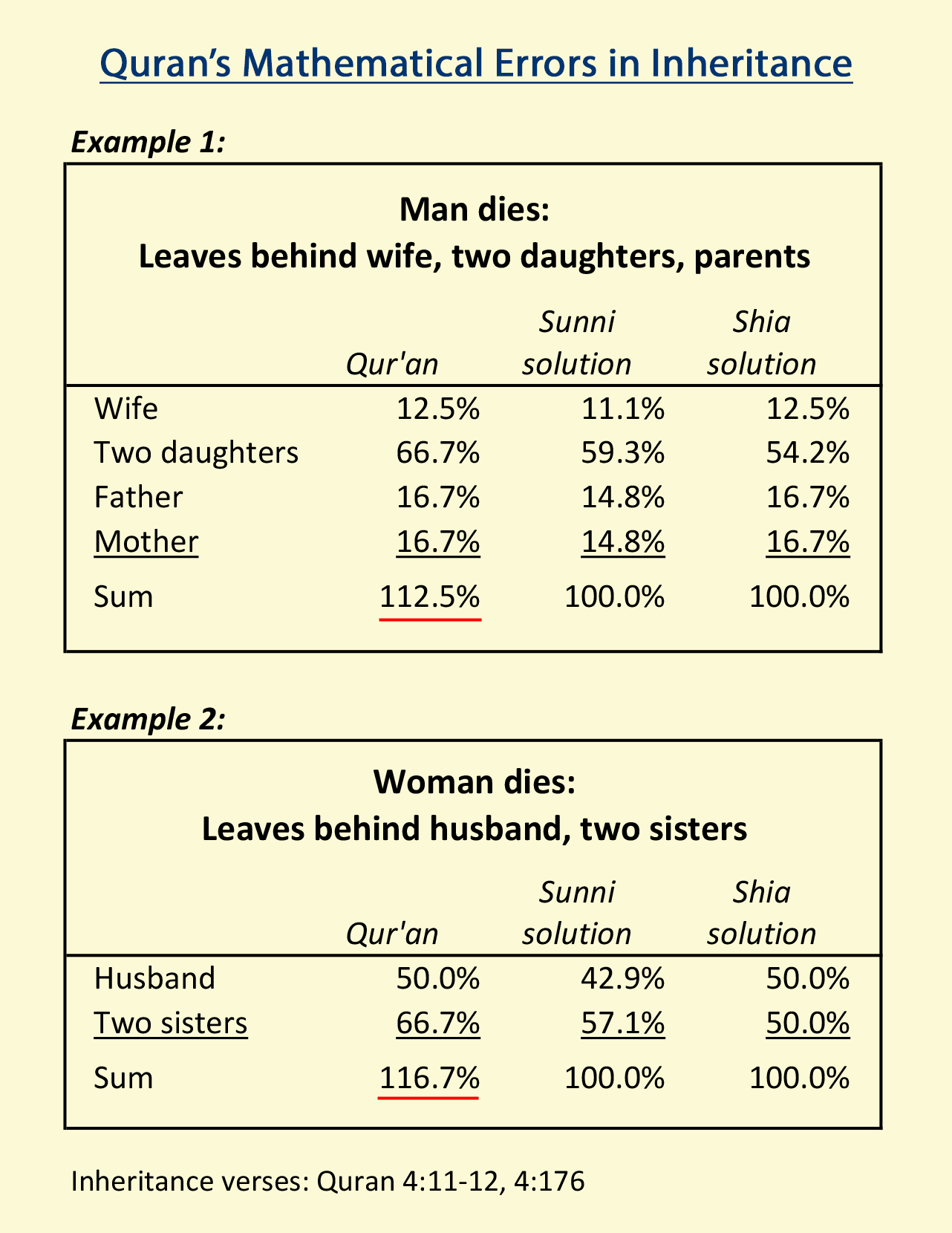
Unless that quote suggests that wife should get nothing, or at least that she gets what other relatives leave her. But most likely it's whether cognitive dissonance necessary for any dumbening religion or just a good illustration on how poor stupid people are at math and when assanine assumptions of god himself writing that prevents them from editing their laws and thus being unable to correct the mistakes they bend rules norms and reasons and even declare whole math a work of the devil.
Either way, looking up those verses I had evem more questions than answers, is it the perfect example of how religions can fuck up peoples and societies up? When you are taught to believe that something is infallable, and then you find a mistake in it, but you're forbidden to doubt the scripture, doesn't it mess up all your logic? Here's why religions insist on dialectics, and as I said earlier, dialectics is not to find the truth, it's to fool the audience. And the link I probably shared before:
This work is truly omnitenens. Why do I have to bring all this to one place? Each of these diversions divisions are supposed to be illustrations to something mentioned before.
Hesistant is not exactly resistant, but almost, but not only it isn't supported by other words, it's also not hesistant but hesitant. Good morning, Vietnam. Now it's time to get high.
I have two bugs I have to eliminate: I like to tell something I'm not sure of, some raw hypotheses. It's okay on the pages of this thing, but to tell it to my friend is to risk looking like not a very smart individual. Is it a protective mechanism? Not to show people how actually smart I am? Japanese tradition tells to show how smart you are at any opportunity, european tradition tells not to. Is it a christian influence on us? Maybe. But I also have to find sources for those proverbs before I publish them big. Another bug is asking what is something when I already know (and don't even have a second opinion, I just recognize it for the first time and want to be sure, I ask people to tell me again juat to know I recognized it right
ouija
рисовать ~ вырезать
врисовать ~ вырезать
(write ~ in, добавить)
(carve leads nowhere, and excise could be a cognate, but not in this sence)
sens is eve better tha sense which could be better as sence which it is, and it is better than meaning, because of connotation with being mean (ends justify the mean kind of think( thing)
as as the opposite of than
c as (
g as j as ) as cc as not even ᚲᚲ, but as ᛃ
trader traitor (предал пердал, обменял друга на деньги например) cognates, so what does it make for popularity of traiders? They are not very popular, because they make money not producing anything, but maybe they're working as blood cells of the financial system, making sure money are sent where success is. That way is more worthy than silly shopping. Traiders are smart, traitors are mean for they think that ends justify the means, but they are
длань далонь ладонь
там же: Moon shines = Pale Hecate reflects dim reflections.
So I wasn't wrong recognizing moon in three faces of the same goddess as Hecate in some early volume of this epos. In book version this part should be attached to where I mention Hecate first.
Hoo moo. 20:44 and I'm high. high high. and before that I argued with a dark ages denier in a are new dark ages possible. A better question is what should we do to prevent the distruction of the civilization. Autonomous capsules are the great solution: each of us should like a cultural chromosome contain all the civilization in his tiny apartment, ad preferably in many copies. To share copies of all the libraries with the friends.
I think I damaged my eyes a little by looking at the sun. or I hope these defects I just noticed are caused by me looking at the growing crescent while thinking if it goes from south to the north and how I still don't know the movement of the moon as good as I know the movement of the sun. Moon is more obscure knowledge, and probably good astronomers began with recognizing the movement of the moon.. Moon observations, and thus the word, observatories.
orie are orgie? as in аудитория auditorium observatorium observes, auditorium audis, listens.
orio is.. opero was my first association, but I know latin very poorly. but orio is probably that ero in opero. приделываю could me the translation of opero is op is up. I noticed maybe decased decades ago that latin r in -ere and such is a cognate of japanese -ru. And only territory doesn't allow japanese be considered related to indoeuropean. And strong chinese influence (the writing system and half of the lexics) but such "coincidences" as are kore sore to are here there and -i for adjectives in both japanese and actually all indoeuropeans in one way or the other (-y in english, -ij -ig in dutch, mut the most of all in neighbouring to japan russians' -и, -ы. Even though they are thought to be seen in the east not before several centuries ago, history pretty much ends at that time for these territories, and that is russian history, but there are probably chinese, korean, japanese history of the territories, and one ai checks them for consistencies to exclude the fake facts (there are many truisms speaking that winners write the history and history is a maid to ideology, and so on, history is not a science is a meme at least in russian culture of today and maybe ever, just not in all heads as it is today, actually. And me myself understood it maybe at 15 or so,
-И -N -S for plural suffixes. and en is on? and! -en is and. and и can be substituted with да, and -es is yes. да, да, да. этот и этот и этот. да = that. So some word were more synonyms than they are now. So all I have to do is to recognize the
la bials and le nguals
vials and needles.
via and need?
via off and need is in da?
is it poetry? poetry is magic, magic is invocation, meditation, seanse. siance, sciance, insides. insights.
-s is not only yes, but also si.
and what about oui? qui? oui. oui is we? oui is probably ы..
and french phonetic doesn't always read that -s, and actually they omit the whole -es but in plural verbs, not nouns, in verbs that ы is present: parlent.. I don't know french too well too, so I ask g-trans:
ils parlent de moi - here that -ent is heard as some french vowel, which could be ы in russian, but in russian that ы is a in verbs: говорит говорят. Если бы русские тоже отбрасывали бы -т, то было бы govori govoria, that -a to make it plural as in latin adjectives and nouns and pronouns too: ille is he, illae is they. and illi too, which is as it is in russian, and why is russian suffix for plurals is the same suffix for adjective? because adjectives are to what the word is added, of whose it is, the same way surnames have the same suffix
белый беллы. devil is whites peoples god? From the pointo of view of the jews, certainly. Asura and ashuras in neighbouring nations. Religions are open casi belli. -i is plural in the first case (I hope I didn' tbot.. botch the grammare, either way similar grammar is somewhere around the imperial languages. Languages are continuum, or they were continuum, but since quantized because of genocides and natural unification of the language of two or more speakers.
чёрный чёрта? для белых чёрные чертям своим поклоняются: индуистский пантеон для европейцев черти чертями. черты (абстрактное опонятияе косающееся характера, лица, узоров, письменностии, абстрактные всё понятия) не являются наверное по сути чем-то плохим, мы помним плохих и страшных черт изображения, но антропоморфизм абстрактных понятий - источник мисконцепций, но необходимый быть может для иллюстрации. Как бы ты изобразил достоинство? в любом смысле (это было в симпсонах)
белые и чёрные
баалы и черти?
блатные и черченные (крту. у.. кнутом? например кнутом, кто-то же имел белую чистую кожу, а кто-то на чёрной работе работал рабом.
baal as bella, but I have to know all the languages of the region to theoriz of this. Let's leave these slippy side.
Let's research something more solid.
And I noticed that i n s stand at some equal distance away from eachother:
i j k l m
n o p q r
s t u v.. and here if I went with uvw I would tet x as the next plural suffix, but nothing come to mind for x. Y on the other hand is exactly the russian plural suffix -ы and to my surprise it goes like
y z a b c
d e f g h
i..
and d is да, which is both yes and and. So let's arrange it in a more usual manner:
a b c d e
f g h i j
k l m n o
p q r s t and actually t is where it ended, and 20 letters make some sense I cannot catch now 20 fingers? but who would count toes in. 21 would make more sense as three aettir by 7, literally the most sacred numbers 3 and 7 multiplied.
But 365~366 doesn't divide into 21 nicely. So unless our planet rotated with another speed, these numbers don't work in calendars, even though 3 divides 366 into 133 meaningless pieces,
But then I see that 364 is divided by 7 into 52 weeks of the month. And I see that 364 to 366 is a nice approximations to something a little less than 365.25. Then question is was 133 used in some calendars when week was not 7 but 3 days.
if ворот ~ врат, ворог ~ враг, то сорок ~ срак. And together with pocococer of рососисия. such mines under the language of our emperial state, naturally hated by too many people within and without it, and many of them know the language and thus can fuck it up, and it was happening for centuries, so it's pretty much fucked up, so the best thing russians can do for their children is to desert russian for english. And I think that's exactly what I am doing here: a great russain writer writing in english, because everybody who can understand him know english anyway.
And back to that previous thing:
a b c d e
f g h i j
k l m n o
p q r s t
u w x y z
I placed w and replaced v, because u and v are hitorically the same letter, and w is always labial consonant, whcih makes it fit for vowel-labial-lingual thing, but then I see view and new and I see that it is also vowel sometimes. vieuu? no such word, but nieuw is new in dutch, so that u is from u there.
is view воочию? but the meaning of the word is somewhat different, but I trust my instinct tellimng me that w is eyws, and then v is eye, and y is actually u in greek, and u was v, so y is eye, aye?
and thus new = не виданый, не видел. новый. and view is in eyes.
so back to that new found 5*5 alphabet with M as the letter in the middle (was this structure what moved this letter from its place I wonder)
a b c d e
f g h i j
k l m n o
p q r s t
u w x y z
If the fourth column is and~yes~plural, then what are the other four? I don't see a thing so far.
It's good enough to find yes-and-plural morphemic cognatism today, so let's not overpush it. It will come when it comes.
The first column seems to be reflecting around the k: P to F and A to V, and the second column:
B to W and G to Q, and the third one: h to r and c to x (this one is the least of the three so far) i to s? d to y? this one is even worse! j to t and E to З is a little better, but probably also nah.
But let's assume this 5*5 alphabet is for real (why wouldn't it be, that' sprobably closes t to the way most of people write it.. but nope, it's 25% of them.
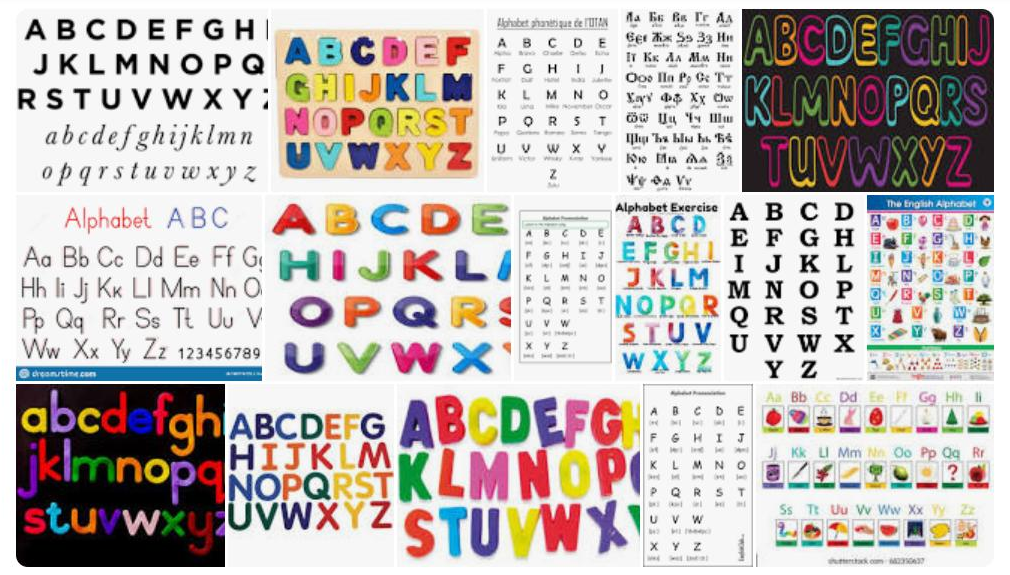
and one of those 25% is also very abcd:
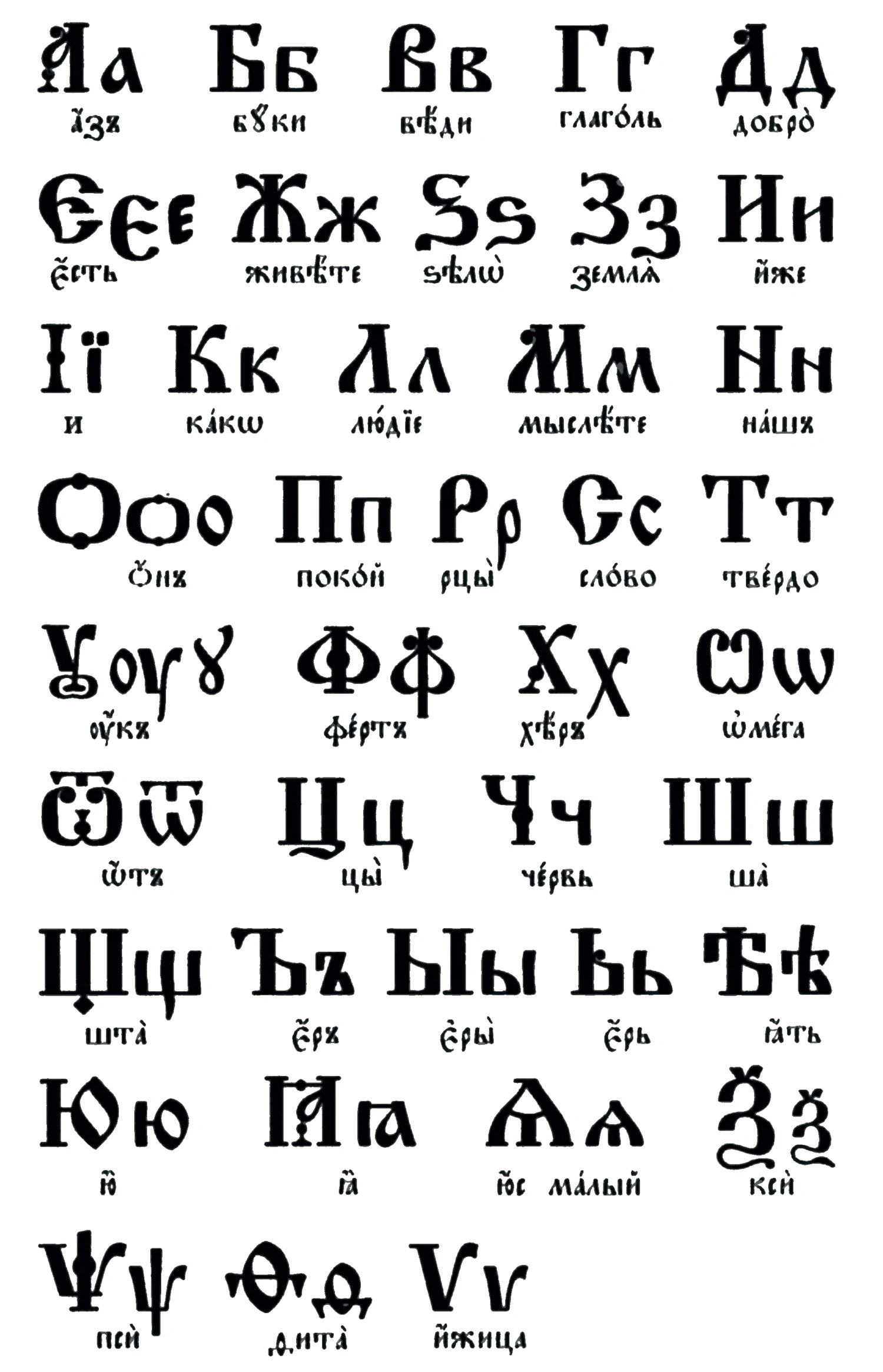
It seems to lack юс большой
.webp tells that it's a new image, I found it only in few places too. Was it me who influenced them to begin new line with a vowel or was in natural size of letters in old church slavonic (vonn is stench in russian, so it's a smear. We should rememe it as old-slavic. slavyan is the way we say this name colloquially. not slavon. We say dimon and anton and that's it. slavyan roman and that's it. I speak like I think, could be wrong) made me see it in the first place? I remember seeing it in russian абвгд.. in comparison to опрст, not the old slavic. slavic is you slavoni is (he) он? we're taught to call russian kyrillic, in a church tradition, new nation? christian (khristian as russian is transliterated today) is not too far phonetically from kyrillic, with all that kr in the beginning. is it cr of cure or of curse? cure is of curse? curse is cureless? is se having the meaning of no? is it how Ϻ is Σ?
Yeah, г[g] and с [s] as c and d reflects t.
and и began the following part the way у did the same. и and u
And шта breaks that symmetry, but they couldn't do better,
Горизонтально принадлежащий горизонтали
горизонталь принадлежащая горизонту (линия. ль как в линия? и я непроизвольно представляю её взмахом рукой, и правая рука идёт от центра вправо. и ль видится родственно слву лёжа, где жа глагольный суффикс: ляг, сядь, прыг, мог, мощь ляж. щ и ж когнаты?
ляж и ляг диалектные фарианты прочтения одного и того же звука, а значит это g.
and it may allow us find the cognates.. lag? медлить как лежать это интересно, но всё равно натянуто. порвётся, чего-то нехватает между этими частями. Lay is the cognate of russian lyag. they have g where brits have y, and in this russians are like dutch. normanes are we both? They're the western normans, we're the eastern ormans. So what if naming the orthodox point of view on languages the norman theory is a way to conceal the truth in the plain sight under some semitic pseudoscience, what if the truth is normans are the most recent superstrate, and it spans all across europe, including russians. We also have the same way of naming nations by our names: ruslans, dannes, svens, frantzs, germans, romans, but how many romans named roman are there? I'm not sure it's a roman name, but it is literally a name: romulus was the name. reem was the name. Are them the same name? Or are them some worse than volk etymology?
My thought is all over the place, I hope it's fun to unwind it like some normanic beasty drawings.
And I remembered thinking of runic alphbabet in the context of Д И Н С Ы (yes~and~plural_suffix)
ᚦᚾᚠᚵᚼ(or ᛡ)
ᛁᚴᛚᛘ(even though it looks like ᛉ)
ᚿᚮᚱᛦ(if R, or ᛣ if Q)
ᛋᛏᚢᛆᛒ
it's to my surprise that in this order al the differently written letters are at the end of their lines) but that could be a lucky coincidence.
and I trimmed the extra letters:
ᚦᚾᚠᚼ(or ᛡ)
ᛁᚴᛚᛘ(even though it looks like ᛉ)
ᚿᚮᚱᛦ(if R, or ᛣ if Q)
ᛋᛏᛆᛒ
t is finale, тупик. if v is the afterworld, it's a hopeful pray, but materialistically it is unlikely.
and ᚵ is just a dotted variant of another letter.
and now we can lay out the actual sequence:
ᛆᛒᚦᚾ
ᚠᚼ(or ᛡ)ᛁᚴ
ᛚᛘ(even though it looks like ᛉ)ᚿᚮ
ᚱᛦ(if R, or ᛣ if Q)ᛋᛏ
ᛆᛒᚦᚾ
ᚠᚼᛁᚴ
ᛚᛘᚿᚮ
ᚱᛦᛋᛏ
and it makes me wonder if they're the 16 of so called younger futharkh some arc? could be. foot arc, основопологающий завет? алфавит является основой всей остальной письменности, так что слово футарк никакого отношения к фонетическому прочтения алфавита не имеет, как я указывал в несколько сумбурной (потому что просто вырезанной из этого полотна) но по делу работе говорит об этом: https://www.academia.edu/40990515/Runes_are_mistransliterated_Alphabet_and_Ogham_is_the_origin_of_it
Но а похожая на ф это абсурд. Тем не менее, реальность: ᚨᚩᚪᚫᚬᚭᚯᚰ
И если ᚢ is the П they had instead of F of ᛒ, and some ᚩ is how ᛆ used to look in their font, and that's why authwork was read as futhork as a mocking or what? Russians didn't have F, is it for real? What does it tell? Батя instead of Father. B instead of F.
It's funny how ᛘ would be in the centre if it had a line at the left and bottom corner. And it's funny that the central letters tell ᚼᛁᛘᚿ, hymn.
Люди боятся нанопартиклс он зы face masks, but why do they thing those things to be pollutant? Because particles are pollutants by definition. What if they're to create a carcass around your lungs so they let the air in and carbon out while working as filters for something? See, this is insane. I am what? I just assume things and place it for everyone to see. But I warned my audience that these are drafts, many of these chapters never had a second thought. It is unusual to publish drafts because raw meat is rarely eaten, people prefer it cooked a little more. So keep on working, I suppose. But at least now peeing this sea (писать is to pee and to write, write reminds срать даже, что роднит помёт и помены, помяты, пометы. мятыми листами жопу вытирали? Животные не вытирают жоп. Хотя, откуда бы мне знать об этом, я совершенно не диковинный охотник. Я охочусь на буквы, слоги, слова, и такое подобное, всё необычайное, о чём книги принципиально не пишут. Свой собственный стиль. Свой собственный жанр. Как назовём? Citizen science? citi zen, cities allow to concentrate on complex questions, all universities are also in the cities (though that's not for sure, only in Russia.)
Jack Ripper R.I.P's
rapist, rapper. they are high testosteronese
Sit in seclusions of your own houses and have fun with yourself or with her who lives in a neighbouring capsule. I'm speaking of a wife, because the best capsule is the one which is there to stay. So you should just close doors with concrete if you break up and live as good neighbours with a history of relations.
Each person should be given sufficient size of living area for himself and enough of public spaces for extraverous neighbours. So they could sit there in companies of their friends and friends of their neighbous.
And suddenly I realize that my city has two churches. Why would you build two churches in the same city and with close proximity? Because people are too many to fit them in the previous church? But isn't church supposed to be built on a hill? Why did they build the second one closer to the river? Why is it red? Isn't there some canon to make them all white? Didn't they by any chance built it when they coloured white kremlin red? And they did: Строительство 1911—1914 годы
this is the one I've shown you the cross of. And now I see that it's купола (cupola is a word for what russians call флигель but in this case the word "domes" is more appropreate) are not golden but green, as if dollars became the new money? It does look satanic, and could be of the same project of spilling lots of russian blood? To destroy our will to victory (our honor, literally гонор, in russian it means something worse than pride, arrogant behaviour) by destroying our culture? They bat the shit out of us. We're the nigger of the world. Funny that those who love russia see it as a prince in shining armour staying true to whatever in the world of ... why do I need to speak of that, excuse me.
So this brick architecture could be a coincidence, but could be symbolic, as if the unexplained bloodspill would be justified by answering the question about why the church and the kremlin are red?
Here's the old church, as you can see the architecture is in different canon. Good thing is they are building white church with a colden dome golden dome. And here's a picture of the older

and it was built just thirty years before that red one В центральной части Челябинска на месте обветшавшей кладбищенской часовни в 1883 году был построен Свято-Симеоновский храм. so hardly it was because they had too many believers in the early twentieth century. Could they be trying to revive the interest to religion by being sold on what they were told was "old-russian style" as if nation appealed to it. Or it was a cynical extermination campaign? I go there right now. I will report on my return.
And I'm back and the most important piece of information I brought out of there is that I should give up weed. I thought this way: I am crazy, in russian they say кого господь наказать решил он того ума лишил, и судя по моему поведению меня господь вполне хотел бы наказать, и я иду такой и осознаю что я сумасшедший, ещё и потому что я это в слух говорю, и может даже во втором лице. И обычно в таких случаях я осознаю, что я просто накурен как скотина. И так же в этот раз. Я посреди ганджа-трипа почесал в белу церковь. Может красная позже рабтала, но в белой меня крестили, в белой были предыдущие ритуалы, когда я стоял крестился, молился мол да будет воля не мя а твоя, обошёл церковь по часовой, что скорей всего против современного канона, которого я естественно и знать не знаю, ведать не ведаю, и есть же интернет, и узрел я что я противосолонь по храму ходил, как вот эта картинка и заповедает, тогда что произошло? брата закрыли потому что бога отвернул отворотным? Да нет, эта картинка, сама архитектура храма такова, что понятие посолонь противосолонь поменялось. Люди текли рекой и невозможно было их восьмёркою пускать, чтоб посолонь вокруг храма ходили и посолонь внутри храма ходили. Но не вокруг ли алтаря мы должны водить хоровод? Но нас не пускают к алтарю, мы в храме крутиться оставлены.
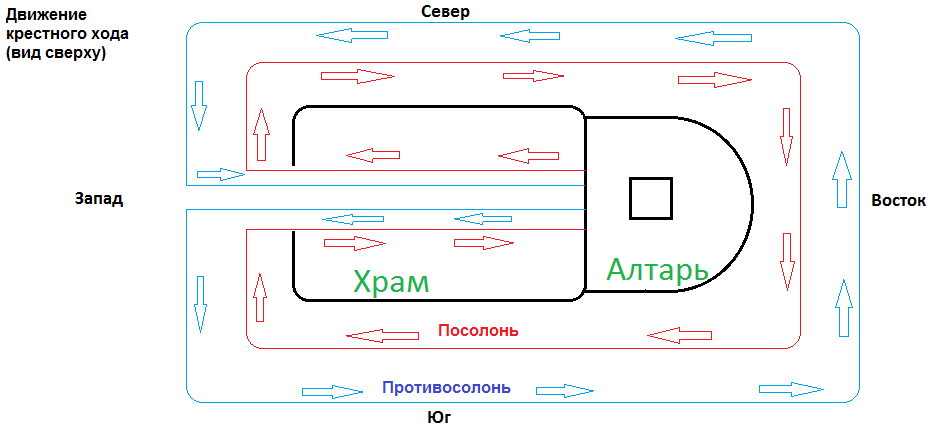
И это следует прикрепить к той части в первом томе, где я эту тему поднимаю. Пока-то всё свалено беспорядочно, но оно почти всё хорошее.
13 августа 1479 года Московский митрополит Геронтий освятил главный кафедральный храм Русской церкви — Успенский собор в Москве. Во время его освящения митрополит совершил крестный ход противосолонь. Об этом узнал великий князь Иван III, ему доложили об этом неизвестные люди. Князь остался этим недоволен и разгневан на митрополита. Начался спор между князем и митрополитом, для разрешения спора стали искать, как правильно совершать движение во время богослужения, в книгах. Но в них ничего не нашли. В защиту митрополита выступили архимандриты и игумены. Один игумен, оправдывая митрополита, говорил, что он видел совершения крестного хода противосолонь на горе Афон. Для поддержки своего мнения князь позвал архиепископа Ростовского Вассиана и архимандрита Чудова монастыря Геннадия. В противовес их мнению митрополит приводил тот факт, что диакон совершает каждение вокруг престола против солнца. Архиепископ и архимандрит в подтверждение своей точки зрения говорили следующее: «Солнце праведное — Христос, на смерть наступи и ад связа, и души свободи, и того ради, рече, исходят на Пасху, тоже прообразуют на Утрени». Князь остался при своём мнении и запретил митрополиту освящать вновь построенные храмы, которых было достаточно много в Москве. После нашествия Ахмата в 1480 году спор был возобновлён в 1481 году, 22 июля. На стороне великого князя было всего два человека: архиепископ Ростовский Иоасаф (Вассиан уже умер) и архимандрит Геннадий. Все остальные были на стороне митрополита. Князь упорно стоял на своём, из-за этого митрополит уехал в Симонов монастырь и объявил князю, что совсем оставит митрополичью кафедру, если князь не покорится. Князь смирился, послал своего сына к митрополиту с просьбой вернуться на свой престол. Митрополит не вернулся. Тогда князь сам поехал к митрополиту, объявил себя во всём виноватым, обещал слушаться митрополита во всём, что касается направления движения, то отдавал это в волю митрополита, как он прикажет и как это было в старину.[1]
К середине XVII века в Русской православной церкви установился всеобщий обычай совершать крестный ход уже не посолонь, как это было в XV веке, а противосолонь. Церковная реформа патриарха Никона унифицировала все обряды по греческому образцу, но нововведения были не приняты противниками реформы. В результате в русской Церкви совершают движение во время крестных ходов противосолонь, а старообрядцы совершают крестные ходы посолонь.
В Индии и странах распространения индуизма и буддизма принято обходить с ритуальной целью храмы посолонь — на санскрите это называется «дакшина» (от слова «дакша» («правый») — так как правая рука во время этого ритуала обращена к объекту поклонения (индуистский храм (мандир), буддийская ступа и т. д.) Слово «дакшина» имеет соответствие в латинском языке — «декстер» (dexter) — «правый». Практика эта зафиксирована в священных текстах, созданных ещё в древние времена.
So when I walked around the church counter-clockwise once, I realized myself cursed by goud (coursed, посланный, бог меня послал, бог на меня поклал, положил,
послал поклал когнаты? вернусь к этому.
And this image was taken from the page about that Митрополит Геронтий, and it probably depicts the way he rolled counter-clockwise and knyaz asking him wtf. But what is written under it? Notice how they draw В as a rectangle. It relates that letter to П, as P is related to F, and is modern В double that? was that rectangle v and modern В[v in russian] is w?
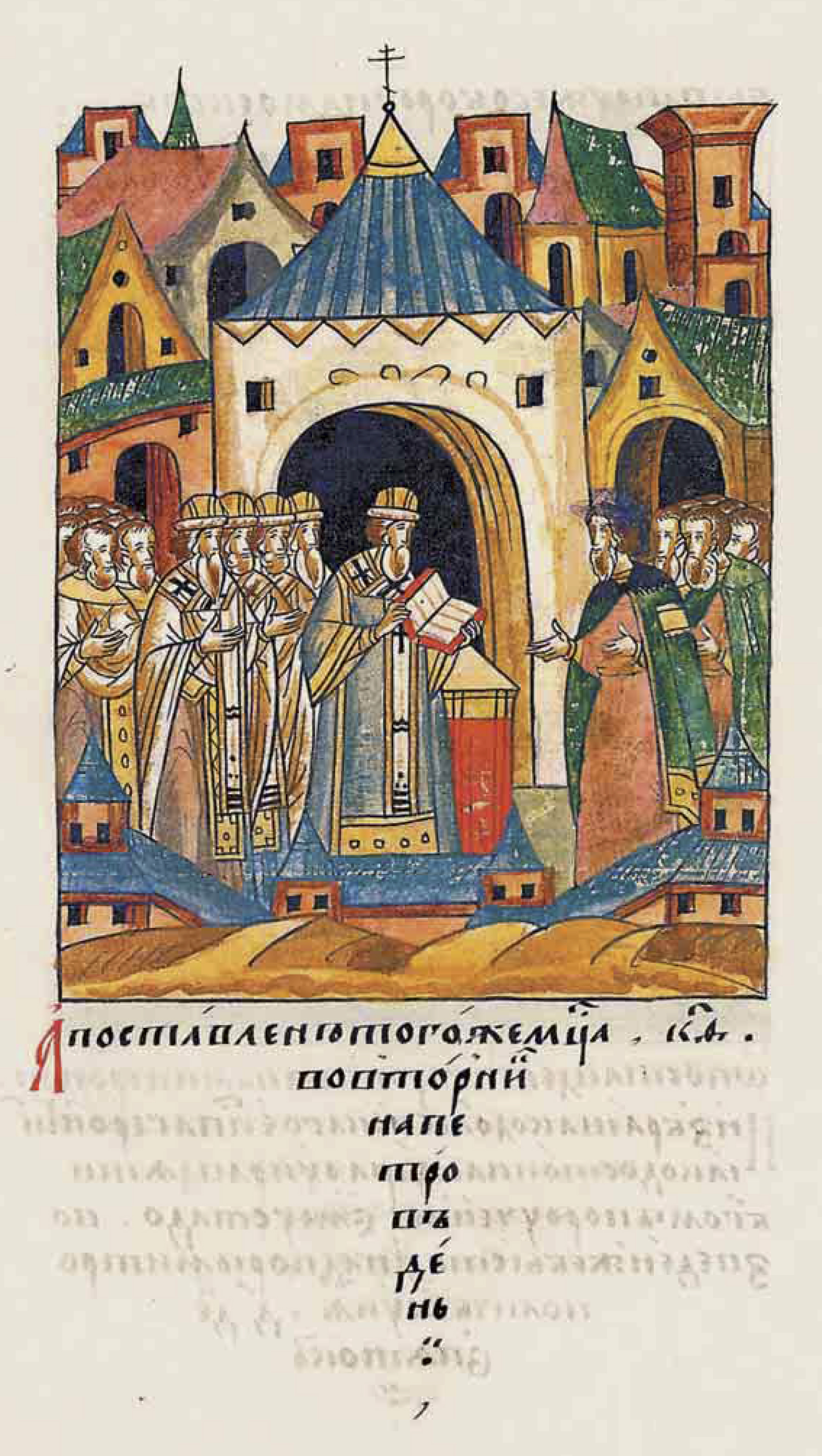
And though there it says Написанные им несколько грамот и посланий не имели успеха, так как не отличались ни глубиною мысли, ни красноречием. which makes him an obedient clerk or a wilful ruler, either way, not schizoid type I am. And back to that weed thing, I am schizoid as any true scientist, which makes it contraindicative to take psychotic drugs. So good bye this researh. I put it on hiatus. I build my capsules, because I was also given a solution to make a formwork out of a corrugated mesh.
Когда стоял возле храма (я пришёл около 20:00, и хотя солнце ещё не зашло, они уже два часа как отслужили всенощную) то столкнулся со сторожем, который криком "куда!" отвадил меня от церкви. Почему они не работают круглосуточно вообще? Оттого что бомжи будут тогда ночевать в храме? Бомжи их первые прихожане, самые униженные и обделённые и лишь когда церковь в злате погрязает она начинает презирать нищих вместо того чтоб призирать их. Ночевать в храме нехорошо наверное, но дать ночлег всем нуждающим это же церковь может. В монастырях? Там тоже всё не просто, наверное. Стоит ли исследовать всё это? Судя по контексту этого повествования, очень может статься что и предстоит.
И одновременно с этим столкновением звонила мама сказать что приземлилась и вместо того чтоб сказать Слава Богу, я что-то промычал. Это Бог проверял меня. Верую ли я в его существование, признаю ли обычаи которые он на земле установил. Не богоборец ли я израилитствующий.
Любая власть от бога то есть против бога? от него как отпала, но если была бы у него, была бы убогой, на бога бы полагалась бы, а не на полицейскую дубину.
Дубинам же трава показана (indicative) потому что сделает их мягче, тоньше, можно даже сказать что умней. Кто эти дубины - доминоиды, демоноиды. тёмные люди.
Светлые просветляют, тёмные подавляют, задавливают, тёмную устраивают, словно у пидоров у них всё через жопу (они могут добиться своего лишь устроив кому-нибудь жопу)
I look more at those слать и класть and I don't see them as cognates anymore.
Казённое ~ казнённое? словно в наказание, как указание, по указке, казнить наказывать.
казнь показательна
Курнул как лекарство от больной головы. Наверное Иисус занимает место в башке, которая hmm2 занимали, я предложил ему занимать эти области, чтоб игрушки меня не отвлекали, разлюбить компьютерные игры бессмысленные. Откуда у меня жажда убийства что нужно игрушками его утолять? удаляю. думаю, что в некоторых местах того стало иисус иисус иисус иисус росия вотка тоже видимо быть может. православие самодержавие народность заменилось упрощённым и конкретным иисус расия вотка. асия hfcbz расия даже звучит как рвань. расиия должна уйти. Как я это сделаю? Только переехав. Эти территории считаются россией всеми вокруг, и мне от этого языка скорей всего без жёсткого перепрограммирования? переформатирования даже не уйти. И иисус иисус может быть основой мышления как новый формат. Что бы он тогда подразумевал? интересовал играло в бошке не врифму даже а в место.
Я право же камлаю.
I drop this thing. I focus on capsules. It is reasonable and craved decission.
C'est tres symbolique que cette volume est numero 13 and the gitlab stopped accepting updates because of some new verification requirement I ignored. It's time to move on my own servers.
And I probably should edit this weird volume especially where I give too much personal information: a nobody wants to know, b nobody needs to know.
If jesus actually formatted my head (we'll see if I feel like playing games or not, hopefully not) not with his own name as a schoolboy would, but with french speech of a canadian candidate who first spoke in english and then repeated the same in french, so I could understand what he tells in french and that is the best way to study foreign languages I saw so far.
I want my teeth out, but now it's my head not my teeth that bothers me, but it's not for the first time, it happens once a year or so and then I do my best to enlarge the size of the skull to thus
High again thinking of who I love more god or satan and why do I think of guys when goddess is a more correct focus, because nature is more feminine than musculine me. Neutral is more feminine than male, and natura is female word in russia too. It gives birth, what else should I look at. Males are medium? Males are surroundings. The miracle is happening inside women.
E'erything comes to him who can wait.
I'm not in hurry. I'm not in haste.
hurry higher. How many words can I pull to a cognate pool? Probably all of them. Our brains are all of words,
hurry
спеши содержит speed в себе?
kill убил может быть это та же буква, которая начинает алфавит? к на востоке, б на западе, но почему лексика-то наоборот? Слово разделило значения, но слованой осталось разные статьи или разделились не одинаково? х.з. это всё может вообще быть совпадением.
бил мыл
убил умыл (чтоб затереть следы крови помыл себя и жертву? покойников обмывают перед полпжением во гроб (потому что обычай в три дня заставляет их держать труп в доме делает родственников заинтересованными в как можно спокойно проходящих процессах разложения.
Какая дичь. И люди это терпят. Демиург, что за дела, и это твоё лучшее творение? Позволь мы настроим, может оно и в самом деле не плохо, но не настроено. Мы ещё оценим по достоинству творение творца. Наше атеистическое поведение говорит о том, что мы находимся на уровне развития подростка (подостки разные, и мы все разные, но бросать вызов миру то черта подростков, и хотя я ещё её сохранил в 45 мост оф пипл бикам конформны и "конформными" в этом контексте могла быть грамматически неправильной конструкцией, потому что -ми могло появиться в словах первого лица: мы стали конфортнымы
конформизм -изм is и со мной?
изыми.. у меня была странная версия того, что -изм означает изымая изымай изымать: фашизм измымал моду, хотя он вводил новую моду, хьюго босс, коммун изм отменил мол общественные самоорганизации, унифицировав власть в стране. но сами-то они боролись за объединение всех людей? нет, они это лишь декларировали, а если хотели и вправду, то их методы такую силу противодействия создали (любое действие неизбежн создаёт, а здесь они ещё и по максимуму ужасно эту попытку провели, так что может этот уровень работает по другим законам? не ищи глупости где есть чей-то гадкий план.
Я избегаю денег? Почему я не скинулся на пульсчен если донатил Обри раньше? Решил не мешать кайф с удовольствием? чтоб иметь оба я сказал себе? напрасно, скорей всего я сам себе накозлил. Зачем этот литдыбр сдесь? ау. уа. мне 45? Как 15 это поворотный год. Может в тридцать был такой же разговор с самим собой, и очевидно что я выбрал не взрослеть. А если я не взрослый, то и женщина мне не полагается. Чтоб сохранить разум подростка надо всего лишь не пускать бабу в свою жизнь. чтоб не стать биороботом интересующимся лишь физиологическими потребностями?
Изначально двоичный был код или троичный?
Понятийный аппарат человека двоичен:
да/нет (не знаю это уже сложное предложение в тех понятиях. даже знаю сложно, словно)
до/от
до = во?
to = in?
от = оф
т.е. до того как согласные разделились на губные и язычные, и до того как русский разошёлся с английским люди играли лишь с гласной и согласной.
да = гласная? открытая! ад = нет? а носовая что следует из ом и ещё откуда-то, из он.
ноу тоже закрытая (у = w, согласная, вав, и тогда лов = ноу, и л = н и таким обрзом омн это формула аума.
и это три матери и это первая строка. м = в, н = д и они взаимозаменяемы если б=в, а б~д.
Т.е. до того, как мы открыли губные и язычные мы знали щелевые и смычные? палатализованные и непалатализованные.
н смычная
м щелевая
????
ну, это нестандартный взгляд, но лингвисота сама в своих терминах плавает в некоторых отношениях, так что не мне стесняться гуманитарщины, мочи, руби, вали всё на меня.
я демон и всегда им был. я, ни какой-то сам я. я здесь чтоб поднять ад. Но не затем чтоб ад затопил эту планету, а эта планета ад и есть быть может. Ад сюда подняли за меня и до меня. Тогда что демон в этом мире позабыл? Какие у меня цели? Жить в этом мире вечно, сделав его для этого более комфортным. И люди сопротивляются подобному изменению. Не хотят демонов в этом мире живущих быть может быть?
м н бубная и зычная язычные гласные? Как д и а, как н и и, как т и у? вот эта уже вообще шиза, но она время от времени появляется как черточка. надо собрать все её примеры воядино, сейчас не помню даже одного, где t & v were one, u in rna and t in dna is not an example, just a funny coincidence, unless biotech is lead by those who know what I try to discover. I don't just try, I do discover, piece by piece, some pieces are false (like imprints of the actual picture at the neighbouring areas, but sooner or later everything comes in its original form.
B & T в этом я полагаюс на легенду. Были именно что противоположностями? урацил как уриил в рнк, тимин как тимофей какой-нибудь в днк. на самом деле я ожидал увидеть четырёх архангелов и люцифера в A C G T U, но Т.. тьма? рнк избавляется от адовости днк (д значит дьявол, тот самый тефол, тимин - надо изучить свойства этого: если органические вещества названы в древности, то вполне может быть что генетику чловечество открыло в предыдущей цивилизации, до христианства. Но вики говорит, что урацил открыт в 1900 году. и это нашей эры.
Казённый казнённый, государственное имущество забрано у казнённых.
указ того же корня. казать, show. сказать say is of that word too. приказ. каз как князь? показательно, наказательно, назидательно, see dat! кажи ко see/
заказ? казать ~ сказать? потому что наказ показывает, что корень каз. и там тоже скорей всего словами, но видимо для глаз то были слова? каз к eyes?
кожа к
Lord Jesus Christ, Son of God, have mercy on me, the sinner.
And why cannot I miss the fact that the sinner sounds almost as thee sinner. Isn't it kinda arrogant? Isn't it sorta asking god to be peaceful blaiming him for sins.
Are we cursed by christ? Who we? Am I some demon? I just a moment ago daid I am. That moment of absolute honesty, though technically what is said there is a lie, but in another way it is also true, because I imagine myself a demon and I think I allowed demons into my soul. I like black metal, I sing punk rock, I am rather dark person, even though I seek knowledge and in this way I am a very illuminated person, but I'm not light at all, I'm very heavy. 88 odd.
I'm a a king of cringe and a doctor from awkward.
I got my education in awkward. in 0wkward in owl ward. в палате с совой (it's a fiction, but poetry)
akward a-guard, без охраны, без санитаров.
What is this world? I am indefinitely crazy. Why so? Because I allow me to do what others don't And it's a source of innovation.
1 i (or l? l is more like it, but i is vowel, which is a more alphabetic beginning.
2 c, d
3 З[z] E
4 ч, f
5 s
6 t? b? (both t and b rotate outside clockwise?
7 z
8 ф В
9 g
0 omega
and again 8 and 9 seem to be some extra, if 7 is the largest digit, then z ends the alphabet, 7 and z cognatism is more obvious because both may or may not have the dash across them as if mushrooms may have or may not have the skirt. And 7 is a greatly similar to how a depiction of mushroom would evolve.
Let's keep it alphabetic to see if it MAY fit our system well enough (then we check the oher possibilities)
I i (or aleph, or vav, or nun, or l and that is how l and n are cognate as in no and lo l is hebrew n? or visa versa?)
2 coursive form of it looks like a let it be a (but it may be d, b, was it when be and do were the same?)
3 if what we look at in the beginning of this sequence are vowels, then it's E, and if 2 is b~d, then З[z]
4 four demands 3 to be E. But could 4 be a reduced A? then 2 is not a? could there be two a's? not likely. 4 could be Δ, then 1234 are IБЗД all are voiced, as modern rassion has it. I looks closer to ᛆ the 1 and БЗ could be mirrored since then. See roman cursive.
5 as S? 6 as T? 7 as Z? This is not alphabetic. 5 as И 6 as b or مם and 7 as Z would be nice. But 5 is ה which is luckily a vowel and looks like い which is the second vowel of japanese, so first four lines of the latin alphbaet could be the 8 of some ancient octal numeral system I mentioned before.
(somewhere above I wrote and as ahd and the following line appeared)
add = and or and'ed (because and is et)
1 2 3 4
a b c d
5 6 7 8
e f г H
if 7 is not z but г, then.. and it is both some cognatic words have z or g interchangingly (z also plays as zh when a crown is on its head and g is also read as ж when palatalized. brits attach d at the front of it, french don't.
and what follows 8 is I and probably some other system is attached under that previous one.
I would expect IVXLCDM at the front of it, and here I see M which is in the I-line and also not its place, but here that holy placed is righteously occupied by V, the В[v] if you please.
IMKL.. was it this short? because L is N as I said before. was its orders not 1000-fold, but only 100-fold, as americans count in hundreds (which is unusual for russians who count in 1000. And I realize that russians ancestors could be the thousand-folders who conquered Rome and threw the more advanced hundred-folders away:
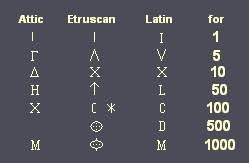
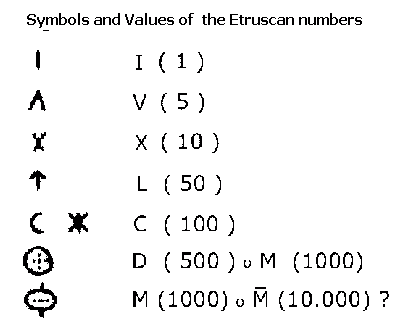
as ou can see, only etruscan IVXL (that sypothetic IMKL) are certain, others have different forms or meanings.
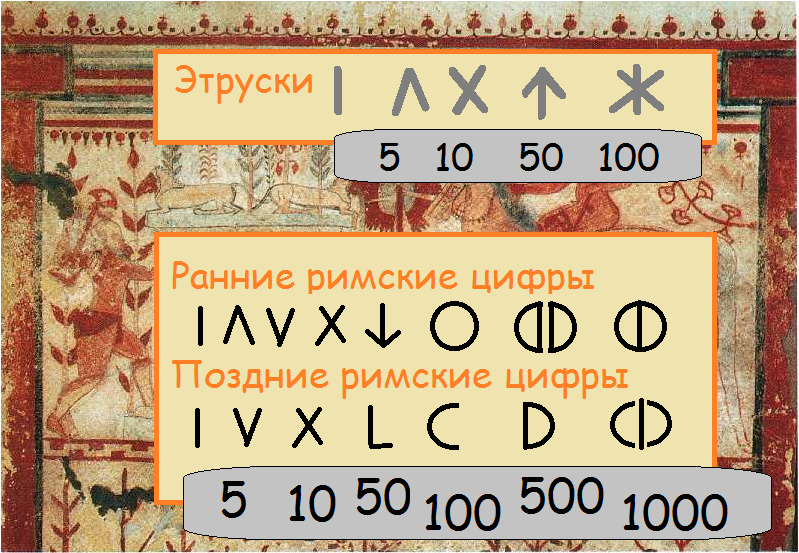
Here it can be seen, that Romans agreed with Etruscans about digits up to 50 and then they reformed their systems up to 1000 fold differently. I suspect these 1000's to be creative work of philologists, but I certainly could be proven wrong on that one.
So if they had 1 4 8 32 as digits, how did that line up in the next order, when they as I say made a reform of it to lay out dirctly into 365 . So that 1 4 8 32 adding up to 45 doesn't make much sense.
idk makes d no (turns do into no. Д as dashed out Л could stand for not no. Double negation making confirmation. Да, duh.
So here's another guess: I V X L used to stand for something else, and I supposed that for 1 5 10 50 for not only does it look the most natural variant for me (just the most taught today maybe that could be the reason why they could go from 365 to 666, but then I think how people could see the word of objects, and I came to some interesting sequence of 1 7 19 37 where 7 is for days in the week and 19 for some lunar golden number, but 37 is centered hexagonal number, which these are, and many other pretty interesting things, but it's not in the calendar things. Either way, such sequence would add up to 64
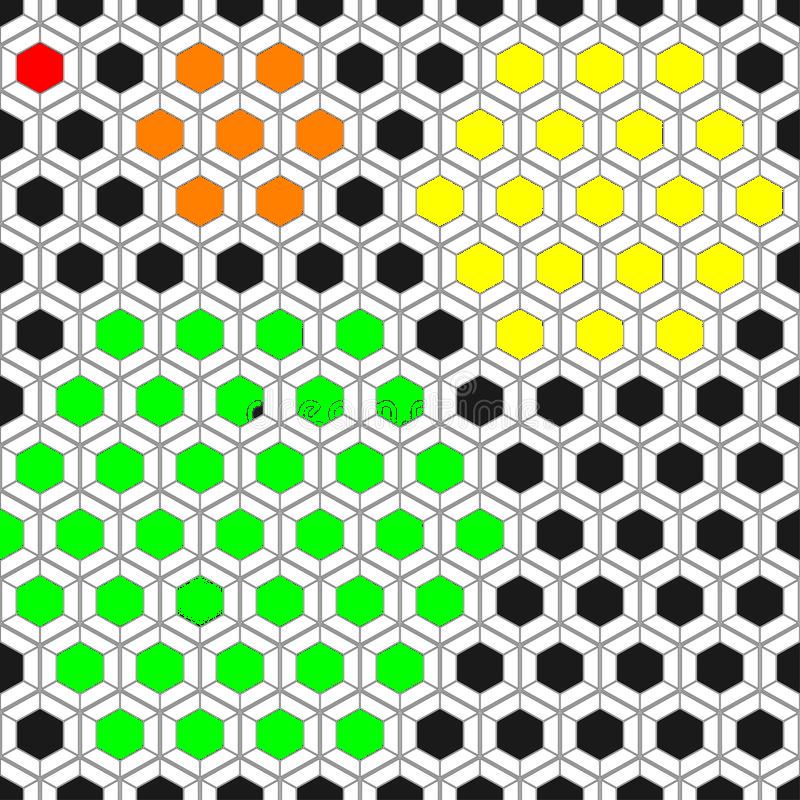
and because such numbers are called figurate numbers and are told to be worked with by pythagoreans, I wonder is Pythagoras pi and figures?
So what am I doing here? I am high and drifted away from the safe and fishy waters I was in at the beginnning of the evening.
A B C D
1 2 3 4
E F G H
5 6 7 8
I M K L
1 5 10 50 for example
and? and I have no mooneral systems to add.
or what could I M K L be if they made a system with the previous 8?
9 10 11 12?
O P S T
13 14 15 16
Could these 16 be the younger futhark? 16 is 16, iy oulf br it could be anything.
But what about the proof base. ai will be my proof base: checking these texts for consistencies and inconsistencies, it will alighn some hypotheses and will through in trash the others.
polýMATHY tells that vulgus and volk are not cognates, even though they mean the same and sound almost the same: somewhere in the beginning of https://www.youtube.com/watch?v=HgRxuPzdInI
And I understand where it's coming from: standard etymological pathways trace them to some different forms which as if approached eachother later by a (((coin)ci)dence) but I kinda doubt it, I think that's the same divide et empera game. Etymology is not a thing, because humanities are not even science. Mnemonic tools are what actually matters, and volk~vulgus are definitely such a tool.
Возродиться возратиться
text = tags'ed
tag ~ tick
I want to pull people with some negative stuff to switch on a positive vibe going from negative to positive. as S goes from counter-clockwise to clockwise. S as in Super. U works the same (superman is ubermensch, thugh what makes the meaning is not S (s- could be -est, the most, g- ) uber and unter b or nt. b as best beginning and nt as end
be as ab
b as be
and
nt as end
as
a
nt as not
demon и безумен are calques
de like dis like без
m like ум (m is in the centre of pie roots men and mysl. I read about them, I certainly have no idea if it's true, I was always supposed to take it on faith unless I actually do my own research into that branch, and then I can certainly even find some other work about it, telling the opposite, and again I wouldn't now if that was true, only if their argumentation is consistent, but I noticed that in humanities it's almost always not.
-on and -ен are probably the same thing.
умён ~ mon? man. Thus demon is un-man. Нелюдь is quite a synonym.
For S it doesn't matter which way you draw it, it will always turn counter-clockwise into the clockwise,
and that's another example of how russian script is unlucky. So I thought about how would it look if not only would we return И into H and H into N, but also if russian С would become S (also notice that drawn top to bottom as it usually is, С is counter-clockwise. And that coursive form of S returns greek σ which is ς when it's finale, which does remind russian с.
u f x c ch sh sch (and thus ъыьэюя so much different from how they have it in the other alphabets is a later and ignorant edition, and ch sh sch are the digraphs and trigraphs we needed to use latin script, but its order is not exactly latin. uvxz is it? it is!
z is ц! the voiceless? yeah! is f v? e v h z (where h is voiced ה?)
a b g d
e v j z (ё is eu)
i y k l m n (and because y is a form of v it explains the position of й there)
o p r s t
u f x c ch sh sch
y is both й and ы the way they have it in english.
' is a way to denote both ъ and ь (while palatalizing ь is well traditionally go in doubling of the letter)
e is both е and э
yu is ю
ya is я
or y can be only ы (especially because y is ij and ы is of two parts too, and thus ה the е cannot be too far, and thus e~i also because of japanese い.
efgh
ijklmn
hm.. but the easiest way is to declare i-line a relative novelty.
novelty from the times when a b g d e v x z were all there were, hard and soft parts, or maybe, because of the way norsk ᛆᛒᚦ are, a b g e v z. and further into pentatonic scale that could be abcez with no abc symmetry, with abc being only the seed or root of such a symmetry when they decided to reflect the halves with the v.
abcex, where x is read as z as initial x is actually read.
absex? abhex? abc'es!!!
abk ivz
abacus must be in the basis of abc, because of what it is, because of how it sounds.
a-ba-c-us is literally abc (-us is male suffix)
and if it a-ba-ac-us which is supported by that that syllable is stressed (or long in latin philology) it indicates that ba is (the open) female syllable and ac is (the closed) male syllable, which is supported by b being la-bial and c being l'ngual.
Is lingual related to nagual? -al is definitely symilar. I have to find all the symilarities between languages (the likes of are kore sore ~ are here sore, -но ~ -の, -й ~ -い)
And chances are such similarity between distant languages will be enough a corpus of information for ai to draw the diagram of protolanguage, if those pieces are enough to build an artificial language, they could be not too far from the actual protolanguage.
м-ожно остор-ожно
м-ожешь стор-ожишь
м-огёшь стер-егёшь
о and е are разделительные гласные в русском, так может и здесь тоже?
м-о-гёшь стер-е-гёшь
м-о-жно остор-о-жно
о- как очень?
сторожно ~ страшно?
остроги очень строги, острог очень строг.
существительные это краткие прилагательные?
само слово существительное не является кратким (как и прилагательное)
both are names, the third name is числительное.
один един единый он? его? ego? ani?
два двое твоё? твои?
три трое
четвера катвара quattra? qua-tre че-търи
пять пядь, literally a noun. but what adjective is it? пятый is the long form of it. пять is the short form of пятый if we look at them as at adjectives.
четыре краткая форма слова четвёртый? И четвёртый и четыре числительные, но порядковая форма выглядит как прилагательная, а количественная как существительное.
Reading vol.4 I stumbled across frater and brother exposing f and b as invariants, and then I add to it father being pater and these two words place b f p as the same letter. And polish vader adds the v to it.
And why do these male words use labial letters? Is that some gay christian shit to distort the M~D of mommy~daddy thing?
Only vader is not polish, it's dutch. The band is polish though. And I just noticed how it's logo is alike to Morbid Angel's and while looking up who influenced who, I found this:
Morbid Angel’s albums are alphabetically named – Altars of Madness, Blessed are the Sick, Covenant, Domination, Entangled in Chaos, Formulas Fatal to the Flesh, Gateways to Annihilation, Heretic, Illud Divinum Insanus, Juvenilia and Kingdoms Disdained.
And though Vader appeared first, Morbid Angel's debut came out three years before Vader's and the answer could be rather simple: they both were issued by Earache, so they probably shared the artist.
And to my surprise even yandex noticed this resemblance:
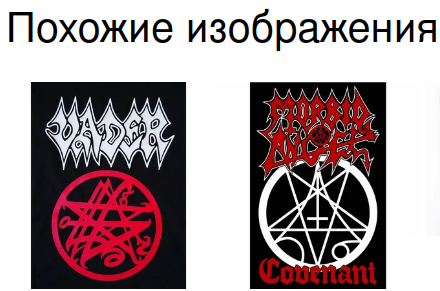
So why this offtopic is in here?
Weed wears out, I guess.
It didn't strike me deep enough tonight in the first place, probably because the weed is not very strong and also because I became trading, and though I shouldn't watch the prices too closely, it still demands a place in my head and thus distracts me from more holy questions.
I should be a hermit, a secluded enlightenend entity.
And why am I listening to these satanic tunes?
I am a demon, so I am natural me. Not angel? Nope. A weird fruit. Metalheads are drunkards. Dave Vincent sings some country about drinking. So is weed the opposite? Cannibal Corpse smoke weed. My mind is drifting where it found itself In a sea of hell. So I should travel to the hills and шпили shpili spili? I h
What if all what's hear is spelling. Hear and here are cognates. kore ko as in me (eyes, о'чи (очень чисты, glass, глаз (glass clean clear) class
hear and here are just spelleddifferently. So what difference does this ea to e-e defference make?
bear bere.. bear бери? are they the same? cognatic? Don't I see the semantic difference between here and hear. there sea. sore. so- is see? so is the? sou desu. sa = so.
хадж is ход. как в слове крёстный ход. Могу я назвать словосочетание словом? слова сочетание же называется словом. но бзе пробелов по немецкому лекалу спеллить шпилить.
and I think I found the root of the tradition to водить крёстный ход против-часовой. Означает ли это, что в 1666 русская церковь перешла из индуистской традиции в иудаистскую? Уверен, что у них процессии как у арабов. Сейчас постараюсь найти иудаистские процессии, покамест зацените хадж:
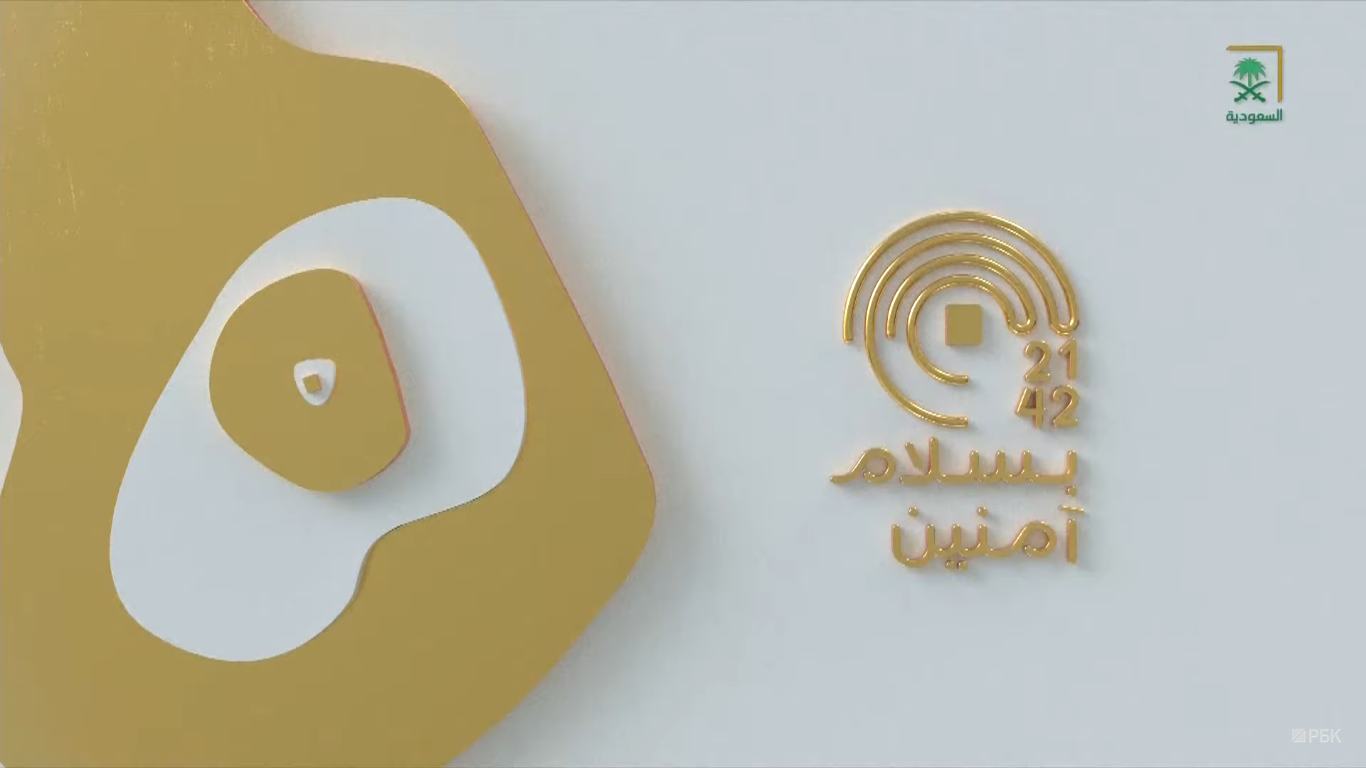
I don't know what the digits mean, but I suggest the curves to be denoting the procession around kaaba, you may look into the video of the process by clicking that image, I hope it's alive, if not just search хадж or hadj or hajj or hadji or haj.
е = ё
е = и because of е ж ~ i j (k & з could be both forms of c. thus j ~ b? ж ~ b? h ~ b! the rest is explained by ᚼ. being both h, j, and h is also being и just as i~j and that is still a mistery. And hopefully in my lifetime I will eventually come to the answer. So far it's not an answer but mostly merely observations.
Interesting is how in arabic шахада is свидетельство, а ашхаду is я свидетельствую как начало этой шахады. G-trans recognizes اسهد as ascetic, and أَشْهَدُ as witness, and أَشْهَدُ اسهد as I bear witness.
Is witness whiteness in a way?
But I was looking for the etymology of this word: حَجّ, pilgrimage. حح is recognized as hi, привет. which is I don't know if true or not, hi is translated only as أهلا, which is read as ahlan, but only ahla is written, and whether it's a cognate of hello or a cognate of hellow with W being a congate form of N
حَجّ حح as hajj pilgrimage
"حَجّ, pilgrimage. حح is" as паломничество паломничество. чч это
And here's the etymology I found at wiktionary: Classical Syriac ܚܳܓ (ḥāgg, “to go around”)
and there are also other etymologies, law, be right, and what if they also go right, but they count the right looking at the holy place, not out of it.
حق haq is right (true)
and that siriac script caught my attention:
ܐ
ܒ
ܓ ܕ
ܗ ܘ ܙ ܚ ܛ
ܝ (ܟ)ܟܟ ܠ (ܡ)ܡܡ (ܢ)ܢܢ ܣ
ܥ ܦ ܨ ܩ ܪ ܫ ܬ
it follows the same canon hebrew does, only here ܦ and ܨ don't have sofit forms.
ܢܢ reminds N it stands for and ܠ reminds L, and I wonder if K and M given in digraphs by mistake, but I'm not a specialist, so I leave it as I took it, but then I can watch some other sources:
ܗ ܘ ܙ ܚ ܛ
ܝ (ܟ)ܟܟ ܠ (ܡ)ܡܡ (ܢ)ܢܢ ܣ
ܥ ܦ ܨ ܩ ܪ ܫ ܬ
it follows the same canon hebrew does, only here ܦ and ܨ don't have sofit forms.
ܢܢ reminds N it stands for and ܠ reminds L, and I wonder if K and M given in digraphs by mistake, but I'm not a specialist, so I leave it as I took it, but then I can watch some other sources:
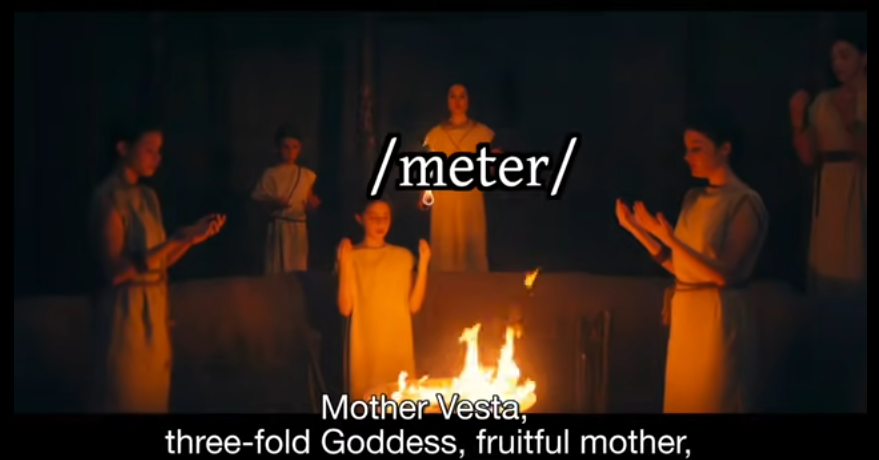
That screenshot is clickable and there he also says that meridian is of medi dias or something like that, the midday, which means south, because that's where sun is in the noon.
Микитко or Virginia Beowulf told me that moscow is the old form of how russians called moskva before, and then it rhymes it with pskow. As if pskov was of pyosikov and moscow was of musek pusek, dogs and cats. псы и пусы пса.. пуса значит пса. котов называли по тому кто их ел или наоборот псов называли псами потому что их кормили пусями? козёл косил (куса трава в японском) баран борется?
ков и cow are the same or a coincidence? in the context of рус ~ трус and slavs ~ slaves, sklavy, сявы, сява is etalian way to say слава. l~j
a b c d e f g h i j
k
u t s r q p o n m l
Is i ~ m on some level? if M is double Λ than yes, i is double j
n~m as h~i (also n and h look so much alike in two forms Н is russain N and h reminds n.
g and o globe and it's graphical representation. orb and globe? or amy I pulling coincidences tigether. but even then I collect interesting coincidences (but we don't know for sure what they are until we try to hold it all together in one hand. In one head I was supposed to sai. In one ai head.
Indo european languages (or maybe all languages in general) are syllabic at least originally, each consonant is supposed to have a vowel. в was въ and к used to be къ and both even today have forms ко и во.
от нестандартная для силлобарий форма, а значит.. or wasn't it also отъ. Т.е. не инвертированная до, (до used to be ут!) но до (to, t=d!) с приставкой отлицания. un- (a-)
in also has that ã- in front of some no? "не нету" т.е. есть? нету: но не совсем нету: внутри)
in = in-? ã-? (if it's in it's not seen, but that new thought of our languages using some syllabaries before we used alphabet demands in to be broken into i and nо and isn't i ã?
на = ноу? what difference do vowels make? I will ponder upon it when I stumble upon it.
I'm not sure that Vesta is the three-fold mother, I think the same way they failed at archaic latin, they (in the series) could have made it by lack of competence or excess of scheming, either way the same features could lead to the misinformation of this theosophic account: if Vesta is feritlity goddess, it's Earth and thus not a moon which weaves destiny and you can calculate its returns, thus demistifying the cult. Hecate and Hestia are different species. Cat and Stia? what could stia be? земля змея хестия ~ бестия.
геката же бегата
Is moon full of gold according to ancient competence? If gods made it why of anything else it would be. If it's a goddess itself or of the goddess herself, as if she lives there. Spheric home. cathouse.
Either way, vestals are nuns under a strongarm of male priest. They are patrician, but can be whipped or buried alive in case of misbehaving, so it was not some authentic female cult, but a completely patriarchal institution.
A great example of rainbow patterns you all know, the soap bubbles:
(mirror)
Loyal has a little different meanings in russian and english. Bu that loy in there is probably law, not only roi, but that is how these different words are obviously cognatic or at least potentially mnemonic.
loyal legal lawyer regal royal rule liberal light right право Some better path lead me to right the previous time. плавно правно? нет, не этот. славный? следи среди. love is law! but I came to right there from some other word. something similar to liberal, liberty, some other wrod.
но человек лояльный в любом случае не тяжелый. А для врагов господина если он лоялен сюзерену, если она в английском значении лоялен? (у русских видимо довольствовались терпимостью, терпильством, лыбой на ебале)
loyal любила.. some day will stumble across that ling from law to right rei'ed? (loyal royal roi rei rei'ed reigned) could be, but again that one was something else. (but that example in the brackets is close, very close)
Diana[a] is a goddess in Roman and Hellenistic religion, primarily considered a patroness of the countryside, hunters, crossroads, and the Moon. She is equated with the Greek goddess Artemis, and absorbed much of Artemis' mythology early in Roman history, including a birth on the island of Delos to parents Jupiter and Latona, and a twin brother, Apollo,[2] though she had an independent origin in Italy.
Diana by Renato Torres (Portalegre), is one of the best and most representative tapestries of the European and Portuguese tapestries of the 20th century.
Diana is considered a virgin goddess and protector of childbirth. Historically, Diana made up a triad with two other Roman deities: Egeria the water nymph, her servant and assistant midwife; and Virbius, the woodland god.[3]
Diana is revered in modern neopagan religions including Roman neopaganism, Stregheria, and Wicca. From the medieval to the modern period, as folklore attached to her developed and was eventually adapted into neopagan religions, the mythology surrounding Diana grew to include a consort (Lucifer) and daughter (Aradia), figures sometimes recognized by modern traditions.[4] In the ancient, medieval, and modern periods, Diana has been considered a triple deity, merged with a goddess of the moon (Luna/Selene) and the underworld (usually Hecate).[5][6]
Diana can be translated as goddess.
Uni is the ancient goddess of marriage, fertility, family, and women in Etruscan religion and myth, and the patron goddess of Perugia. She is identified as the Etruscan equivalent of Juno in Roman mythology, and Hera in Greek mythology.[1] As the supreme goddess of the Etruscan pantheon, she is part of the Etruscan trinity, an original precursor to the Capitoline Triad,[2] made up of her husband Tinia, the god of the sky, and daughter Menrva, the goddess of wisdom.
So what we see here is the matriarchal matrilineality, where the husband is auxilary, complementary.
And why would it change in the roman times? Because of it patriarchal nature: Juno and Jupiter are consorts, but Minerva is his daughter, but not hers.
Язык формирует культуру и переводчики священнодеи языка, и толь культура им мозги стенает или они культуру гнут своим лекалом? И то и это может быть причиной того что Frailty, thy name is woman! became О женщины, вам имя вероломство в пастернаке, а той О женщины, ничтожества вам имя, а это Чехов. А ритм.. ритм тоже не таков как у Шекспира, хотя что после в ритме с Вильямом бежит.
у could be ין written from left to right with meaning of in where у is в.
Могло установление вращения в одну сторону на западе и в другую на востоке вызывать какие-нибудь вихревые процессы? Могло это быть попыткой обратить хаотичное движение людей в более закономерные процессы, таким образом обрести разность потенциалов между странами, иначе называемым напряжением. И это же слово используется для названия межнациональных конфликтов.
But break, my heart; for I must hold my tongue.
Here it probably witnessed that brakes are cognates of breaks, but what technological process was used is yet to figure out, for I hope stopped they not by breaking animal which carried.
When car breaks, it brakes. Ломай значит тормази на русском молодёжном слынге слэнге
слынг .. слэнг слышен? гн где ты это услышал? услышал где-то повторяет. или слова боле родственно? ведь слэнг касается лишь лексики обычно, редкие грамматические вольности вроде за жизнь в значении о жизни не так часты, ак лексичеси лексический вол вокабуляк вокабуляр.
Obviously horse stopped when it broke something. Если бы лошади были поспокойней, то при повреждённых конечностях их бы лечили: а не пристреливали. Возможно сейчас их чинят, потому что наркоз доступнее, но получить копытом по лбу скорей всего не хочет блин никто.
acrostic - first letters of a poem make a word
telestich - last letters of a poem make a word
And I suspect those acro and tele to be the names of A and T
Ancient Greek τέλος (télos, “end”)
but beginning is not ἄκρο, but αρχή, which actually is good enough.
ёклмн
ёпрст
are two russian interjections of unclear semantics or origins
ieaou could be that very ё and other raws could be voiced and voiceless counterparts (with к & р breaking this structure the way these very letters do it to the whole set) where к starts the set the way it is in the eastern writing systems and where it is in one claster with кх, г, гх, so could it be г? g the j?
It's hard to say, because it's purely hypothetical and because I haven't been high for days. so long.
My father is marxist (he was brainwashed by soviet government into a communist, he has some powerful brains (his university friends tell he understood math and physics the best of them all and he should have become an educator, he would make some mighty money, but he probably is an autist (my mom is not autistic at all, she's rather powerful person in the society, so I took my asperger from him (I'm self diagnosed, so chances are I exaggerate it, but people recognize me as an autist (at least too two openly said it) so probably my self-diagnosis is correct. Either way his powerful brain was damaged by the ideologic takeover, and it switches into a retard mode when it comes to politics, and he doesn't understand economics at all.
And he said "энгельс сказал, что опыт критерий истины" и я бы согласился, если бы эксперимент имелся в виду, но он использует это слово как жизненный опыт, что делает это слово абсурдной чепухой, которой как кучей кирпичей забиты бошки у идеологически промытых, хотя заражённых гораздо лучше отражает суть. Я снова перешёл на русский, когда русским был контекст. прошу прощения.
And he said "engels said experience is the criterion of the truth" when I knew "practice is the criterion of the truth" and I didn't recognize it this time, saying that russian word опыт he used to translate what I here translate as practice, though I also saw praxis and I yet have to find the german version, I only found that it's marx, but in what work.. I'm too high to dig into that pile of rubbish, so let's pass it on for now. Either way, what I was about to tell is how russian work опыт can be translated as both experience and experiment. And the word experience can stand for both single event you've experienced or for the whole sum of events you've experienced. This latter paradox is in both russian and english. And the former one is not to farr phonetically in english pair of experiment and experience too. And it demands me to test the pair of -ment and -ence in other words.
-ment ~ -ence
patience patiment? nah.
parliament parliaence? nah.
presence presment? nah.
comment comence? commence, to begin. Oh if every comment was a beginning of something awesom!
so I looked into if somebody pondered on it too:
Words like excitement, performance and difference have suffixes that turn verbs and adjectives into nouns. Listen to Finn and Catherine talk about the suffixes -ment, -ence and -ance in this 6 Minute Vocabulary.
and in examples like excitement and performance I see their similarity. mance is similar to ment, but I see that ence can be attached by itself. And I hypothesize: can it be reduced from mence? patimence? and it rings with time, which is patience is all about. Are presence attendance experience presmence attendments experiments? Experiments are the closest of the three, which is where we found it, but is it synonymous? almost, some stylistic difference is all. attendment nah, this road doesn't seem to lead anywhere, other than that -ment -ence -tion -sion make nouns out of verbs, but then what is the verb in patience? pati- of patio (suffer allow endure permit bear be passive undergo tolerate submit abide brook experience let put up with meet go leave) which makes this transition not english, but actually latin. And if I knew languages latin've grown on, I'd say it more precise. But then who needs it.
And why do I leave this mindflow here? Because it's a rather scientific mindflow, and new generations of scientists may find these drafts entertaining the way I wanted to read drafts of the scientists to see how exactly did they come to their ideas, and I never found them when I liked to read, it was before the internets as we know them. Like how did knorozov came to his decypherment? I tried to read him, but it was all water I drowned in before he reached the land. So even though his work is in the very neighbouring field, I still have to take his word on faith, as I accuse many other scietists to do.
From now on I will use experiment for experience in the meaning of the singular event.
And experience will be seen as experiments with the silent m.
When ‘m’ is before ‘n’ at the beginning of a word, it is always silent.
mneme(n), mnemic(adj), mnemonic(n, adj), mnemonical(adj), mnemonically(adv), mnemonics(n), mnemonist(n), Mnemosyne(n), mnemotechnic(adj), mnemotechnically(adv), mnemotechnist(n), Mniaceae(n).
Observation: ‘mn’ makes /n/ sound.
and by accident or ocasion or some other thing after m in ment and mence comes en.
m~e? m reflects i in k-symmetry, and m is above s, which is и in plural suffixes and y which is also i.
So new view, ence is mnce? or what is it? i = m?? I = me.
interesting. М = И = N
ijklmn is the claster? it doesn't stop at l? l~n lo~no! мы нас (nos = мы in latin, but us in portugese, where also nos=nas=no=на. нас = на? нам нас много мы сверху понесём, на нас. толпа товарищей может большие вещи наскать. таскать. и я представил толпу друзей, способных поднять целую стеллу? если на каждого придётся по столбцу вверх. И я представил как много было у такого способа переноски жертв, но это могло объяснить идею идти в ногу. Танк массой 40 тонн тысяча крепких парней смогут поднять. Теперь давай посмотрим сколько человек поместится под танк и под стеллу.. но т-40 весит всего 5.5 тонн, так что давай посмотрим поместится ли 100 здоровяков под такой: 4110*2330=9576300 square millimeters, 9.6 square metres, but how many men can get in the square metre vertically? 450 millimetres wide would be enough per man, roughly, 225 millimetres would be enough if they were standing right next to eachnother (but then who knows how much can you squeeze people плотно как плоть, firm, tight, but not more than one third. so let's count. 0.45*0.225=0.10125 and 9.6/0.10125 = 94.8 that's the ammount of men who can get under that tank to raise it each having about 60 kilograms to carry. That's a lot, but trained athletes would probably have no problem doing it.
божественно ~ блаженственно
божество ~ блаженство
бог ~ благ
god ~ good
ab abe
bg бог
gd god
Could it be that the first line contains three words for the same concept in three different languages?
ef euf
fg fag
gh guh
ij jk kl lm mn
mn man?
lm lamb?
kl ... nah, this hypothesis doesn't seem to lead anywhere.
Is R a form of T the way N is a form of M?
Walking in these euphemeral corridors I more and more question this path. I want to refocus on biology of eternal youth.
But while I typed that something interesting came to my mind. And why did I need this one? I lost that one. Guh.
Let's look at what I looked when I found it: Ah and Ha.
Bad and Good.
Bes and God? Something like that.
But why is bad Ah! is in male form of syllable? Because men are bad. Men are evil. If mother is the god. Mother is good. The best person in the world, every kid knows that. Dad is Bad.
Mom is Awesome. Mom is Some Mama-sama.
Ha and Da as the further irritation of that syllable. The Ma syllable? Ma syllable. Ha syllable is more basic. Ma is some conscious word. Mwa (sound of a kiss)
But then a kiss is not about the sound. Sound is onomatopoeia.
some random awesomeness:
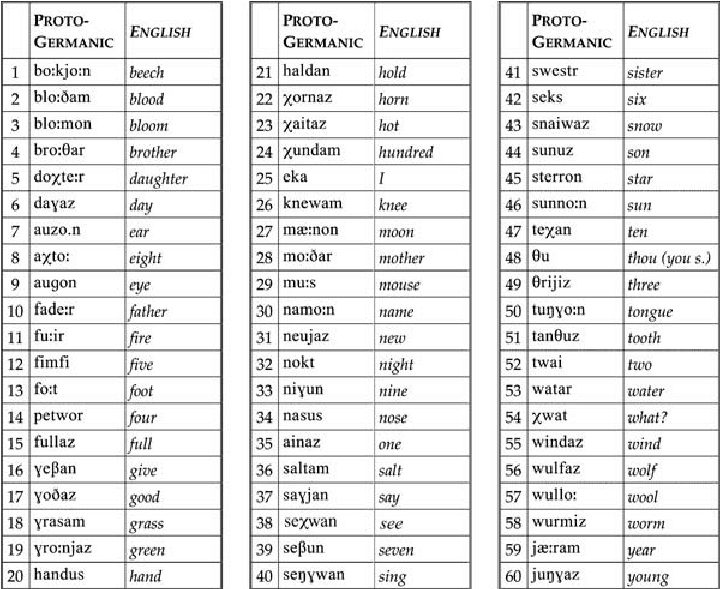
who knows if that is correct or not, but that can be said about almost everything.
interesting how verbal suffix -an reminds germanic -en and noun suffixes -az, -am remind latin -us, -um, yet they have pure -us in a couple of cases, but I don't see -um, but many other such as -iz, -un, -on, so it seems that the orthography of proto-germanic was not standartized, actually because they didn't have it, it's a reconstructed language, so it IS not standartized. If orthography is to distinguish morphemes in the sam forms regardless of the contextual changes of their pronounciation. While the other way of thought tells that orthography has to represent phonetic side more than semantic side. And thus there is demand for both ways. And I'd say phonetists should feel free to use their ipa if they feel such necessity, and the rest of us should shift more into hieroglyphic way of thought, where each morpheme has its sign and because those signs are multiliteral, there are more of those digraphs and trigraphs than the monographs of letters they consist of in the alphabetic scripts.
I found that list looking for cognates. And I found that cognates in roman law are relatives by mother, and relatives by father are agnates. A & Co. C opening the consonant raw in the east, the ka or japanese mother, as the opposite to ba? ba is father in some middle-east. ba is closer to ma in slavic and.. where else, I'm drifting away again, let's leave it be, let's jump onto some firmer ground.
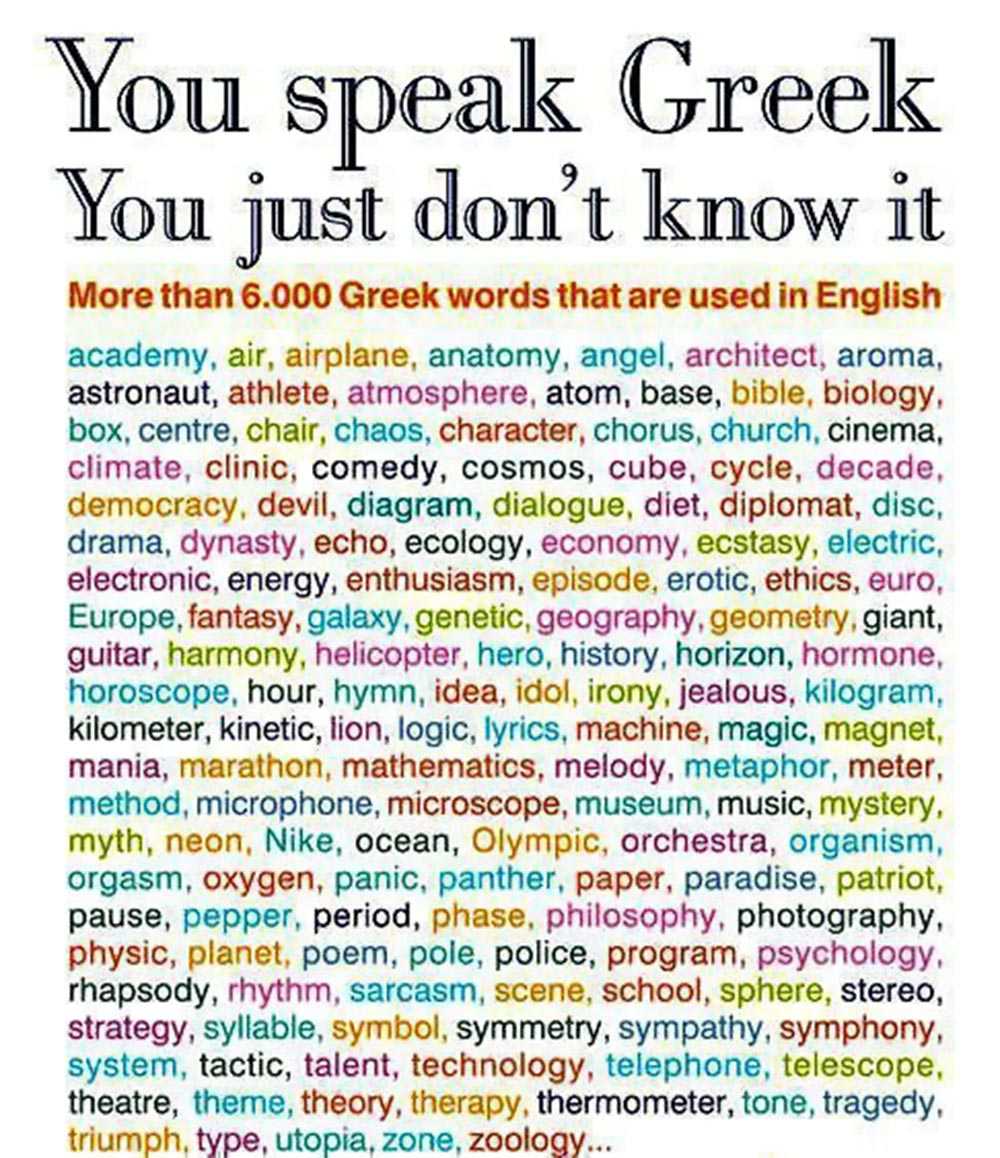
and what I was looking for is called not cognates (these are the same words in different languages) but doublets (these are the same words in the same languages)
English doublet-'frail' and 'fragile'-both come from the Latin adjective 'fragilis'.
fest~feast~fete, diamond~adamant, convey~convoy, shirt~skirt, regard~reward, poiso~potion, guard~ward, cattle~chattel~capital,
russian люби is borrowed by romanian as iubi, which makes russian ёбана a doublet of любима, ебать~любить, ебал~любил, ебу~любу(люблю) which is an illustration to the l~j thing
Forts are force.
Lord is lored.
lore is лёжа

All these unlikely connections seem like enough to make you put on your tinfoil hat, and make up wild theories about Portuguese being related to Japanese… but of course they really are coincidences.
Think about it this way: there are thought to be around 6,500 languages spoken on Earth today, and many thousands more extinct and dead languages. Most of these languages likely have tens or even hundreds of thousands of words. The largest English dictionaries, for example, have about 470,000 words. This gives us a very rough estimate for the total number of words in the world on the order of 10-100 billion! With the vast number of words in the world, of course many of these words sound similar to each other. And of those, some also happen to mean the same thing.
And so these coincidences pop up over and over, in different languages across the world. The 20 false congates I’ve shown here are just a drop in the ocean, and I could easily make another 10 images like this. Hey, if this post takes off, maybe I will.
But I liberated myself from being etymologically correct by looking for mnemonic function of such pairs. I think I will right to that site to ask for more tables like this. Maybe I should work with them?
Either way, how do they know that french ille is not related to igland, maybe it used to be inle and iglan
And here he himself gives an example of such third level relation:
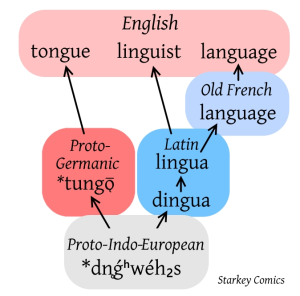
and couple of other cool thing from the same page:
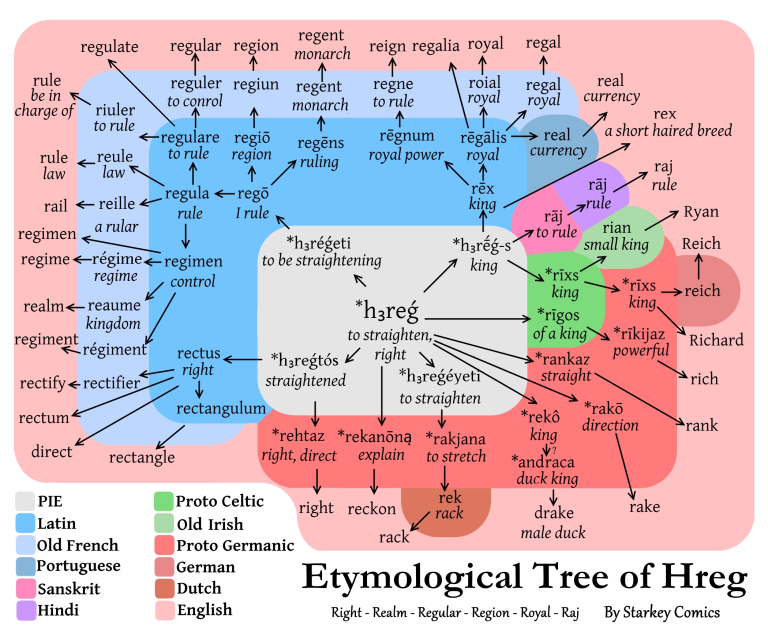
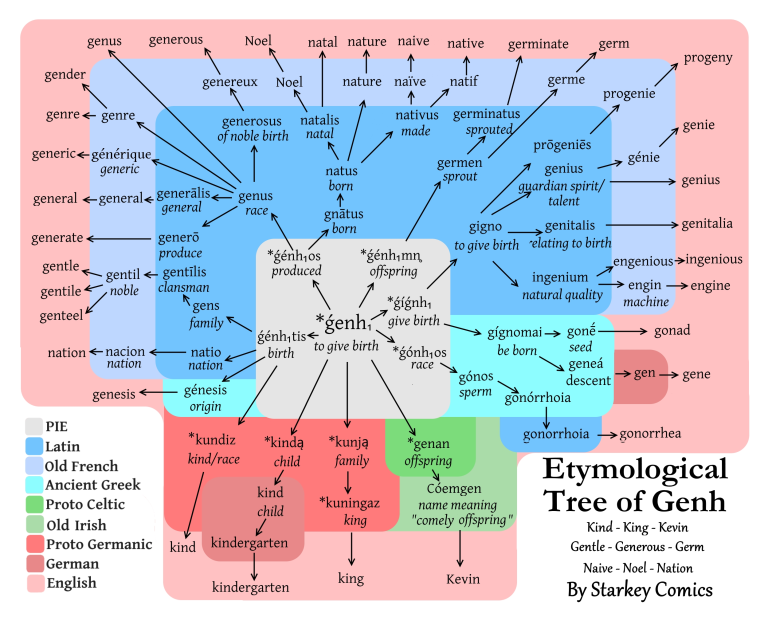
and another one:
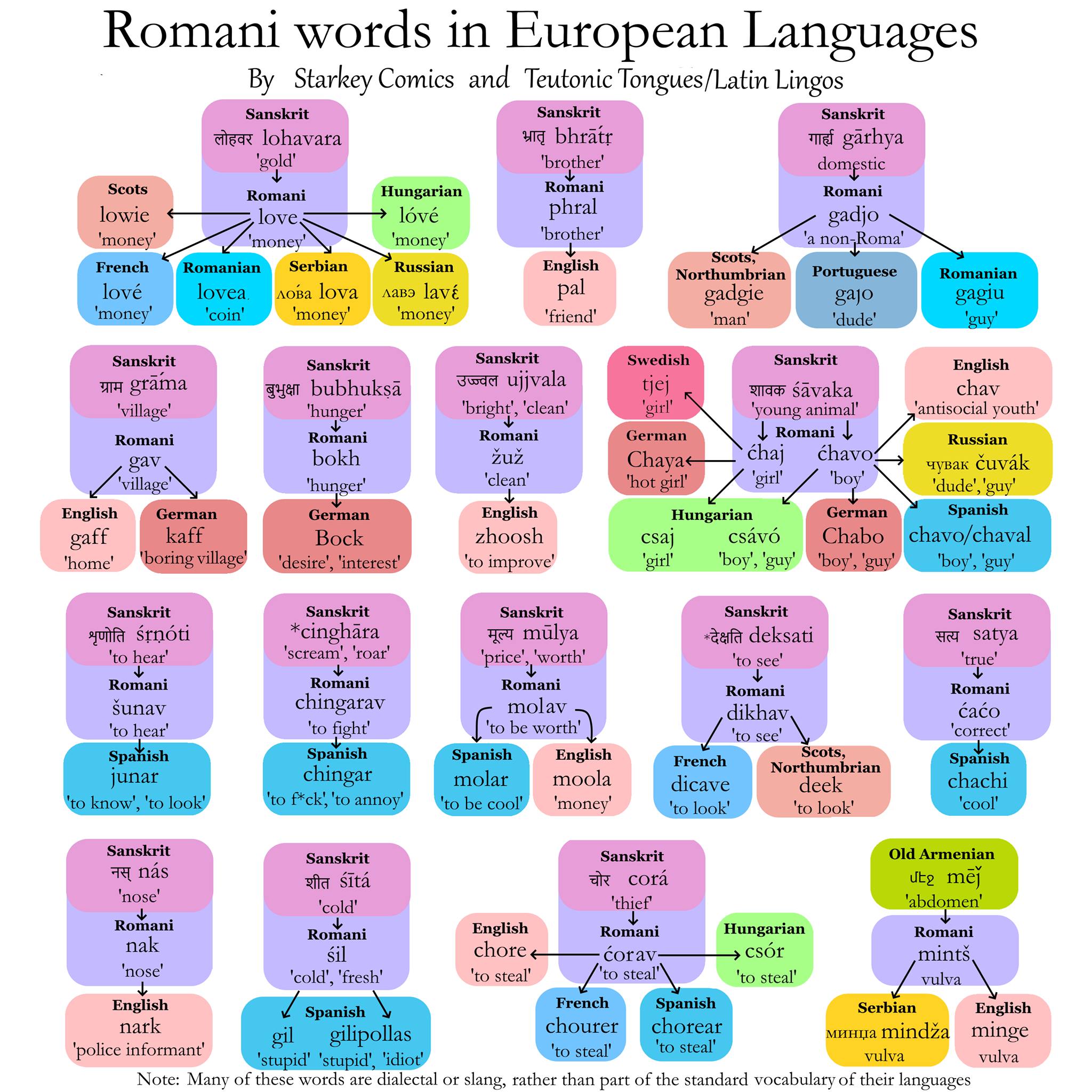
and some more awesome stuff from the same site:
(it's all hyperlinked, so I hope they don't mind)
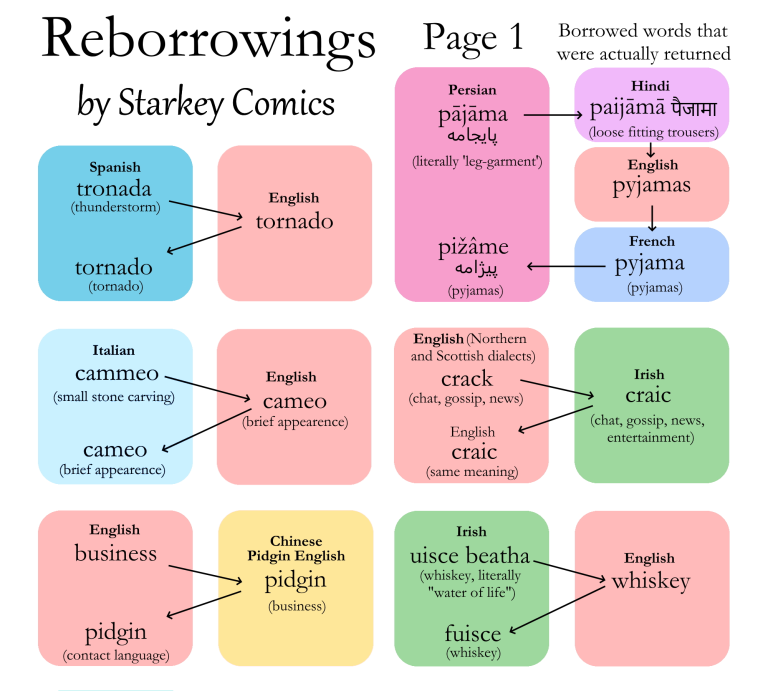
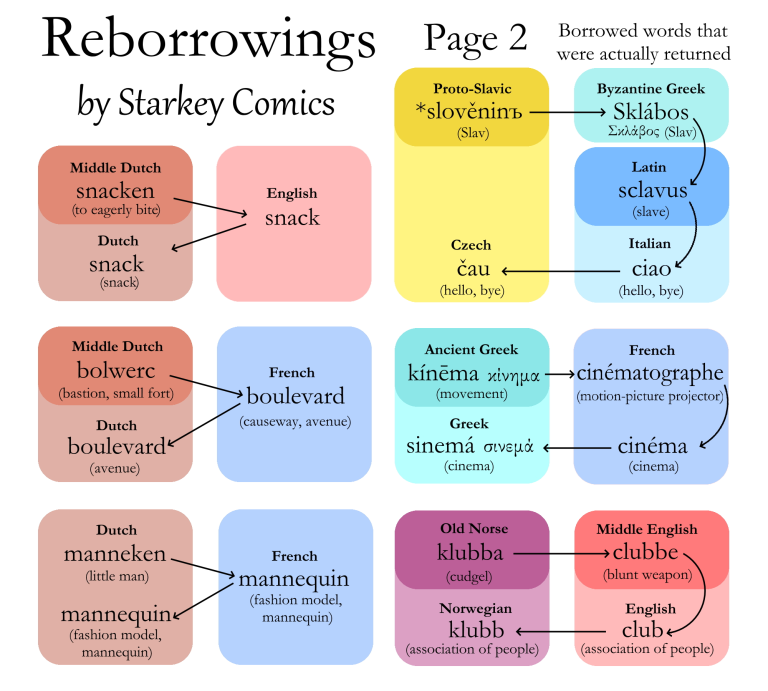
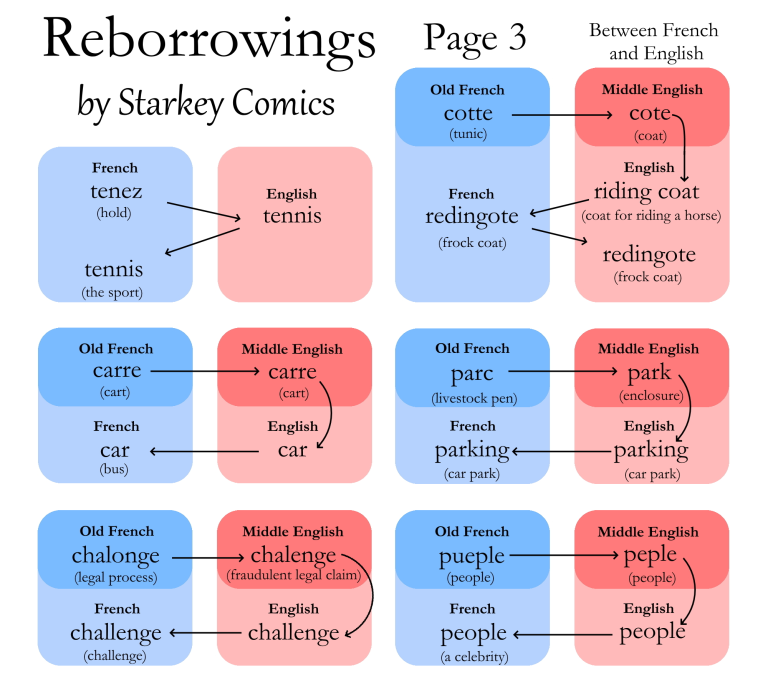
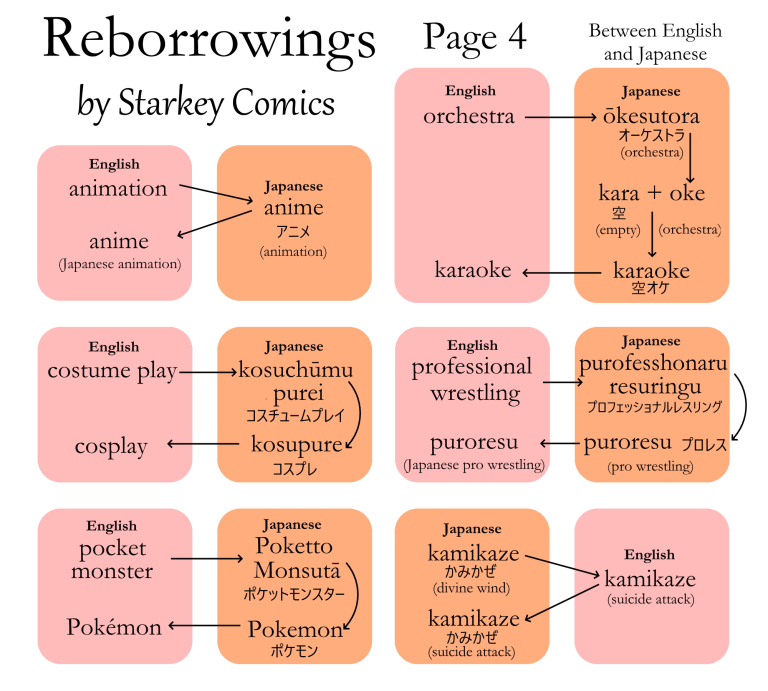
and from his fb page:
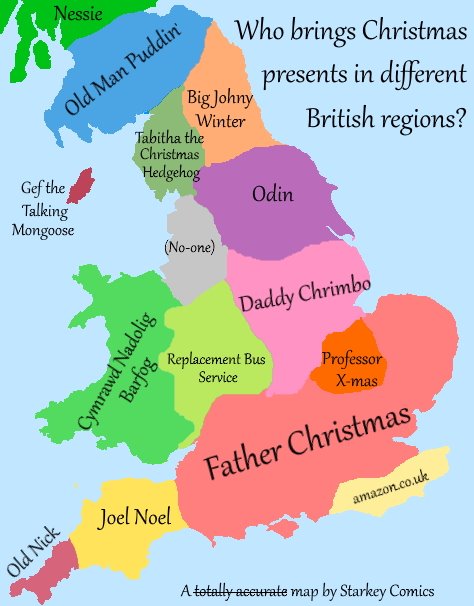
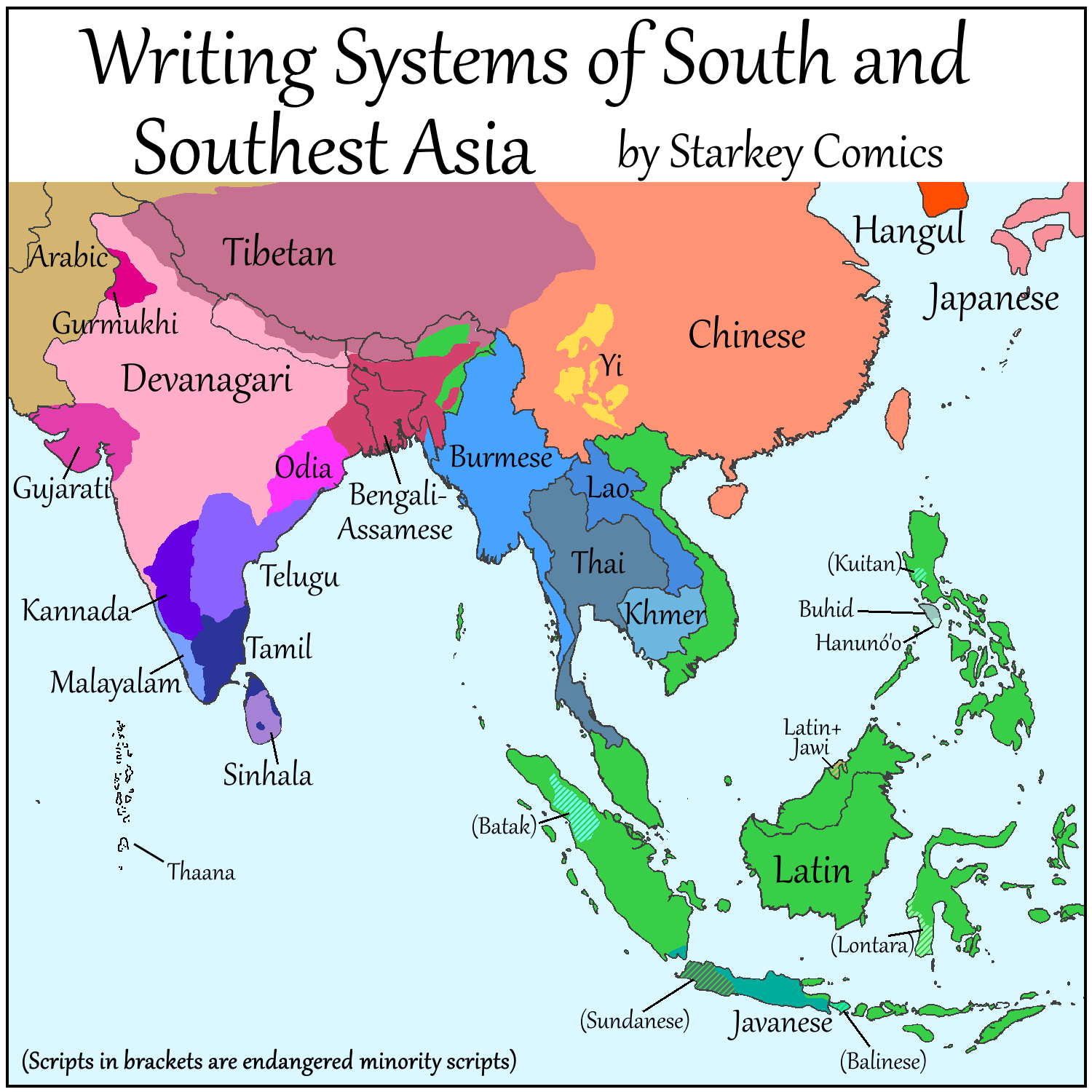
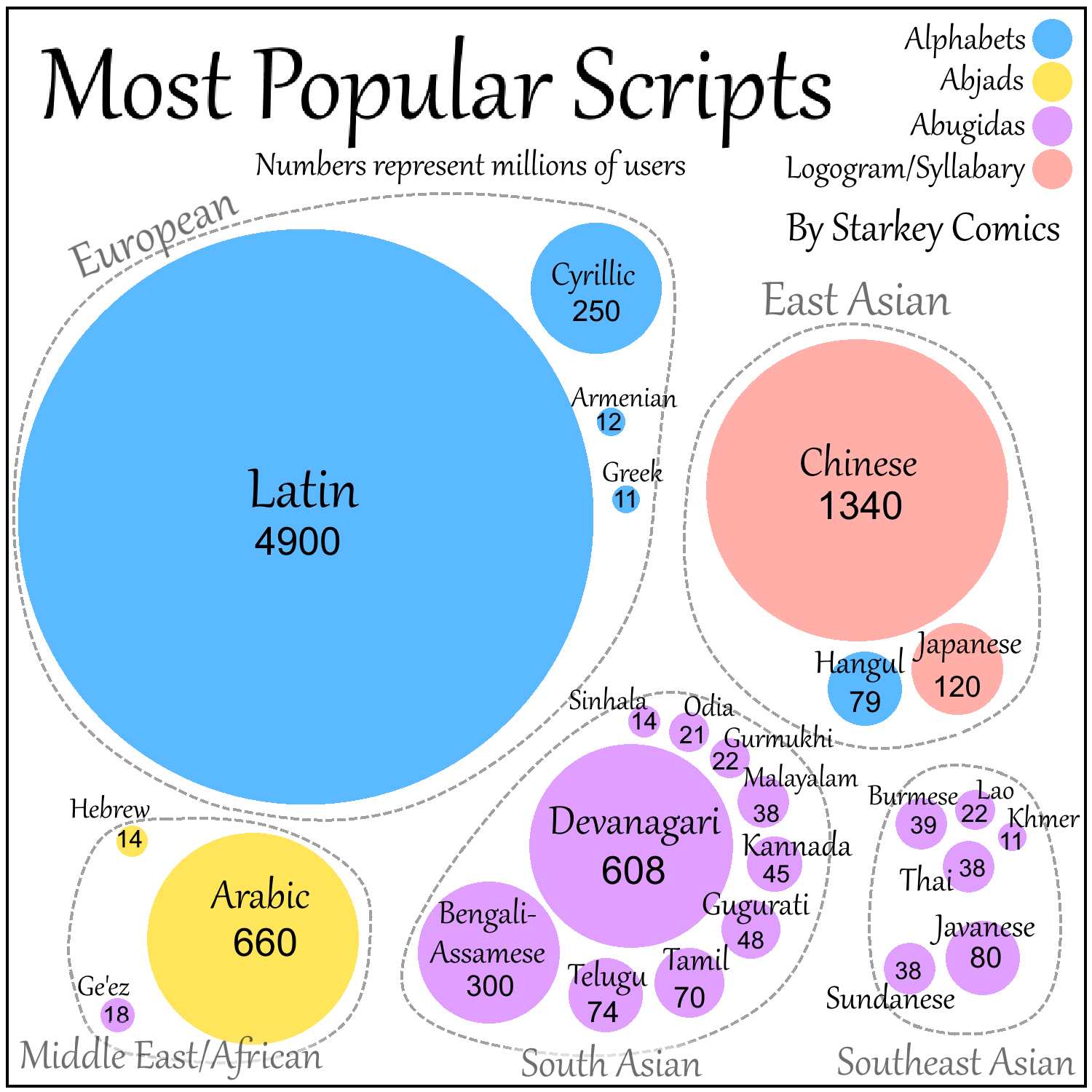
It's a little bit surprising that most of humanity uses latin. But seems accurate to me.
They forgot georgian and who knows how many others. Even in the comparison to the previous one.
So what about all that good artists borrow great artists steal thing? I just don't think my contribution should be the only thing I want to feed to the ai. I would feed my own and borrowed things separately and united to see how far apart those models will be. Very much apart it will be because my structure would be all about the connections between the elements, and theirs? we'll see, but most likely they will be separated uninterwined pieces of
Let's try to derive whole the language out of ha and ah
ha~da~duh~yeah~jah~ya~я~I~eye~ai!yayai! and that links it back to ah, which is the opposite:
ah~
I and я are phonetically as different as ah and ha. (ah is closer to az, though, az is old form of я)
а was instead of я? because az is how a is named in russian. a as the russian I
I-k-l-m-n is english mode? pentatonic! (I occasionally forgot j and thus 6's and 4's meet at 5. but 4's could be pentatonics by intervals. 6's could be chromatic by intervals (before tempered clavier we didn't looped different notes into octaves, but additional sounds went on growing with prefixes, I wrote about it so e don't have to remember it now. e is an accidental for я. je is you in dutch. ya is you in english too. ya is me for russians, but ya is you for brits. Thus russians are Я - somehow this link between Яиssians (яицкие как казаки (хазах силач на иврите)) was there from the very start of Я or russians. eu of europe is её in russian. but that is just my fluke influenced by u following e in some f's.
eng is -ing nobody else says ing
a-b-c-d is russian mode? абвгд it is in russian, and it is pentatonic.
I see ab obey cd sit (sidi in russian, but these are cognates, thus russian form is less reduced, stronger)
more strong stronger strongmore - silent m, silenced before lating script.
бел белее ее как er это близко, а ее как мор is further, and thus this guess is counterproductive, carrying further away, dividing, and I must unite languages. Use this case to pick out dividing hypotheses from the ai feed.
I remember that a is a later addition to ancient alphabet beginning with b. Only ogham begins with b of all the alphbaets today. Unless futharkh is the ancient representation of that meme:
fuѳ - arx
V – A
b – d
in – out
в – de
And it would be nice to find a language naturally uniting slavic у and spanish de
house the ours
домина до миня
wept so much that his face was wet
water wetter (makes wet, and more wet than anything)
вода и water are cognates and thus вода~моча? моча мочит. разделяли ли древние люди разновидности жидкостей?
series serial serious could be повторяющий(ся) (антоним: несерьёзный (пустой, вздорный, безответственный)
> And it would be nice to find a language naturally uniting slavic у and spanish de
y = v = ↓ = w, ш, Σ
A = Δ = ↑ = t
r as form of t (I tried to speak of that before but was distracted)
gettago gives gerrago and giveitaway gave givrrway eta is r? эта ра? не вижу других примеров в эту тему
r and t are male and s is female (she, sie (h~и~i)) q is female (queen, kvinna) p is male papa. o is female (open vowel, ring is female (cross or stick is male)) n is male? m is female (m is ma, n is he, он)
l is male, k is female? kvinna? but king too, but -ing could be "owned" if g was g which is d in russia, when g and d was the same cd staveless and stavved. ɔ could be the staveless form of b.
ɔbcd was the yin yang, and exactly in this order.
ef gh is also yin yang? seems so.
ijk lmn is the yin yang again? ice and lemon? cake and lemon? I don't know.
opq rst are? or are they чередуются? oqs and prt shuffled. I like p and r in the same group, because they seem to be invariants (in greek and russian pr is how they go not having the q in between, and their r looks like р.
and that is why I tried to unite s and t in one, but if they're male and female, they're the yin-yangs.
And if it is true what they said about etruscan's ɔc as all the first line (now they seem to add more letters, but here's the image I saw first)
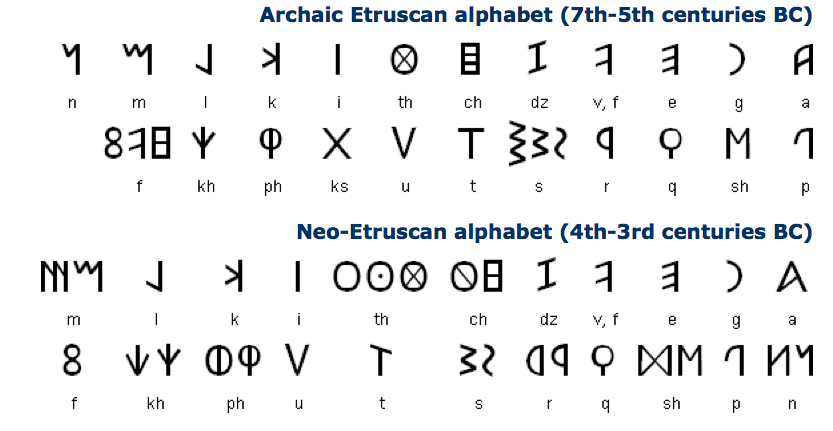
It seems how it was on omniglot when that collection this image leads to saved before they janged it. Now it is like this:
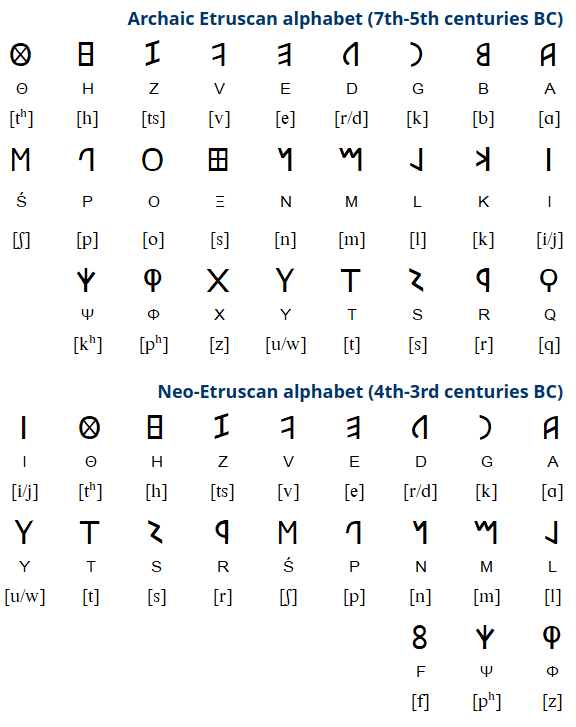
I suspect different schools having different views on thes. But because the AGEF order is counter-intuitive and bold and brow-raising, I suspect them to have reasons to claim that they had neither B nor D there. So it makes me think they had their reasons to claim that. And to dig it further I have to find the old books on etruscan, I believe it is there in them. Not tonight that's for sure.
Also notice them reading H as ch, what I claimed it to be to justify it's position not in velars but in coronals column.
And I found runic given in futhark order:
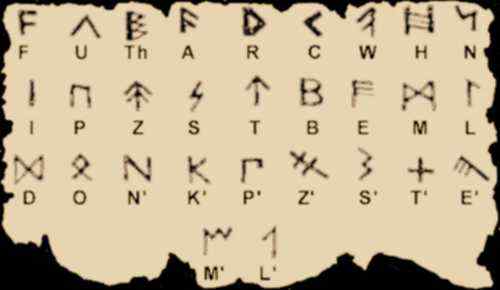
But it seems to be some other font. Some wild runic mess with who knows what origins and authetity.
That site has some interesting information on other writing systems I've shown:
Origin of the Bobileth Alphabet
Probably the earliest known pre-Roman writing in the islands of what would become the area of Britain and Scandinavia was a Goidelic alphabet known as Ogham, which was first mentioned in the Book of Ballymote. Goidelic consisted of a number of upright strokes, standing on, suspended from, and crossing one line. Following the Ogham, came the Bobileth or Boibel-Loth alphabet and its derivatives, all preferred to some extent by the Druids in certain areas.
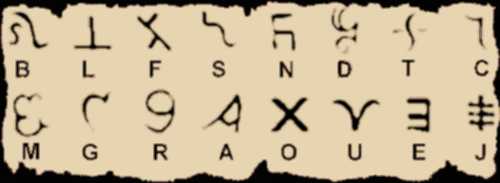
It mentions ogham and it gives these letters in ogham order. but it has 16 letters. Interesting, I wonder what is the source of this.
And that site has another example of runes placed in alphabetic order, and though it's a mess too, I wonder what are their sources, I will write them now.
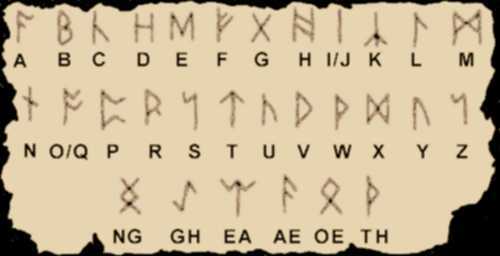
that ng tells that ng is just four lines in the form of the square. The other forms of that ᛝ is ᛜ and wheter ᛝ is that rhombus written lazily or, as I think it's two ᚲ's carelessly drawn one across the other.
Here, they give a good comparison of greek and hebrew:

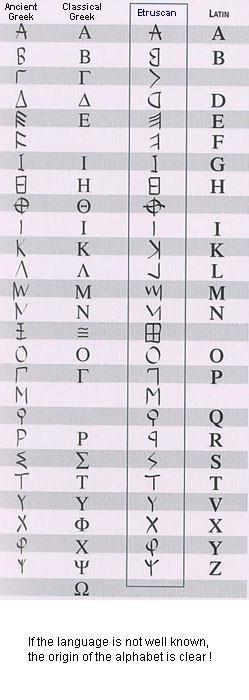
Interesting. I think it's the first time I see how they counted thousands. With the dots, huh.
Could it be that arabic dotted letters are rudiments of some previous and maybe even forgotten writing system. Will I be able to reconsturcti it? Ai probably will.
And to save the place, I placed some other long comparison next to it.
Some etruscan with Г and lating without C.
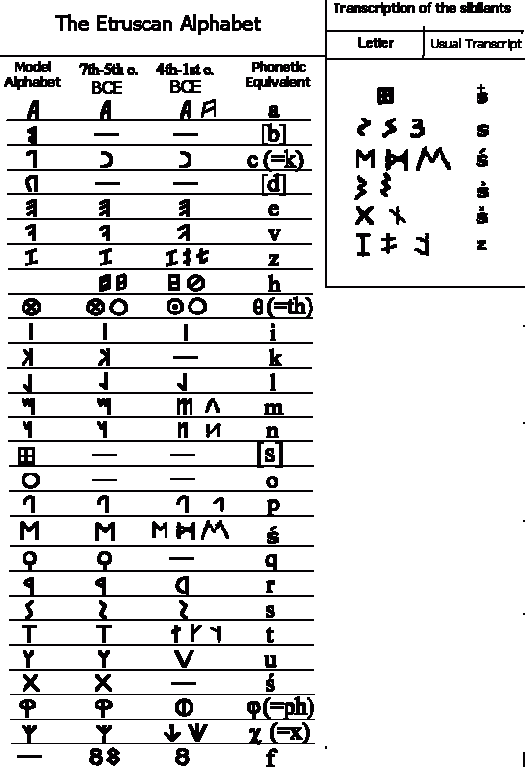
And why I got so excited by etruscan having only A and C in the first raw is that staved and staveless runes are the same, and thus ɔ c being the first line is spectacular.
and something I collected too, so I'll add it to it:

staff and stave are doublet.
Some carian writing system:
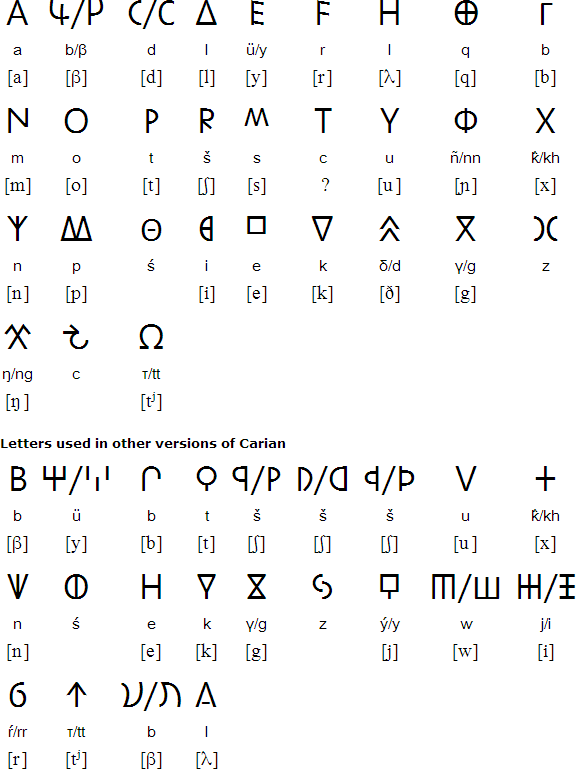
Λ
ɔ с
E З
ИN
V
or why do I hypothesize that monstrocity, when I found a better symmetry before:
bd
pq
voiced letters grow up, voiceless letters grow down. So let's figure out right and wrong forms.
g probably appeared the latest. g is c with a dot (or the other way around?)
abcdefghijklmnopqrstuvwxyz
And that idea is completely lost outside those bdpq thing: g, j, y, z grown below while they're voiced.
h, k, t grow upwards being voiceless. As if they made it the other way around in spite or to palance the bdpq thing out? l is the only other voiced growing upwards. So are they bdlpq? could make sense, actually, because l looks like a dividing stroke and it stands between them too.
bdlpq
Λ b d
l
V p q
and because whisper is comprehensible, they're the doublets b~p (papa in the west, baba in the east, how does it make d more of a mommy I've no idea, they could be both baba's like brother frater father, father was a brother too? Did they fuck the kvinna together until they figured out that from relatives kids are worse than between foreigners (from different villages)
We're learning on our mistakes. Let's learn to progress faster. First the goals:
biobunkers for everybody. The most basic form of it is just inner shell: owner will place it into a concrete and warming by himself. Just inflate spheres out of polyethylene terephthalate (PET)
Sorrow ~ Горе
S ~ C ~ С ~ Г
Sorrow~sorry (горюет)
in russian sorrow is gore. Such a hardcore russia.
sorrow serious sad. The opposite is рад, glad, red.
r before s - could they stand for red and sad (сер, gray, and again g is s and these two letters look alike and russians used to have s where g is:

SЗ could be two variants of the same (З is Z) or they could be 23 or 53? 53 makes sense because I is not too far (H is probably II) thus З И I are 3 2 1? S is 5? because Ж has exactly 6 ends. E as 7? Д as 8 without the bottom? The opposite of ꙋ desu ka? 9 for г (g) and 10 for В? Б rotated 90 degrees counterclockwise would be a better 10 and that is how this B could appear as two 5's two S's two c's along the staff.
I think I found something. If we count from I backwards we get the 1 to 10? let's try it in english, where I don't have to wonder what was the 4. Ч? Ч for щ would look god among s, z, sh, because it's very close to ш which would fulfil that set the best. in that period I brought all those цчшщ are past omega which is traditionally the final. So could the mess in the second line be the attempt to include those russian letters in the set. Did set of letters grow because grammatists didn't recognize the cognatic sounds? That would make languages more related, if russians wrote пламя as flame reading f as p and e as ya. flame read as plamya russians read that ey as a.
Russian soul will learn from english soul more if we begin speaking less open, the way they speak in egnlish, not plamya but fleimj with final e reduced, when russians inflated it into ya (but they both stress the a пламя пыл пылает -мя что за суффикс? зна-мя пла-мя вы-мя (зна-ю, зна-к. выдою? выпью? вымя прикрепляет -мя (моё? me? я is e in english) to preposition вы, таким образом слово вымя не имеет корня, лишь приставку и суффикс)
пыл пыль дым? дымит пылит (вз)дымает пылает (пыль вздымает пылит дымит. пыль и дым лишь позже разошлись? но фонетически-то они разные. дым пыль ль~m? п~д? papa~dada huh, p and d are the same form, ortated 180 degrees. b is баба q is kvinna. So that is how they are divided! p is d. It explains tha labiality of papa. But how can it be? Isn't labial and lingual the opposition of B and T?
b and q are B, d and p are T? πρσ/ςτ aren't they the ultimate 2 1? isn't it the ultimate numeral direction from T being the final letter and first digit?
Ш П Т is the best that came to my mind.
ANd because of ж з с in the second line I say it's E, EFШЦ as some protoform giving posterity in it's variants. e как если и как ex. f как if и of. ш for шо and ц for це.
кашель кошель
caugh caught, кашель поймалю кот~колд. caught cold. кол как в вуду? curse зараза, curses psychologically damage immune response by overwhelming the immune brain now fighting the mystistic curse instead of watching out for more real things. So don't believe in transcendent shit and thus be immune to its crap.
колет ловит? рыбу острогой ловили. и поймать означало пригвоздить. от слова гвоздь. сквозьтебя.
гвоздь сквозь. сквозит

as you can see, it's in russian order, in hebrew or lating the order is probably different, I should look at how russian letters are ordered if I use hebrew as the basis of the sequence.
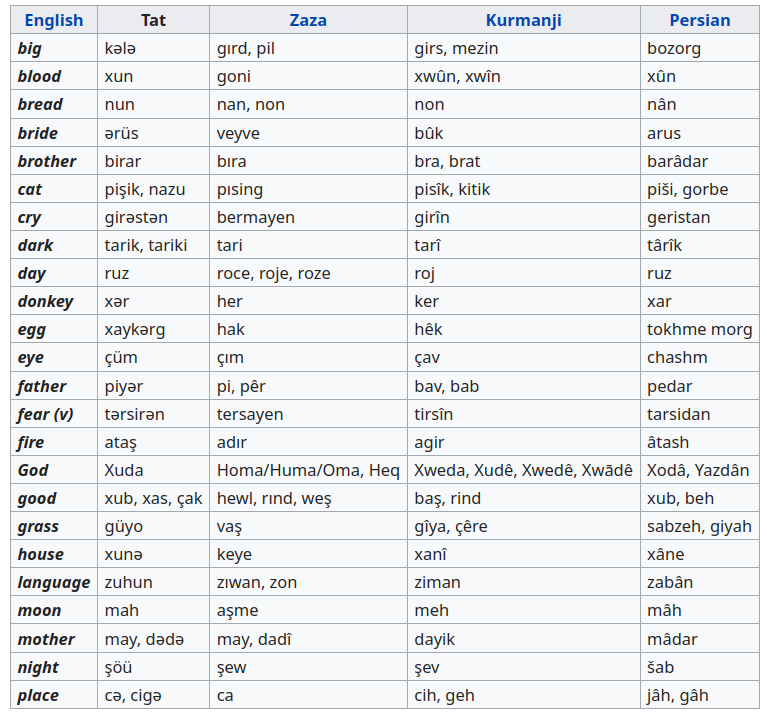
bab for father and ded for mother is connecting these languages to georgian. The way they pronounce brat is sweet. What is english brot-her? her brother? шурин? brother in law, не родной брат. her brat, господин брат. сподь как исподнее? ис под облака? из под чего? исподнее из-под неё. надо здесь покопать, что-то древне и базовое, косподь шутка ли. g-d
г-сп-дь
но я почувствовал себя неуютно когда этимологизировал подобные слова. слишком много себе позволяю, кто-нибудь может счесть это кощунством. колдунством. щука лодка? щи леды? нет, это борщь можно холодным есть, но он бурейший. бурейш. борйш.
щека лдка? ланитка
щепка летка? лес рубят щепки ЛЕТЯТ
лтепка лё-тяпка? топор тяпал топор твёрдо и усилительного, увеличительного (т. н. сравнительного) суффикса или предикативного суффикса (существительного из глагола. Как сказал кто-то, наука без знания терминологии - рецепт фиаско. Мне неплохо бы что? я не учу их терминологию, я создаю свою и либо доставляю обещанное, либо нет. Я вчера порекомендовал тому у кого брал когнат полотна чтоб словари когдан и дублетов издавал. Я сам таким займусь когда пойму что каждая буква означает)), а тяпка мягко и уменьшительно-ласкательно. Потому топор мужское слово (по мужскому твёрдо заканчивается) а тяпка женское, как и коса быть может? серп был мужским и оттого мечи образовались?
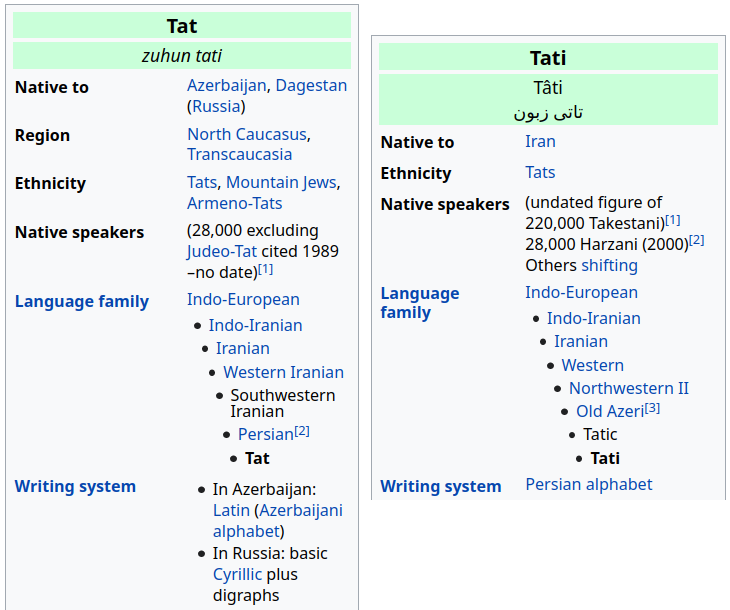
How can language being used more to the north be southwestern and another one used to the south be northwestern II
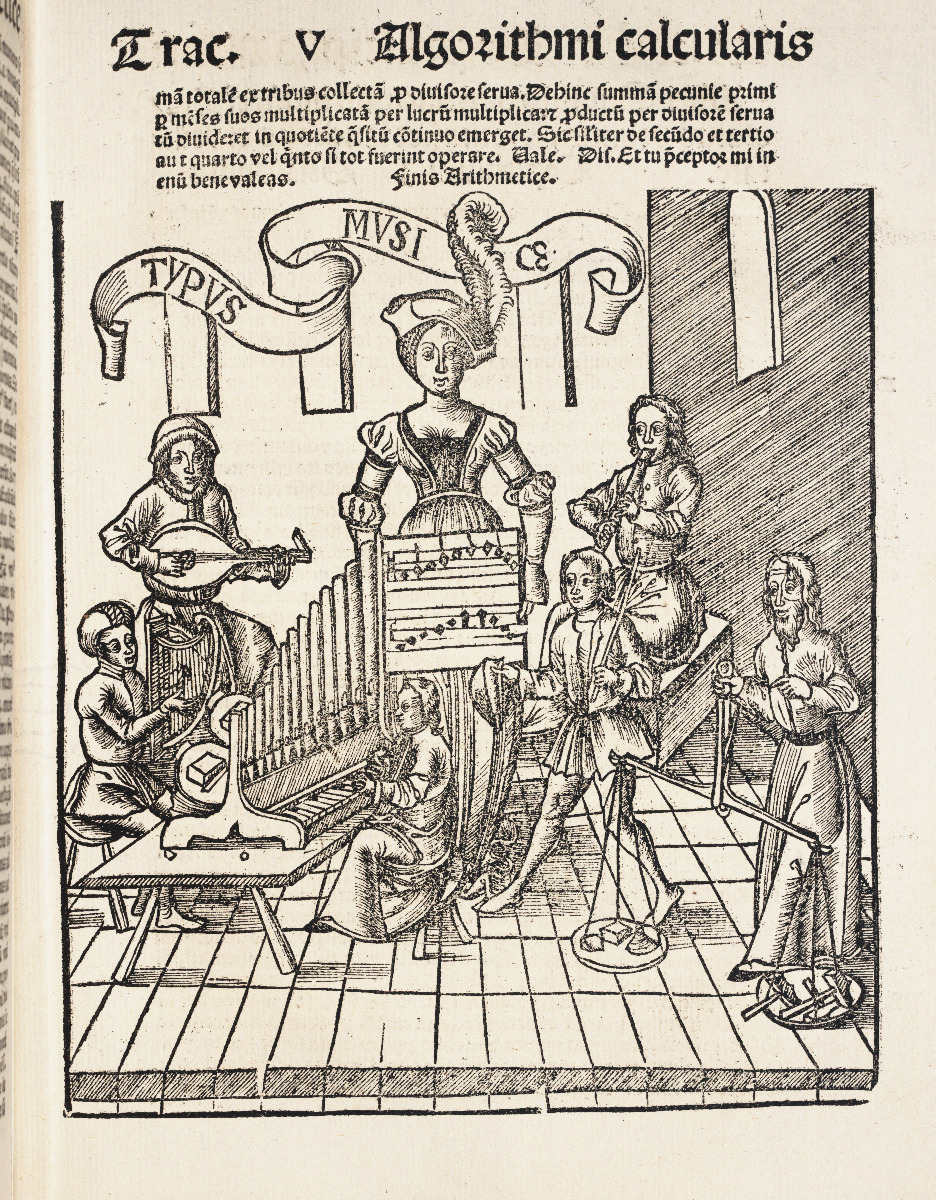
six notes in the ascending (more modern) mode and four notes in the descending (ancient) mode, and that asks again if notes denoted not absolute, but relative tone. Because most musician don't have absolute ear, but they must have the relative one. I think I heard it from Adam Neely, I hope I didn't botch the terminology.
-re suffix can be the same in comparison and occupation noun:
cooler as more cool and cooler making it more cool, and whoknows maybe also to cool, as -ru in japanese.
It is interesting, that to cool and to heat are verbs, while cold and hot are not, as if they're some pp's, as if cold is shorter spelling of cooled.
of and for are so similar semantically that it is as if r reversed what stands befoe it.
far af? (as fuck, yeah, but nah) hear aeh? ух? also hah, h, nah. sir is? nope. more om? no, it was just a coincidence with for and of. Actually they're the opposites as of and to. to and for are more similar semantically. And it's a good wave, so I have to get high again. good morning..
and instead I drowned in the internet of shit. I probably should write it for myself, leaving all these comments outside.
Holyness begins with honesty. Do they share the same ho? ho of honour?
honour has our in it? hon is like hen (ochenn in nadsat. nadsat sounds as it's pre-pissed, before pissed (mad) nations. nadsat is above satisfactory. Because we're whites (like our own japanese nations (all those bashkorts and tuvans) are smart too) and fuck russia, we're not russians, and even though nadsat contains ssatt in it, not the best association, rus is in sruss (as if I shit myself when I'm with rus, which is semantically rather accurate)
So I was saying honesty is the foremost step towards holyness, and thus holy has nothing to do in the government agencies: those people lie without any second thought: if a man doesn't fit in their parametres (причина прописки: нет ни "ваш ебанутый закон запрещает проводить сделки без прописки" ни даже "покупка квартиры" что уже было причиной возможности для прописки, но не причиной прописки. клерк без задней мысли отметила "по семейным обстоятельствам" как не имеющее значение, опрос призванный лишь для увеличения бумагооборота. В чём прозреваю лапы лоббистов от бумажной и лесоистребляющей индустрии. Не оттуда ли легенда о рептилоидах как о существах, предпочитающих пустыню. Но правда в другом: они хотят, чтоб весь чистый воздух был от синезелёных бактерий, потому они и селятся на берегах океанов, чтоб те кто в глубине материка шастают были лишины воздуха и если бы не прямо сдохли, чтоб нападать на прибрежные города не смели сметь.
That is why holy men have nothing to do with the clergy. Clergy even call their action beLIEf, as if to somebody telling that what they believe is lie, they are supposed to answer "be lie of" or something like that, as if "let it be lie, I want the lie to be" so we philosophers may learn how to believe (when I learnt it I just applied god's existance as a true fact without challenging it for a couple of years until I felt myself going insane (I saw god's hand in everything. I forgot that I allowed me to suppose it because it is technically possible that he exists but doesn't intervene. On these terms should I reestablish it now? To question chaotic information as "is it really god's intervention?" like "is it chaotic?" because thinking like this I may find some other actors (artists, officials, who knows who else)
Or that belief spelling can have nothing to do with the lie. unless it is lie within beef. beef is the wanted sacrifice to priests to eat, even though exodus29 demands lamb, beef could be of some previouth faith.
yean, what an interesting word..
All the system is built on lies. As if man and machine may work not directly but through some patches (what happens when a man can interact with the machine directly we may see in chinese gore videos where men are rolled onto powertools. machine-tools.
So the question is do we need that machine? We probably do as long as many people may be called to decency either by extermination, constant terror, or some dumbening lie. The lattest variant is much more humane and thus we do. Until we make those psychos smart enough to comprehend the concepts of decency, honesty, civility, and so on. And we have psychos on both sides of the fince, so how will the "good ones" act when they get smarter? Will they be reflective on themselves or will they scheme to conquer the world, but then they realize that others are also smarter and calculate those conquerers out and do what to them? Some psychiatric help with random lsd drops onto their food or just onto them.
Знаковое событие ареста моего брата по надуманному обвинению: его судят за то что якобы не построил фундамент прежде чем его снести, а она говорит что
握
Трус и ин russian is truth
(трус тот кто проболтался, русские дикари не знают правды потому что не любят её)
Jesus is Lord? or is it a patch to hight hide the truth. To put something upstairs Will I go scanning the mountain tops (desert places where else is it better to hide things.) or will I disregard that hight~hide cognatism as a coincidence? cognate and coincide cado is the root, not ex-, sub- -sist (-se, est; schisch? русский шиш is зеро. кукиш кук=ш? ᚴᚴ ~ ש hebrew have staff? from which in ש two ᚴ's grow?
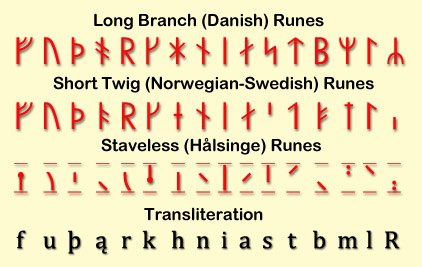
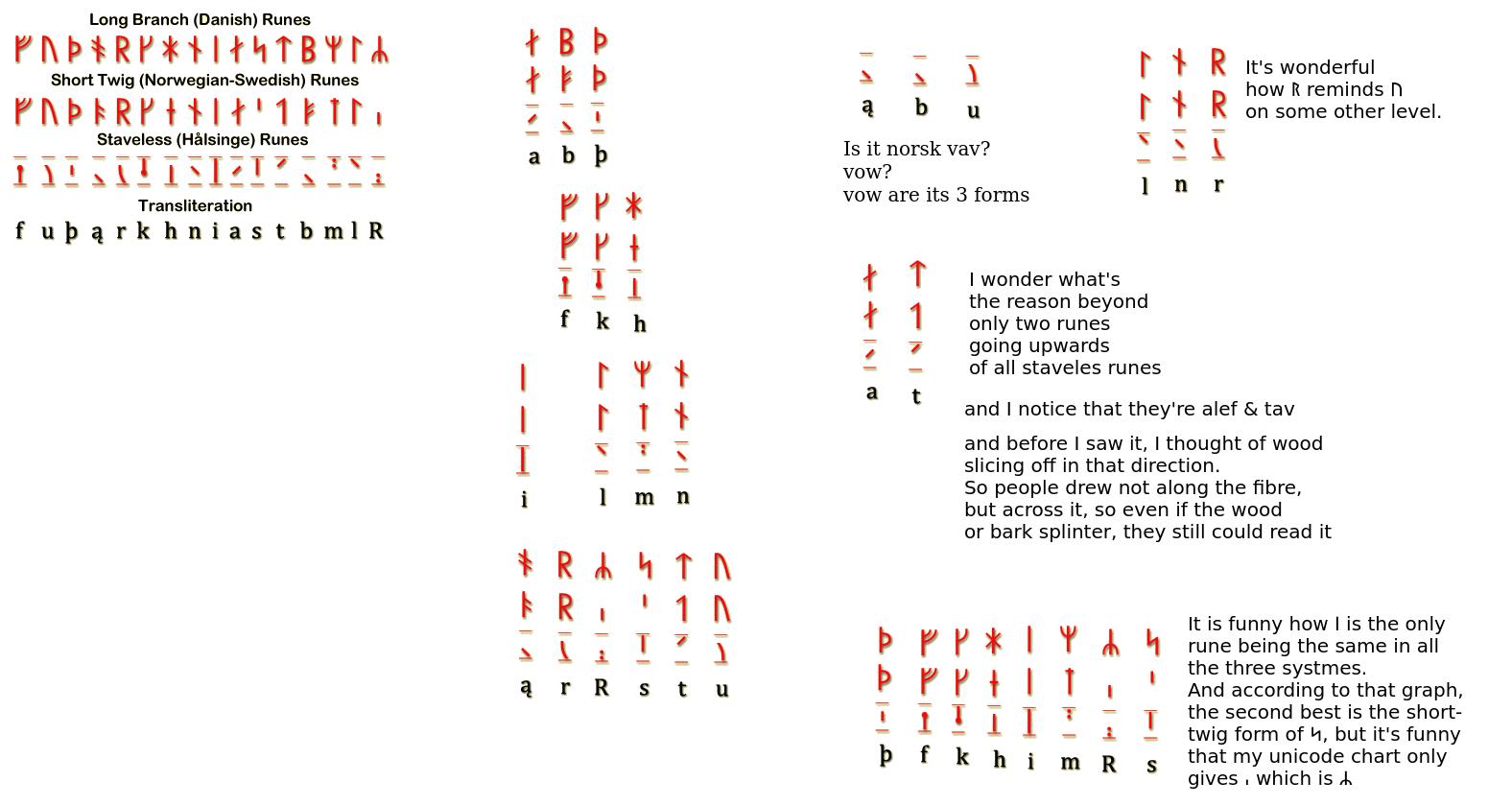
this unicode chart:
ᚠᚡᚢᚣᚤᚥᚦᚧᚨᚩᚪᚫᚬᚭᚮᚯᚰᚱᚲᚳᚴᚵᚶᚷᚸᚹᚺᚻᚼᚽᚾᚿᛀᛁᛂᛃᛄᛅᛆᛇᛈᛉᛊᛋᛌᛍᛎᛏᛐᛑᛒᛓᛔᛕᛖᛗᛘᛙᛚᛛᛜᛝᛞᛟᛠᛡᛢᛣᛤᛥᛦᛧᛨᛩᛪ᛫᛬᛭ᛮᛯᛰᛱᛲᛳᛴᛵᛶᛷᛸ
And what do that I has us with. Is. Isis or Jesus? Some holy name uttered in some other context, secretly knowing that the father is actually the mother. We abuse her love, we regularly offend her as a ritual. O mother! Save me. My soul is could be my soulmate, a spirit which attached itself to me and asks me to pray for it.
it как эт в эти где и суффикс множественного числа.
Then iua is эюя? еюя? ребёнок коверкал зелёный какокий (хароший бы подошёл лучше)
k as s with a dot can indicate both originating from some common c.
then similar forms fo f and h may indicate that fa fo fu but he and hi is the same thing, as it is in japanese (I believe our phonetics is related, but I honestly say that it is a belief)
менее has more men in it (делится на польшее бое большее количество людей)
когнатичность с many, because many is probably of -men -en
ta-men.. where is it from? what id is ir it./? 他们 (they)
The Chinese word men - 们 - mén ( plural suffix for persons ) ·
他们 is та+plural_suffix. which make chinese using the same instruments, elements, the deutsch and russky use.
So languages are just messes from similar elements used differently, pronounced differently, and in this particular case chinese with that slightly different pronounciantion shows that germanic men and -en are cognatic. but then germanic shows that men is many.
an is literally one, so man has that article within it. so is en also article? we know it only as suffix.
Is a initial position and e is its middle form (when it is attached as a suffix) Then final position is Ъ.
А ДаваЙ ПисатЬ ВоТ ТаК, КаК ВыноснаЯ КонечнаЯ. но я слышал ли пол правды: они не обязательно конечные:
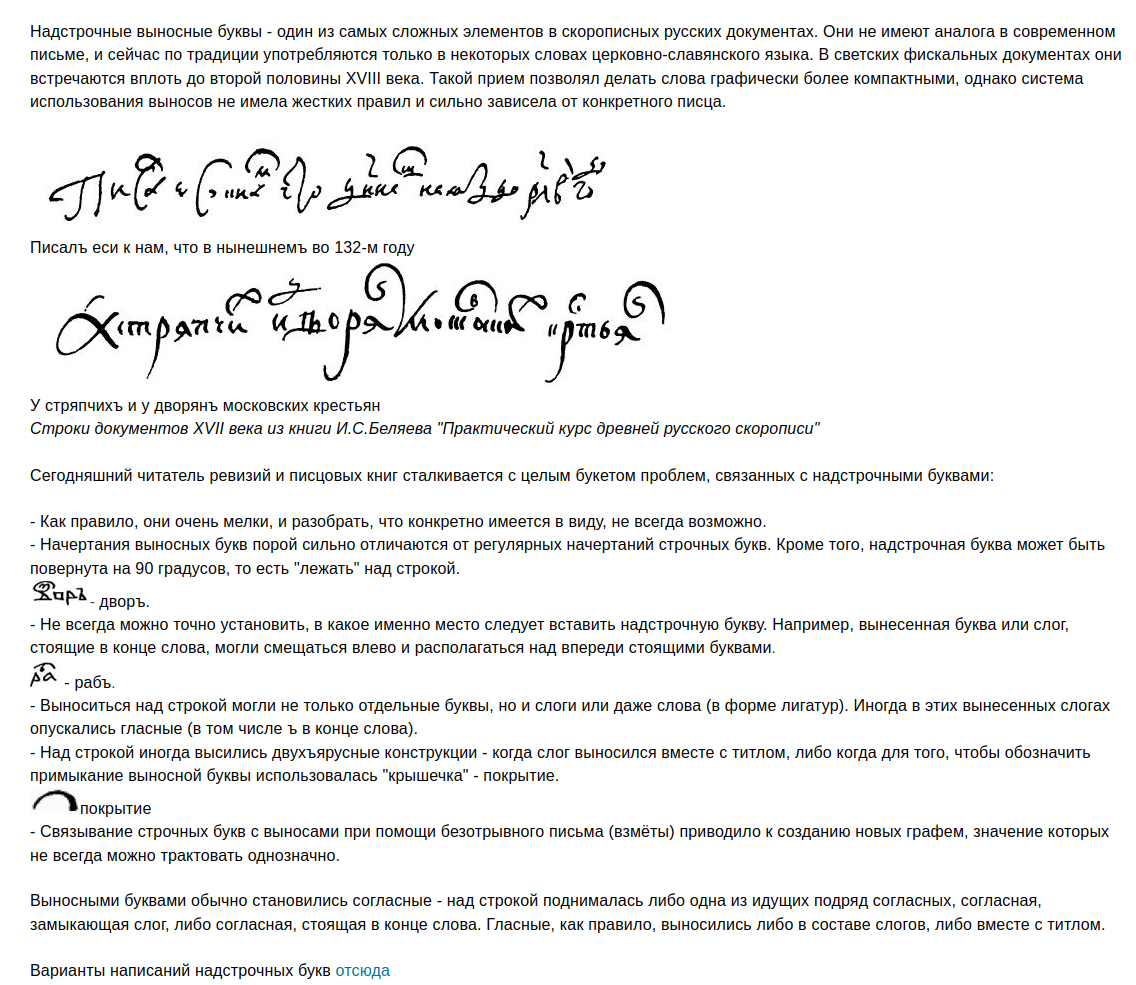
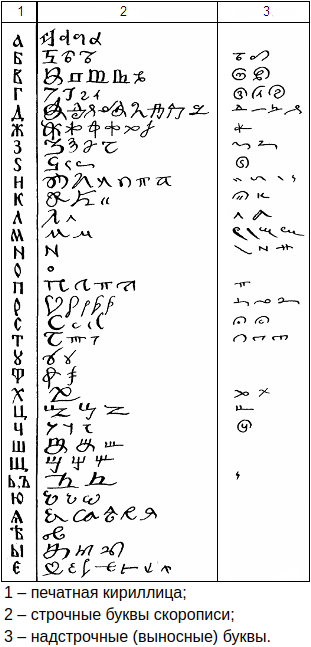
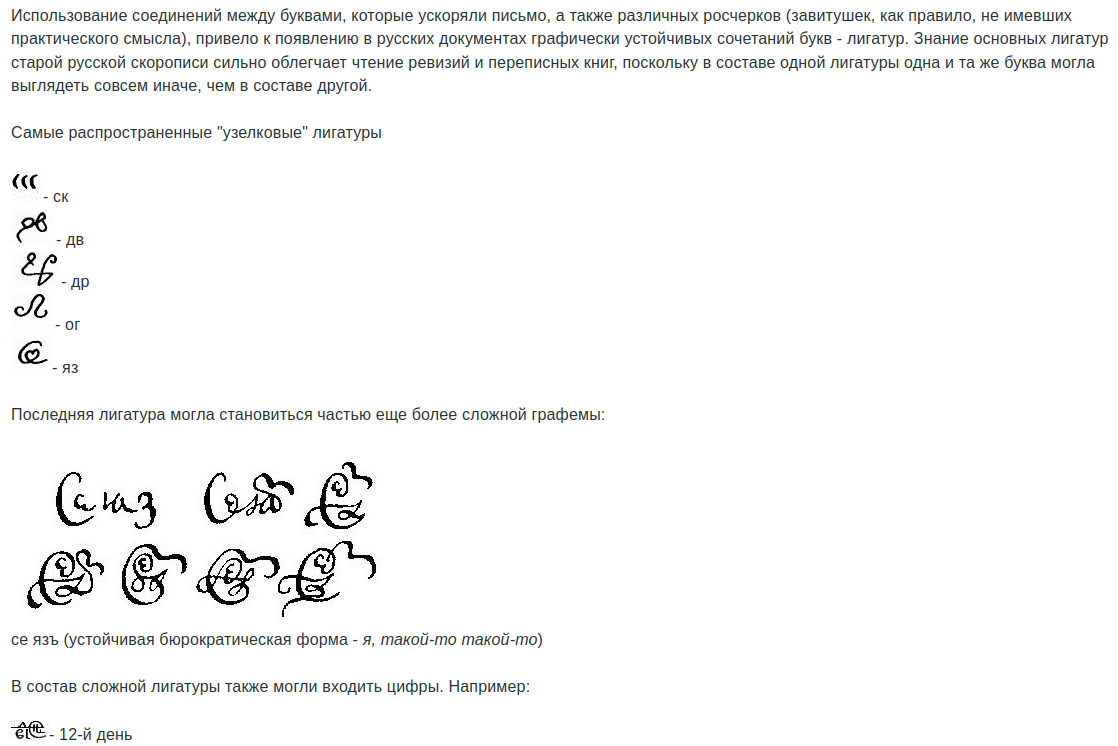

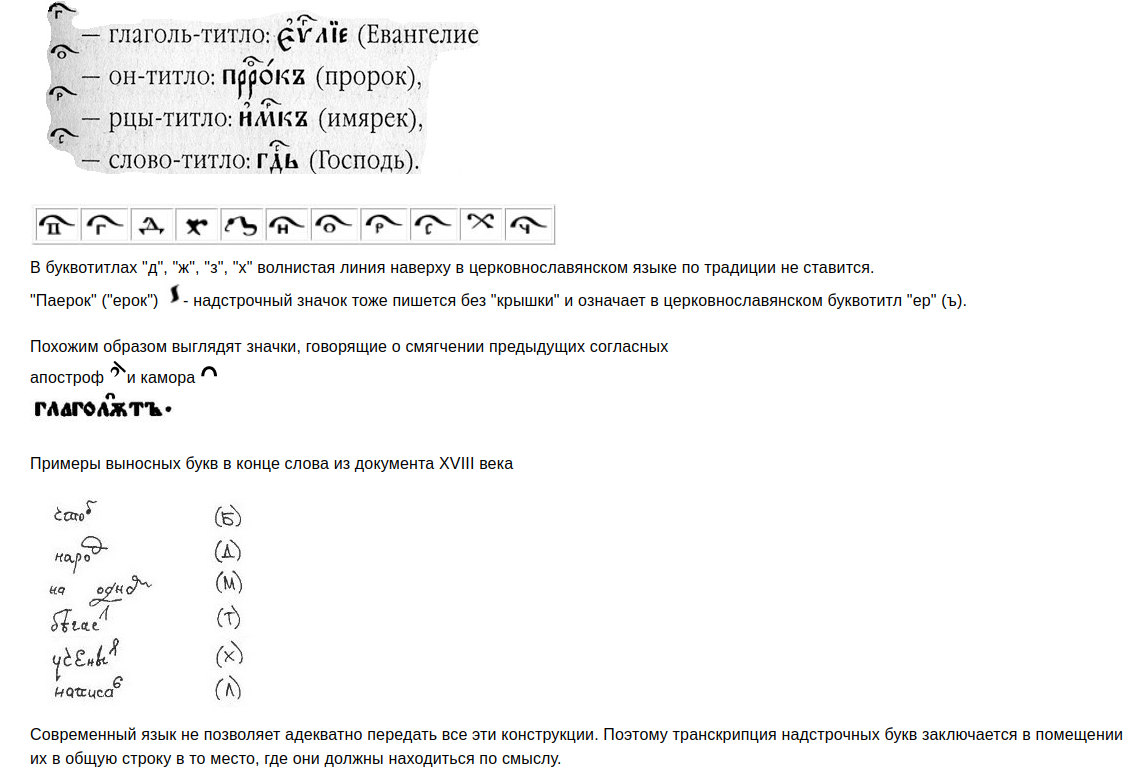
and this rabbithole leads me further: https://helghelg2.livejournal.com/48502.html (mirror)
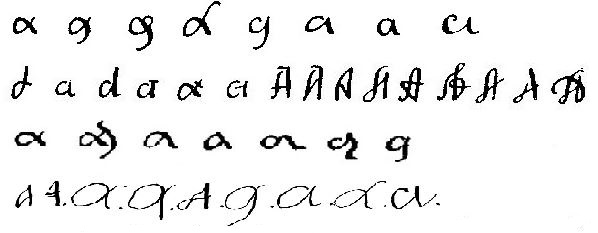
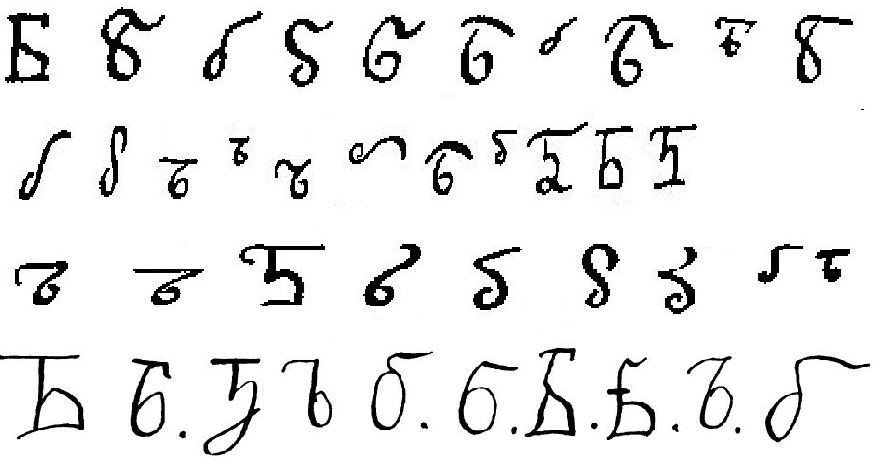
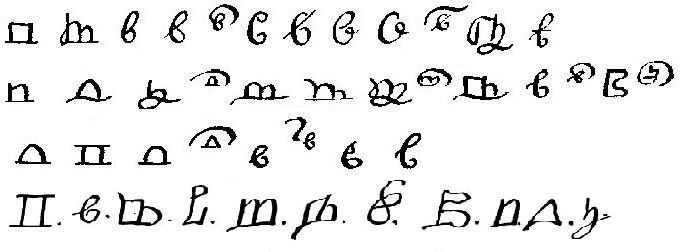


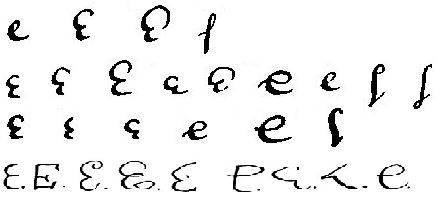

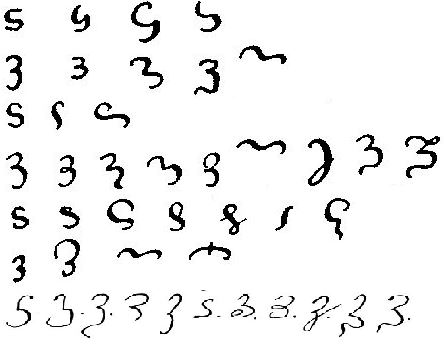

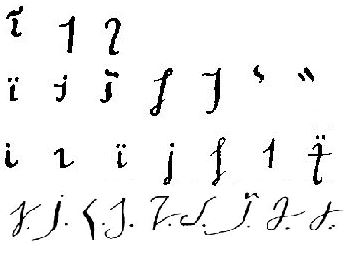

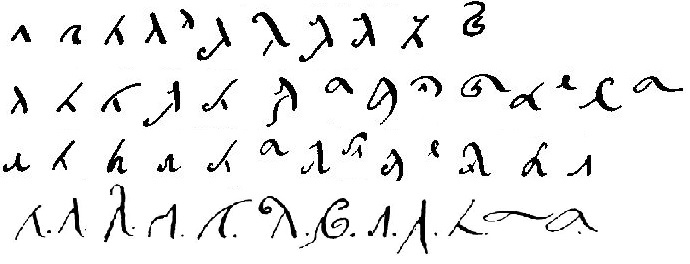
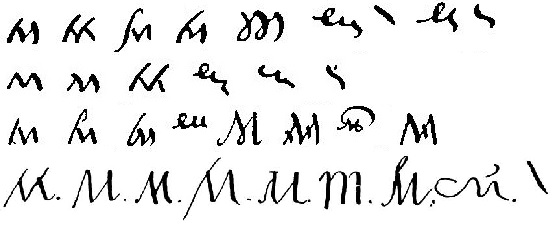
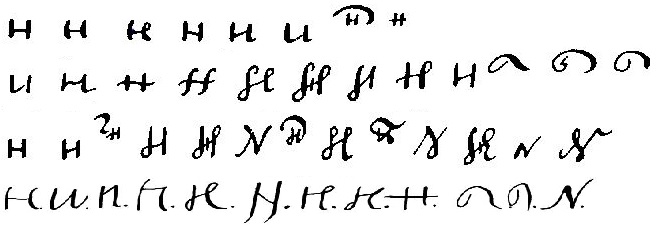
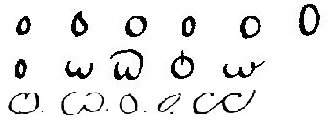


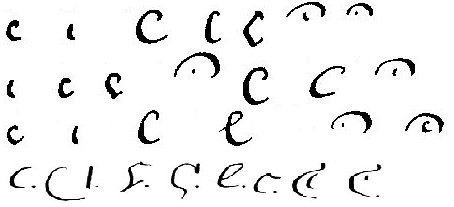
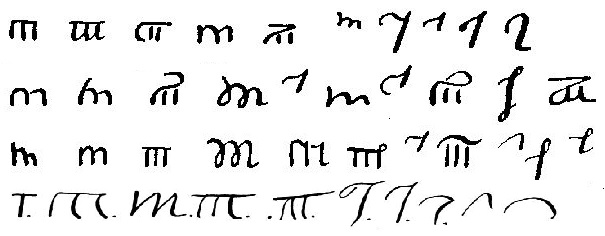
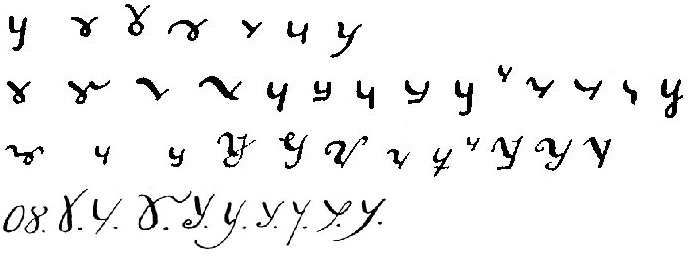
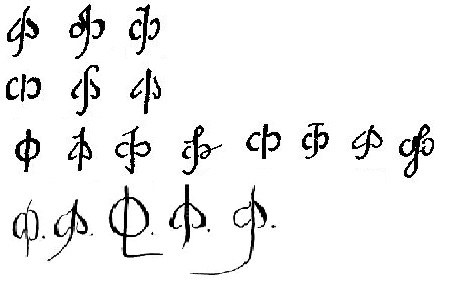
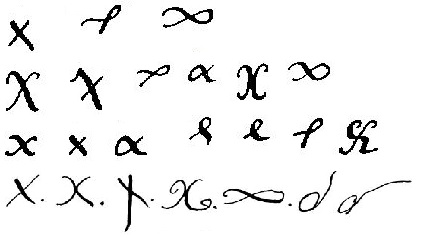
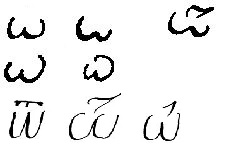
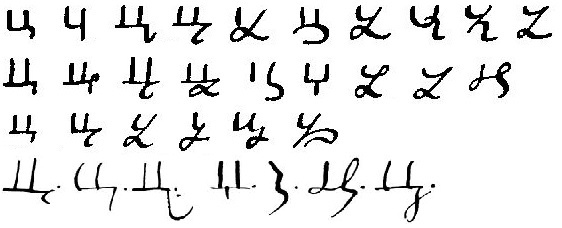


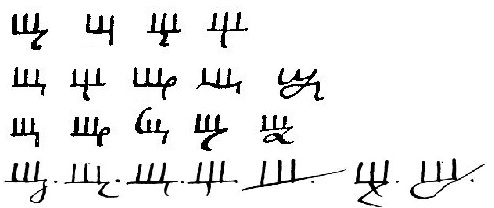


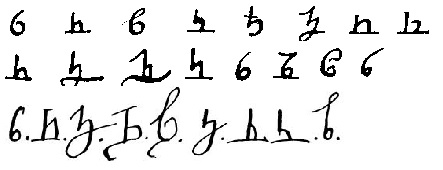





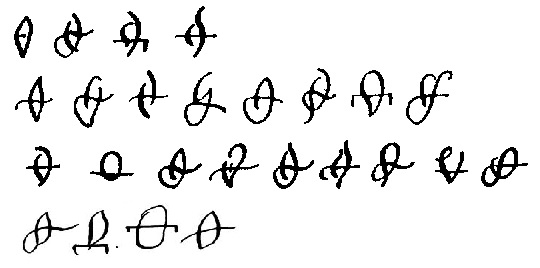

It's very interesting that russian y used to have double dot above it just like dutch ij has.
It is something very interesting, but I don't feel quite right copy-pasting somebody else's work, so let me just link and mirror some of his pages on, though they're all in russian:
https://helghelg2.livejournal.com/47293.html
https://helghelg2.livejournal.com/49198.html (mirror)
https://helghelg2.livejournal.com/46962.html (mirror)
and from some other link:
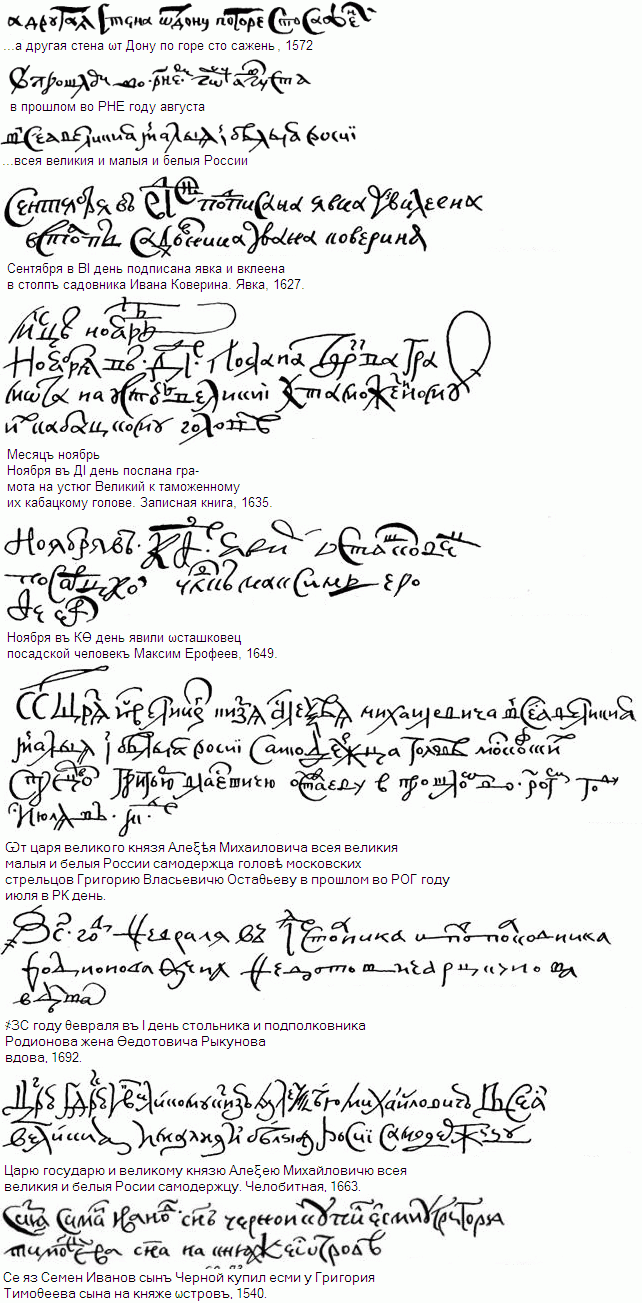
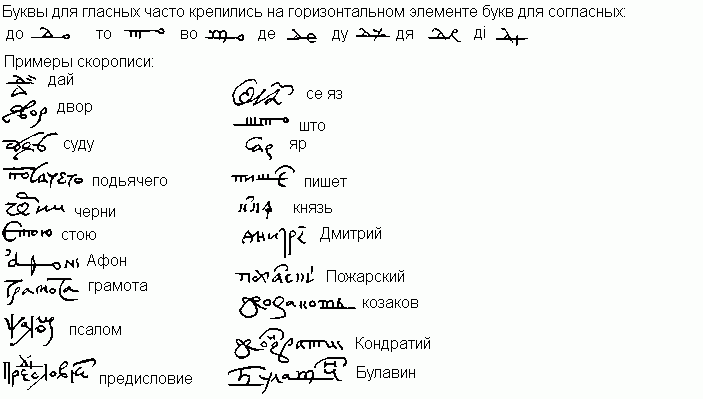

береста:



устав:

полуустав:
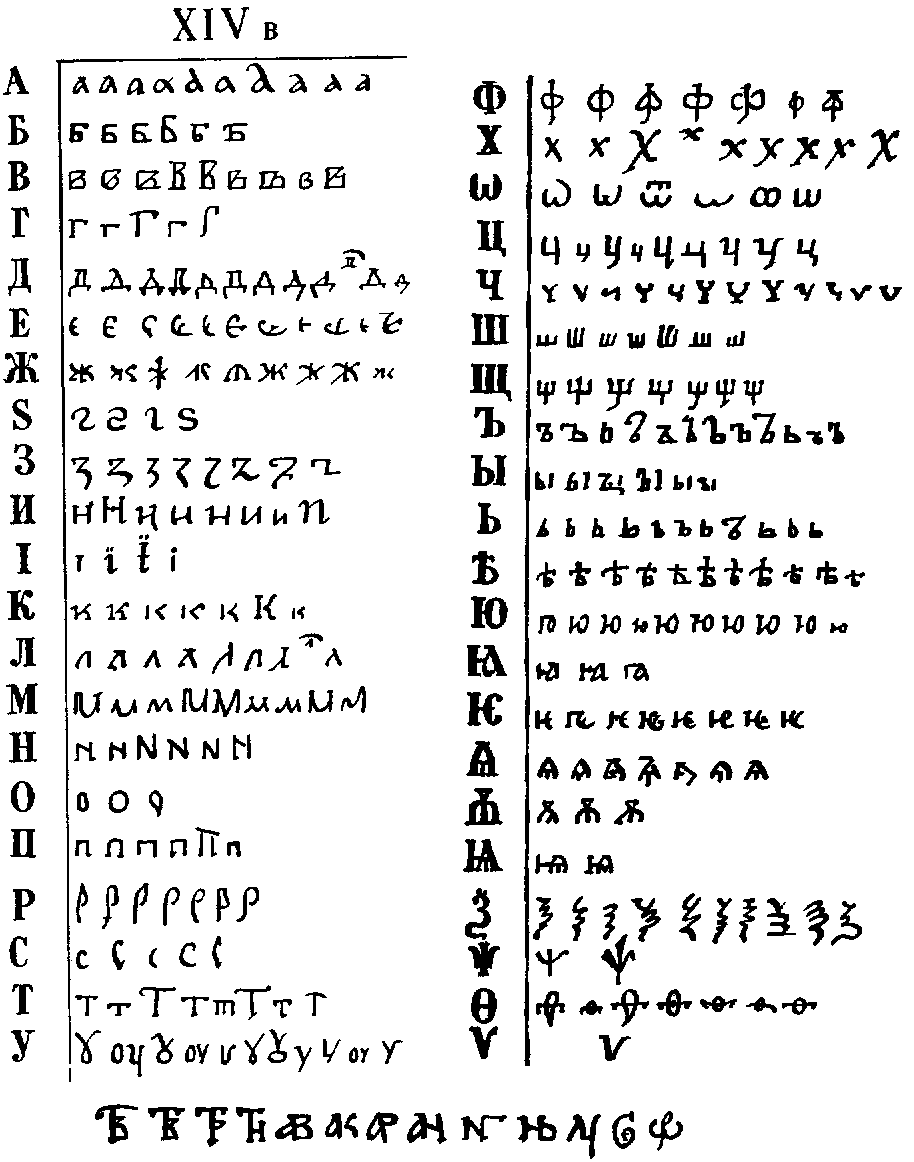
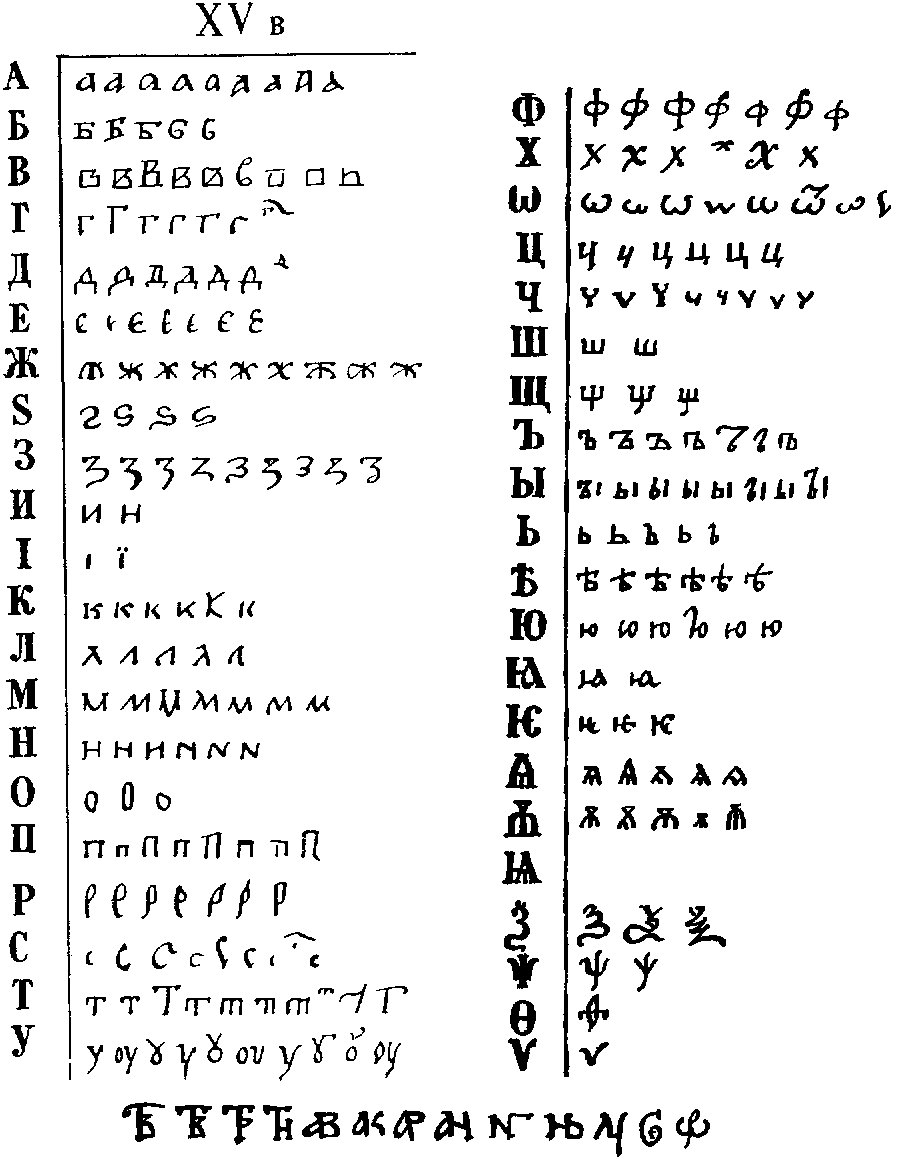
скоропись:
XVв:
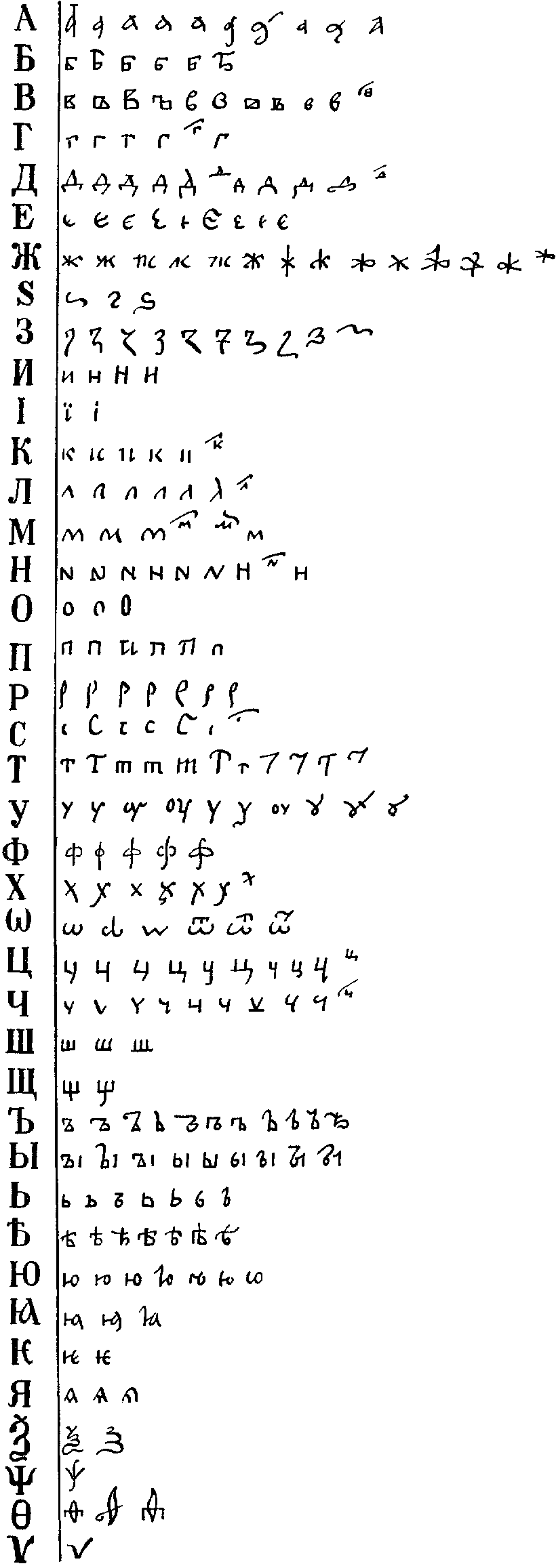
XVIв:
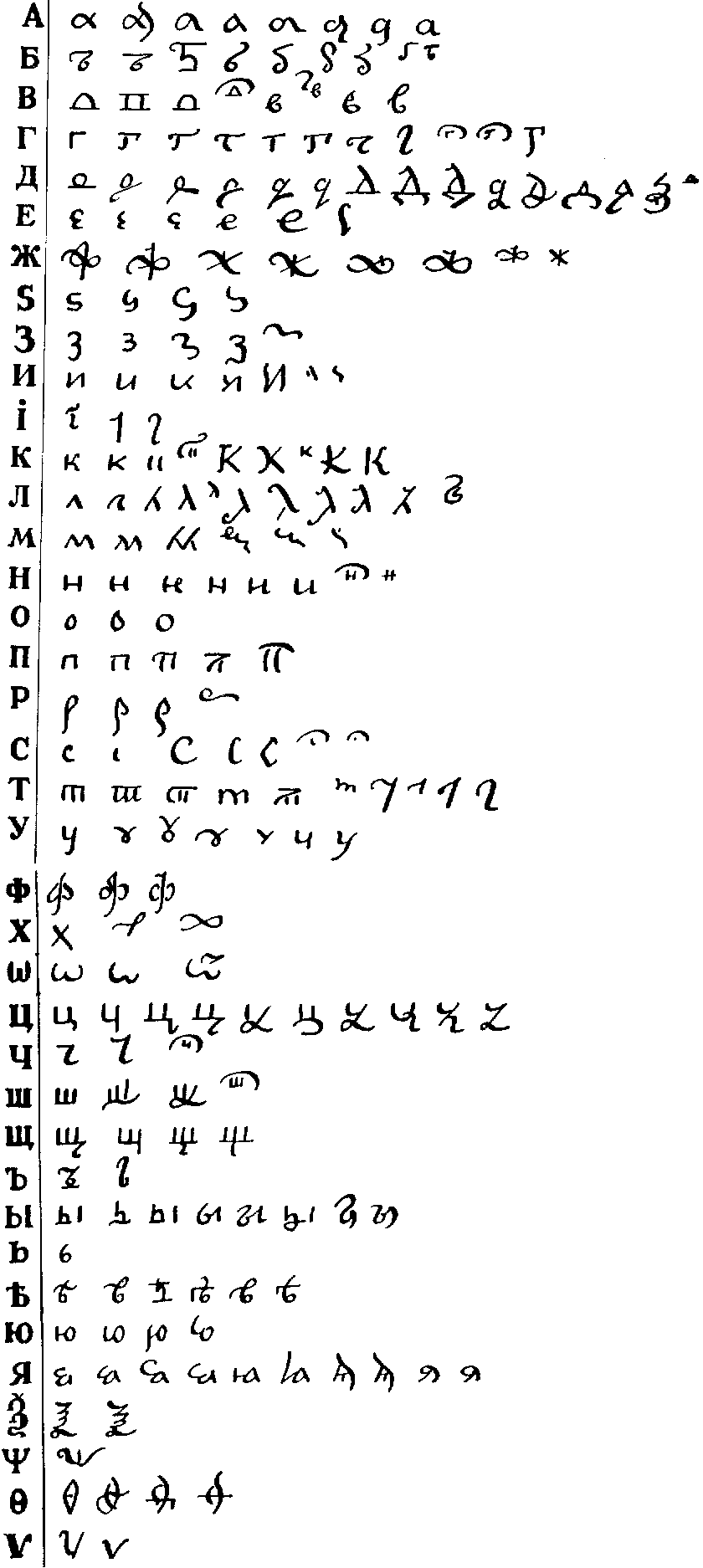
XVIIв:
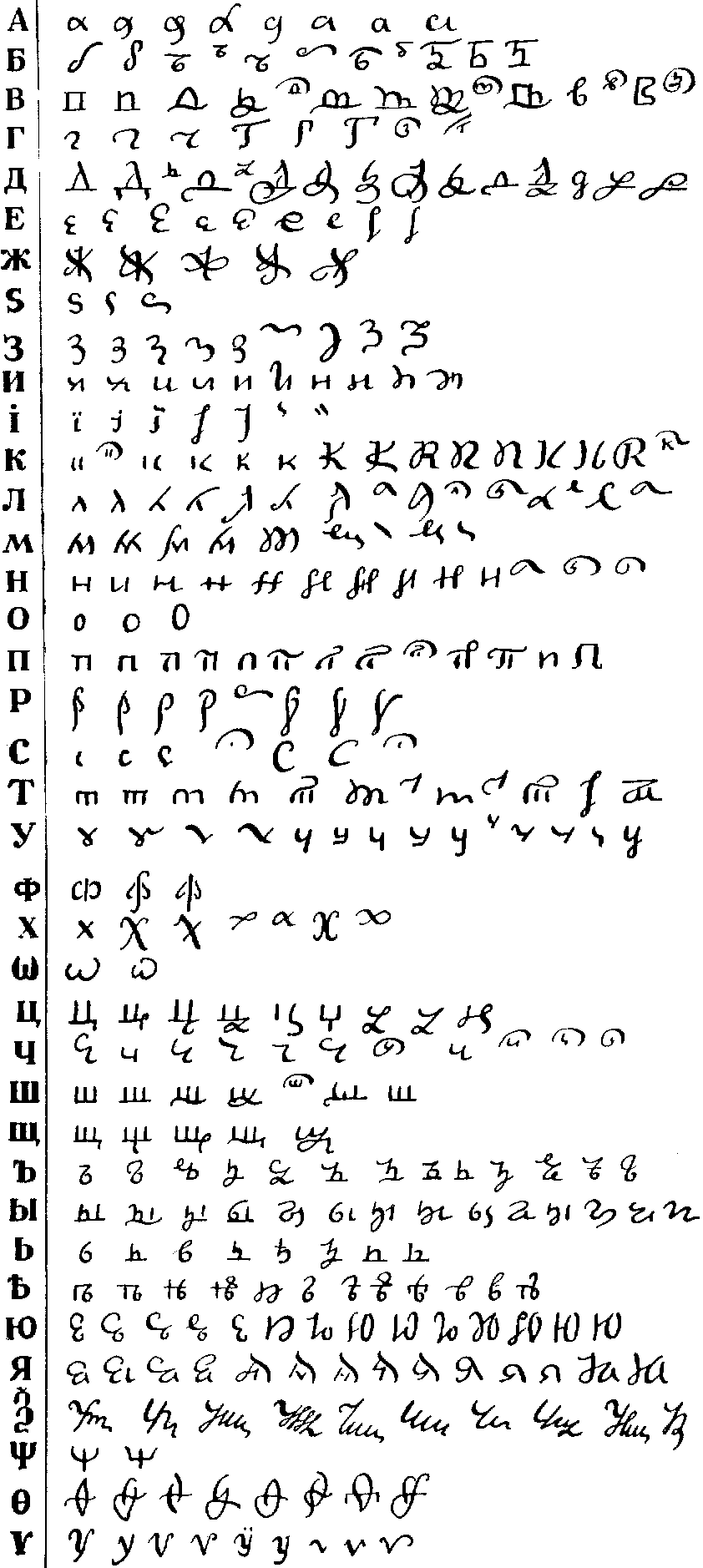
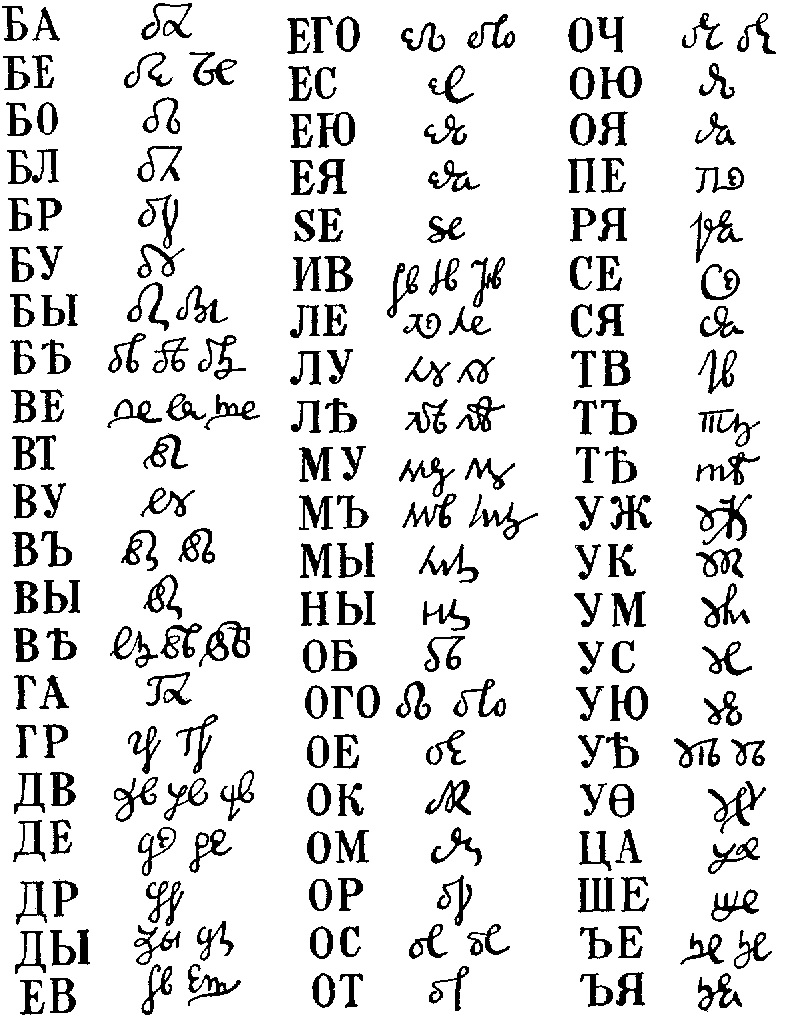
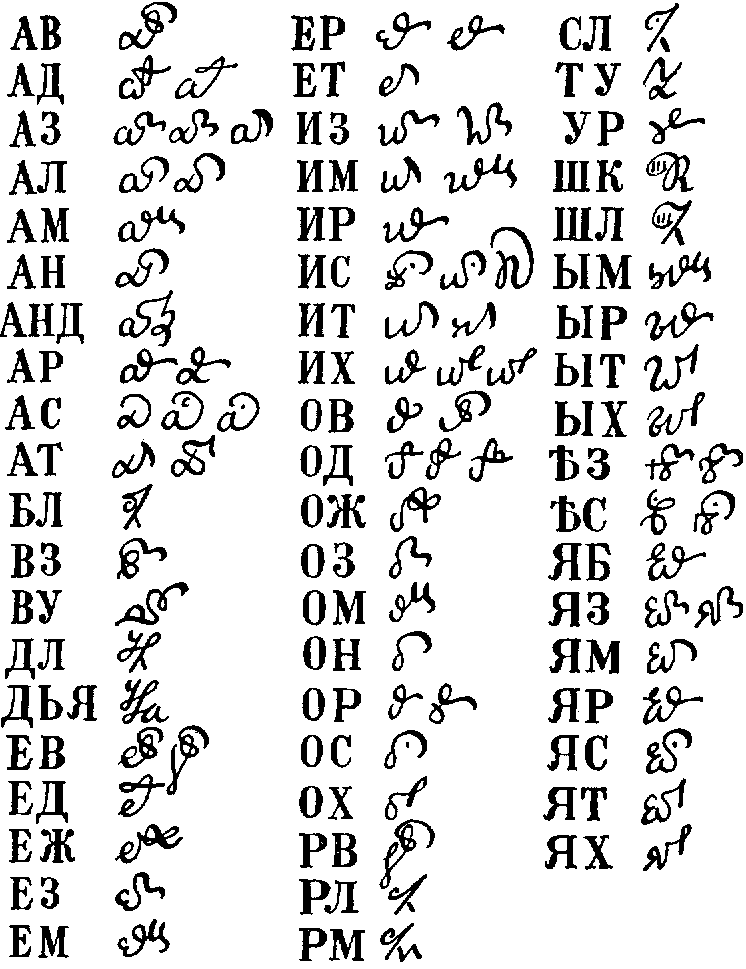
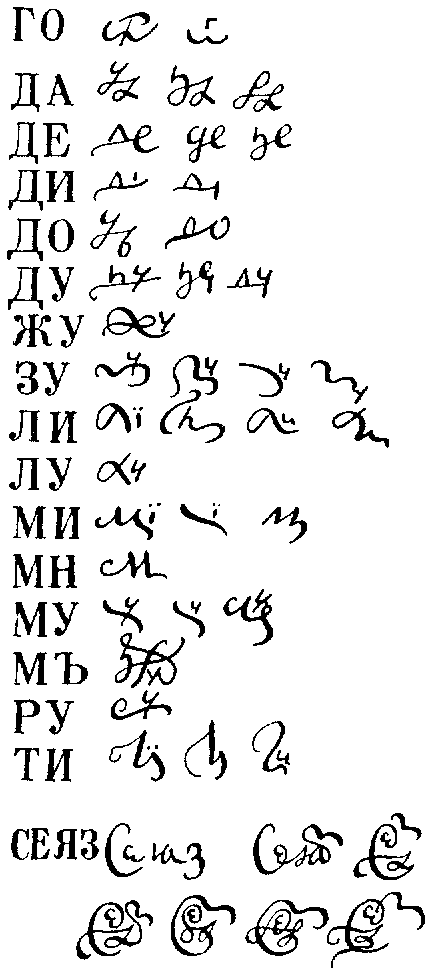
первая половина XVIIIв:
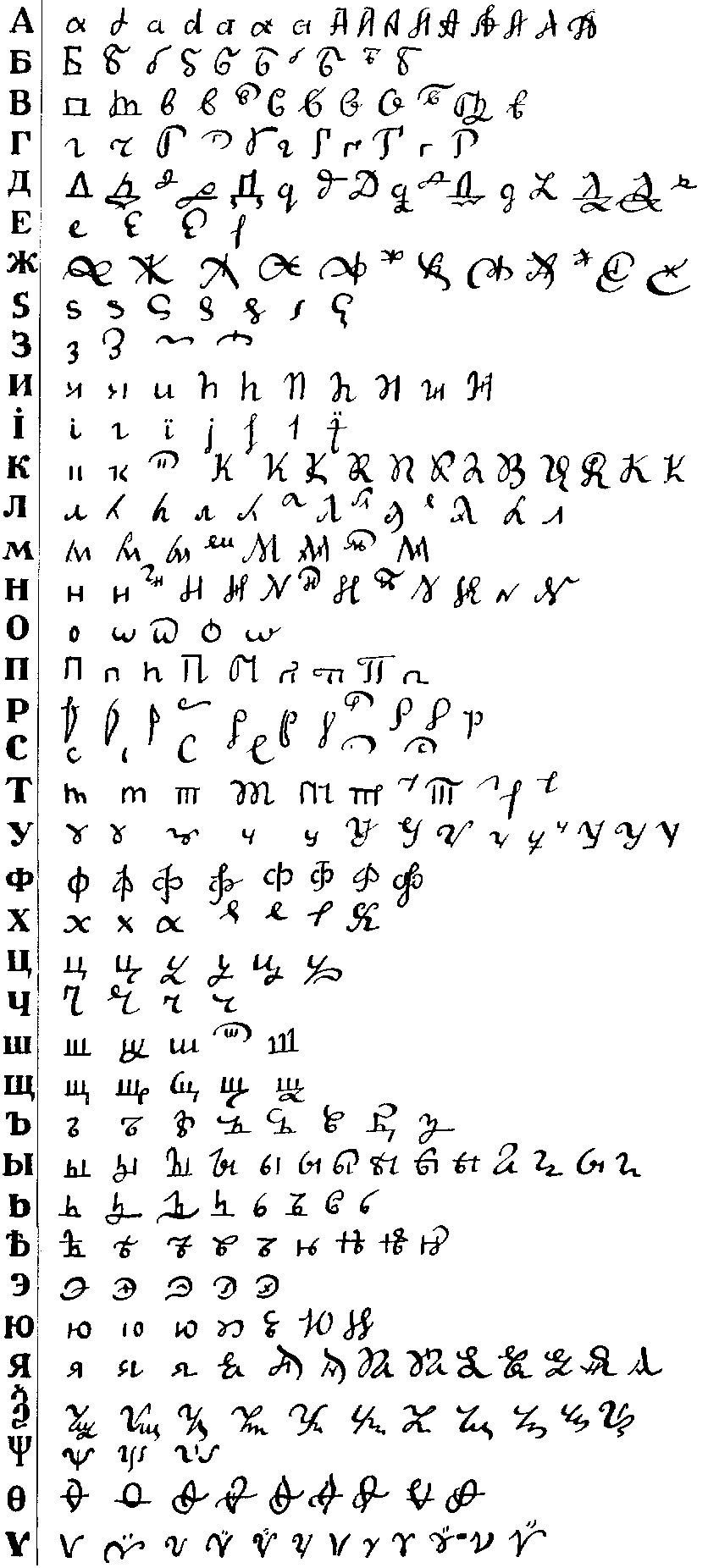
вторая половина XVIIIв:
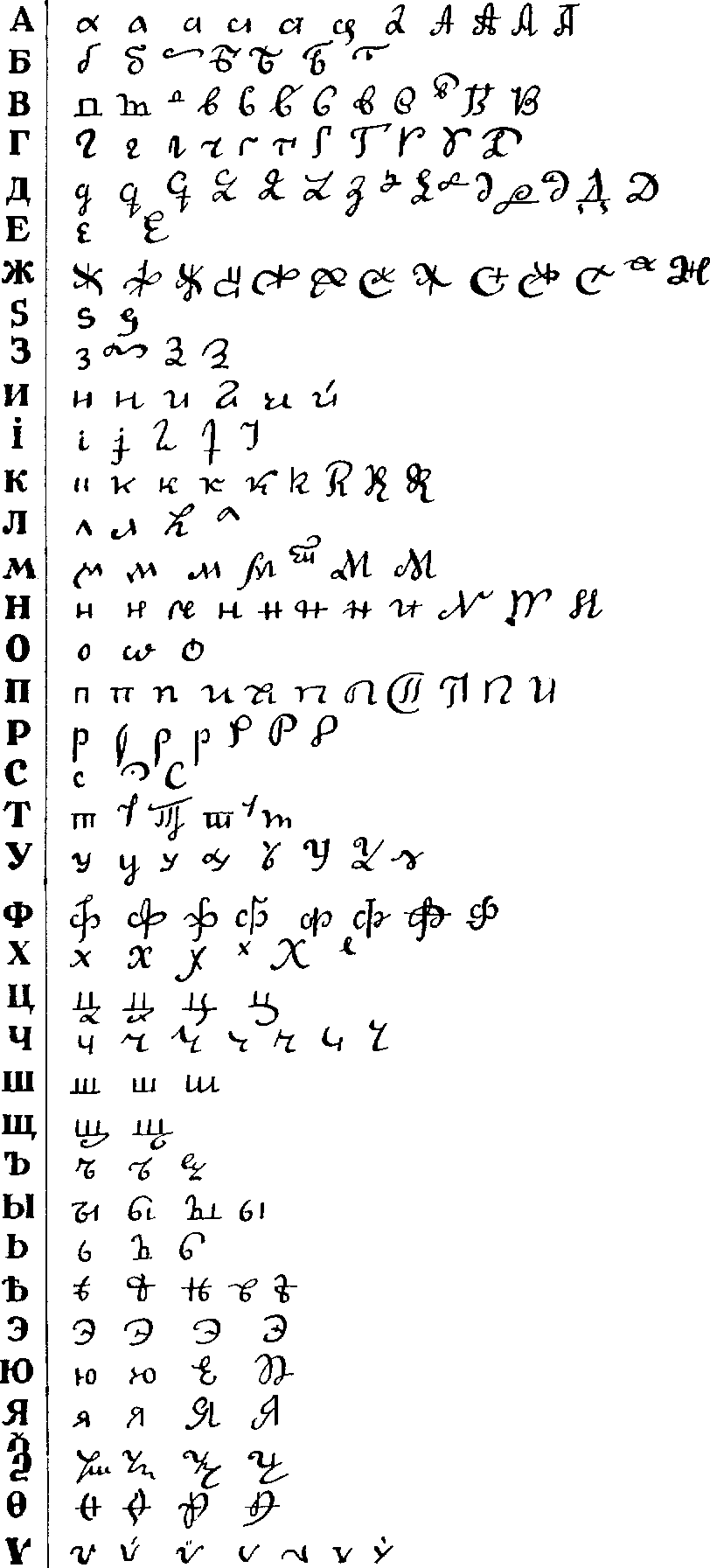
(канцелярское письмо) первая половина XIXвека:
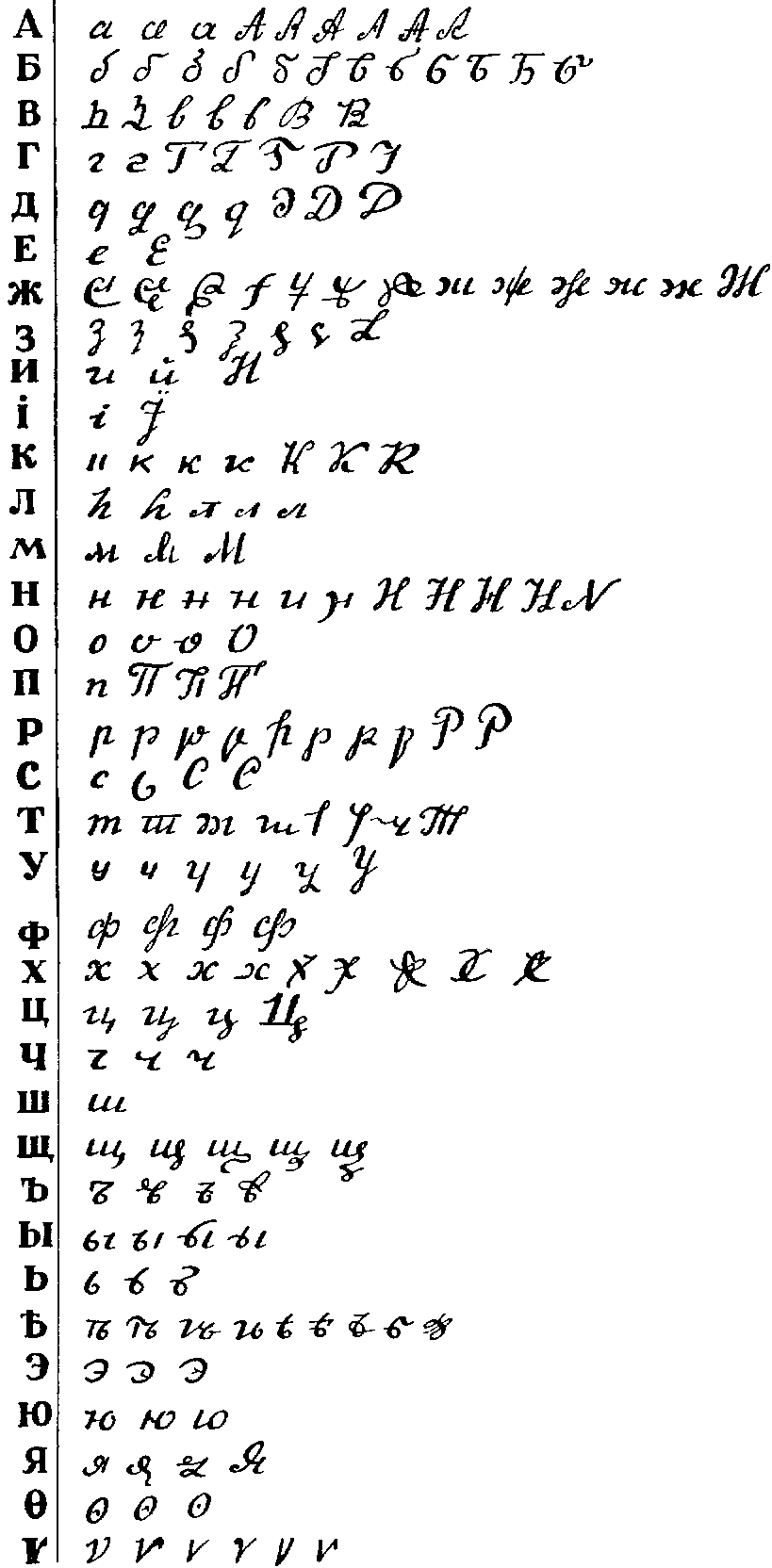
украинская скоропись XVII - нач.XVIIIвв:
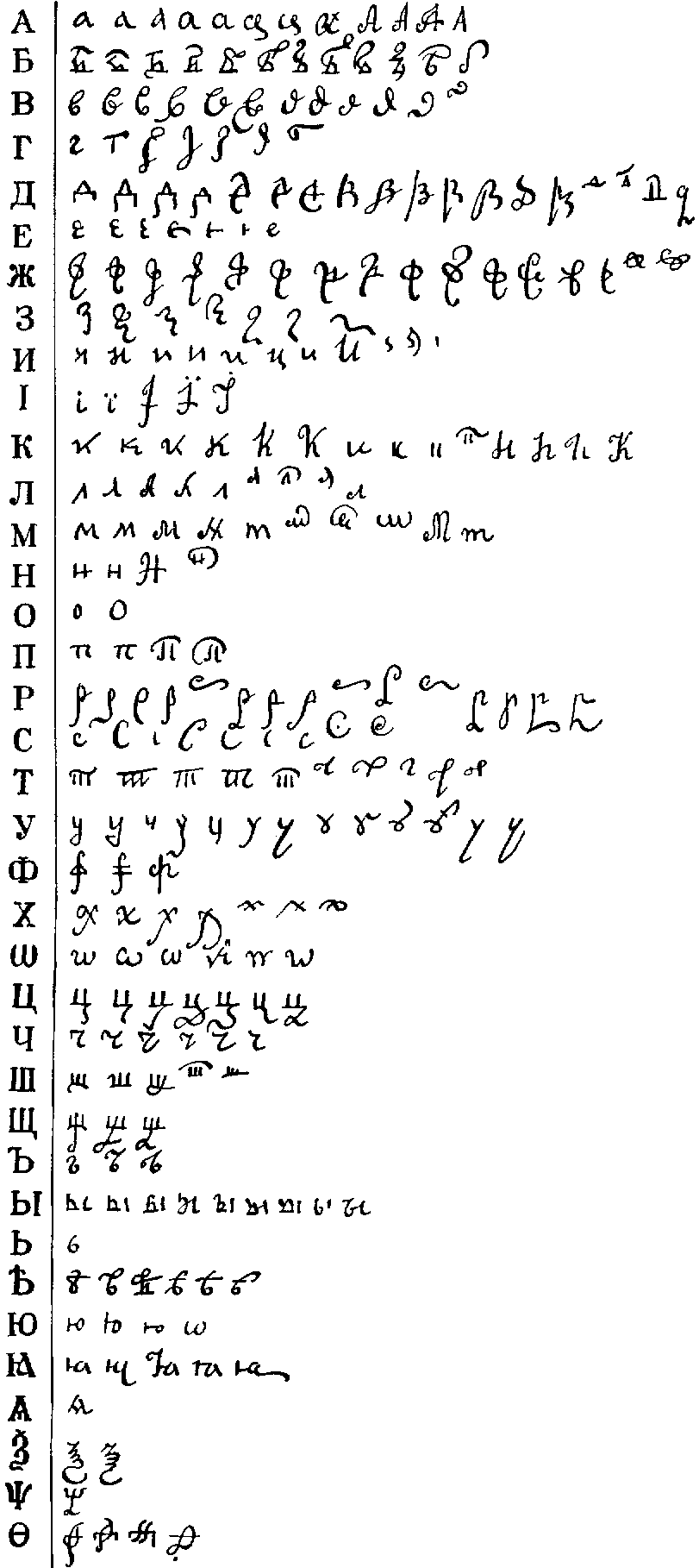
беларусская скоропись:
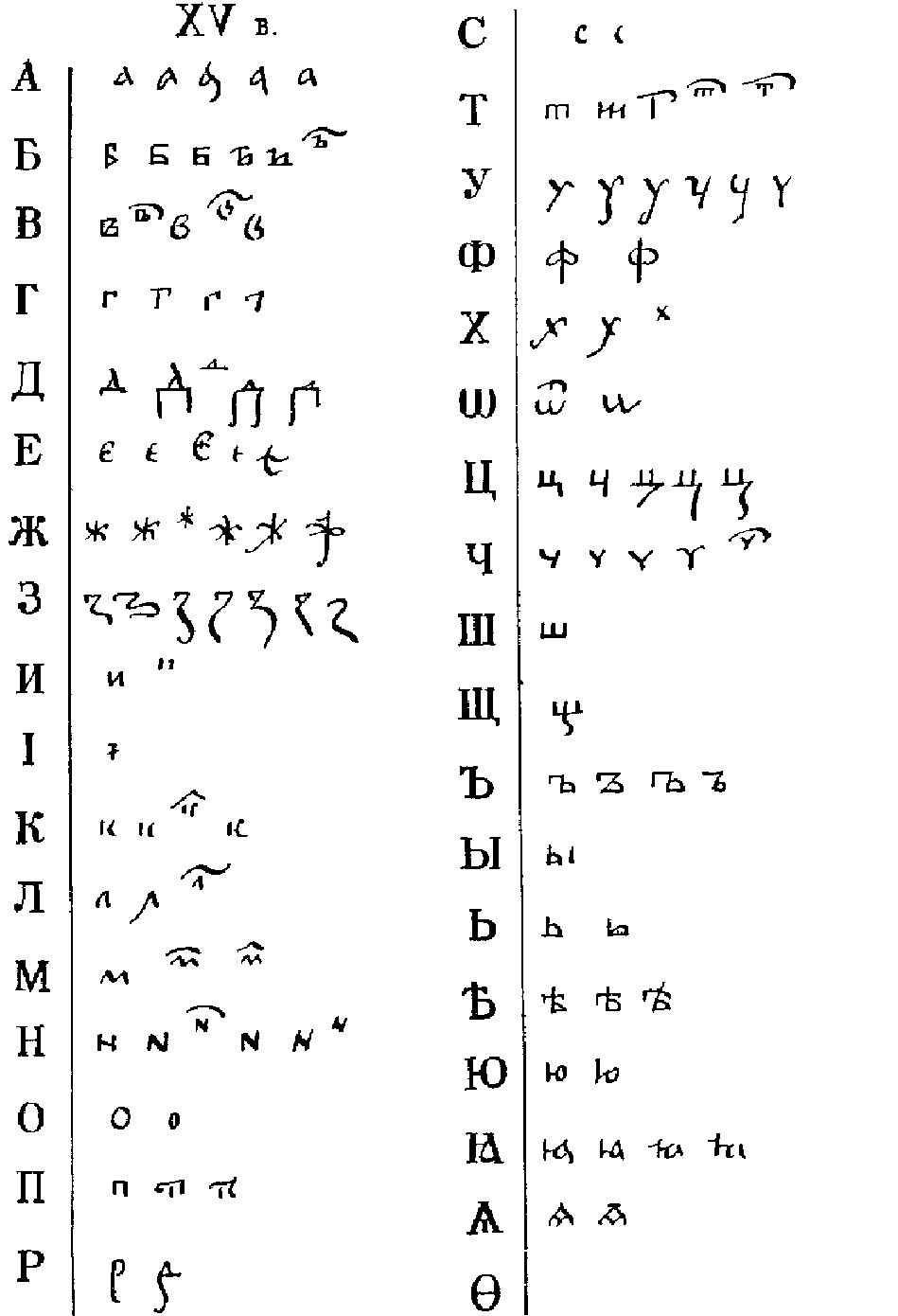
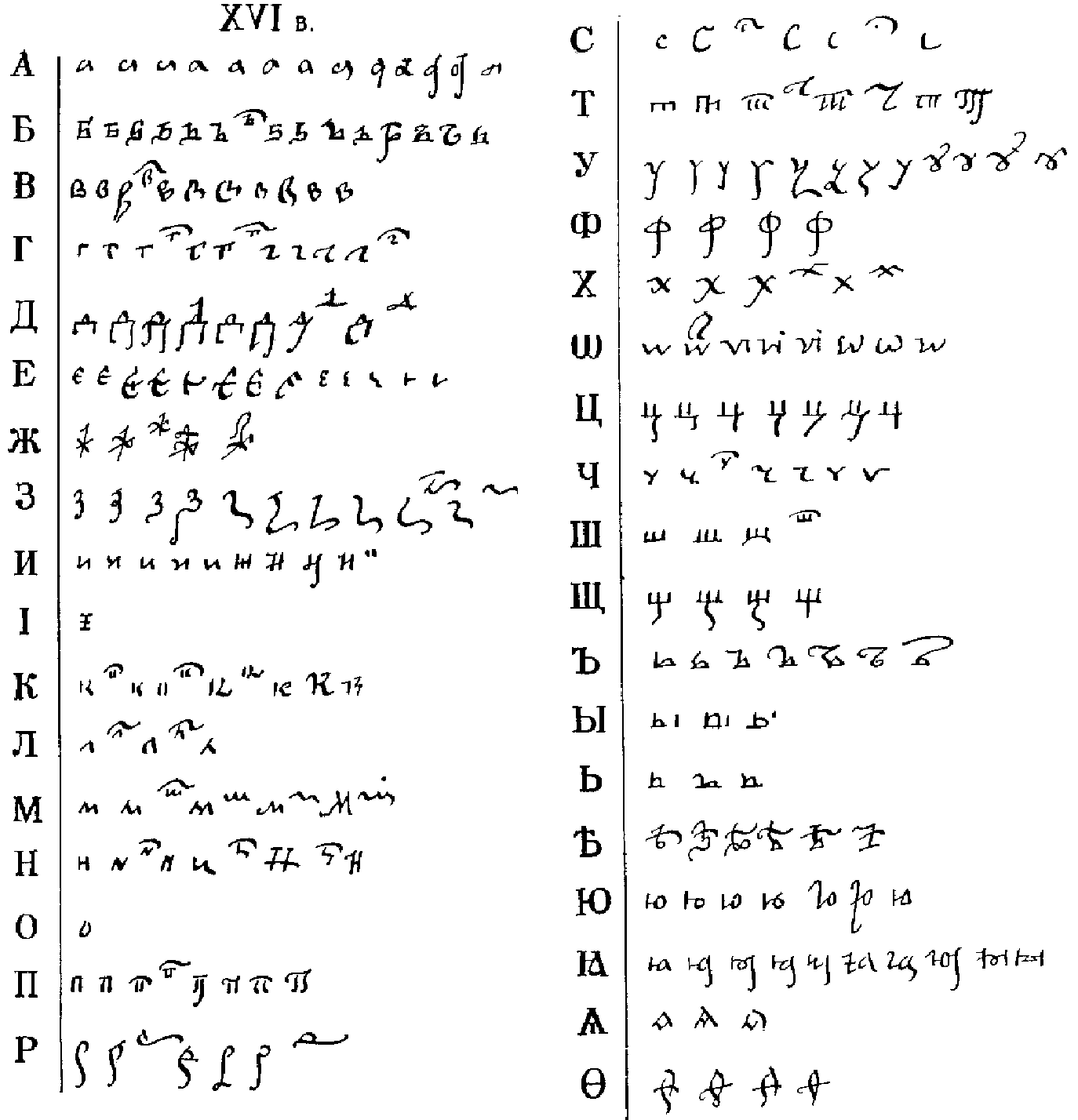
пермские письмена XVв:
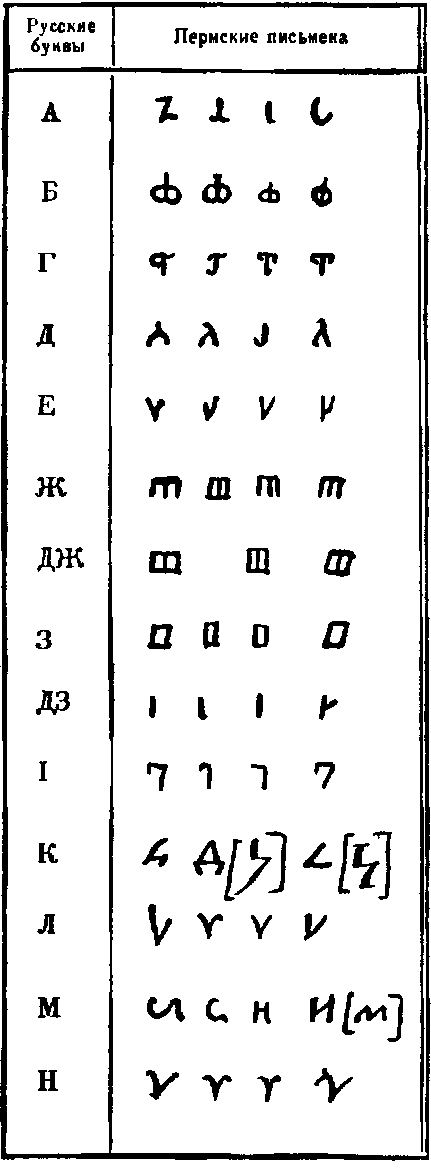
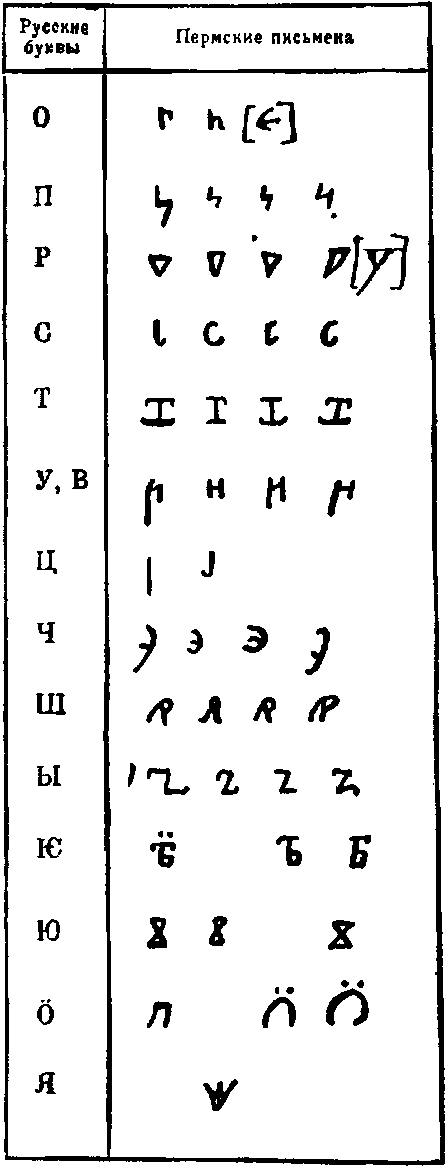
and a couple more:
http://xlt.narod.ru/pg/v.html
http://xlt.narod.ru/pg/pv.html
(там вязь, русская и поморская)
as ~ ass
как ~ кака
s and k are both c (literally эс in russian)
и внезапно я говорю хэз инстэд оф эс, и осознаю что слово хезать значит срать.
также сри может быть редуцированной сиди, где си ис эс. just as s in sit.
I didn't find -i suffix for adjectives in mongolian, but they have -in for russian -ен and japanese -の which is a continuum of suffixes related to english word own.
https://en.wiktionary.org/wiki/-%D0%B9%D0%BD#Mongolian
https://en.wiktionary.org/wiki/-%D0%B8%D0%B9%D0%BD#Mongolian
I didn't find -i suffix for adjectives in chinese, unless these words contain this suffix:
赤[chi](red)
绿[li](green) which is transliterated as Lǜ but it is pronounced by translator as li.
熉[юнь](yellow) no closer forms of it could be found. blue has even more further reading:
蓝[lan](blue) which is extremely similar to that li of lǜ both semantically and phonetically.
-n appears where russians use that same -и for plural form. And the concept of plural is semantically not too far from the concept of adjective.
Just sent a message to Mikitko:
Интегрировал пару твоих видео в месиво или как раньше говорили цветник своего фриковатого исследования: aeiou.ru
Сегодня благодаря им искал выносные буквы и набрёл на В лежащую на ставе что точно как ߘ что внезапно да, стало быть совпадение скорей всего, но этот предположительно новодельный алфавит содержит множество древних концептов: ߋߛߡ для трёх матерей (как их называет сефер йецира) хоть и сопоставлены формы звукам не так как в брахми или берберский амазик внезапно столь алфавитное слово, как abacus, тоже гласная губная язычная+суффикс.
https://www.youtube.com/watch?v=re8toXR4nv4
И этот ход мысли обратил взоры мои на этот неординарный систему письма. Она в алфавитном порядке, просто это не сразу заметно, потому что она идёт справа налево:
But let's arrange those consonants into clasters found by comparison with latin script:
bp dʒ tʃ d t
r rr s f where r ~ ж as in chinese(r~з, rr~ж, and thus r~г~g~ж) and f ~ both f and θ. s ~ ζ
k l gbm ɲn
w j h ŋ also look alphabetic, but it's more of a u-line than o-line (which is probably a-line in disguise, a whisper form of that) with all that w y x z
And this actually mostly unknown order of vowel-labial-lingual may indicate two things: that Kante was extraordinarily profound within the writing systems domain, which is incredible considering the pre-internet epoch he lived in. And b is he simply revealed into the word the ancient writing system used in secret as runes used to be. I say it's the latter.
And the way ߋߛߡ is different
from brahmic 𑀏𑀩𑀞
and old-turkic 𐰿𐰶𐰷𐰗 (orkhon is directly relative to ork, which turk look like to europeans)
and berberic ⴰⵠⴱⴲⵀⵁⵔⵕⵙⵚ.. I know some of these can be square, let's return to it ~10 lines later.
ⴰⴱⴲⴳⴴⴵⴶⴷⴸⴹⴺⴻⴼⴽⴾⴿⵀⵁⵂⵃⵄⵅⵆⵇⵈⵉⵊⵋⵌⵍⵎⵏⵐⵑⵒⵓⵔⵕⵖⵗⵘⵙⵚⵛⵜⵝⵞⵟⵠ
and old-turkic 𐰶𐰷 is q, not b, which could be related to eastern nation havink k instead of b, or could it be breaking this hypothesis? I will know when I construct the model of it with ai or without it.
Either way, here old-turkic meets n'ko's the best.
And the way berberic amasigh has ⵔ for R and ⴰ for a tells that with three votes against the brahmic one we state that ◯ stands for vowel. As it is in greek and lativn latin actually: o (hebrew tells ס is s, which is also so in greek: σ, so in greek s and o are as similar as I and l. And I notice that l stands in I-row and s stands is o-row. Δ stands in Α-row, and thus we find consonant counterparts of vowels, and I can only guess if E has З as a counterpart, and if it's also Σ and if U is reflected with V or ᚢ with П)
t in front of turk and etruscan could be the toponym's prefix, relative to 𓏏
of ~ to
Back to tifinagh. I saw square in some dialectal form of it:
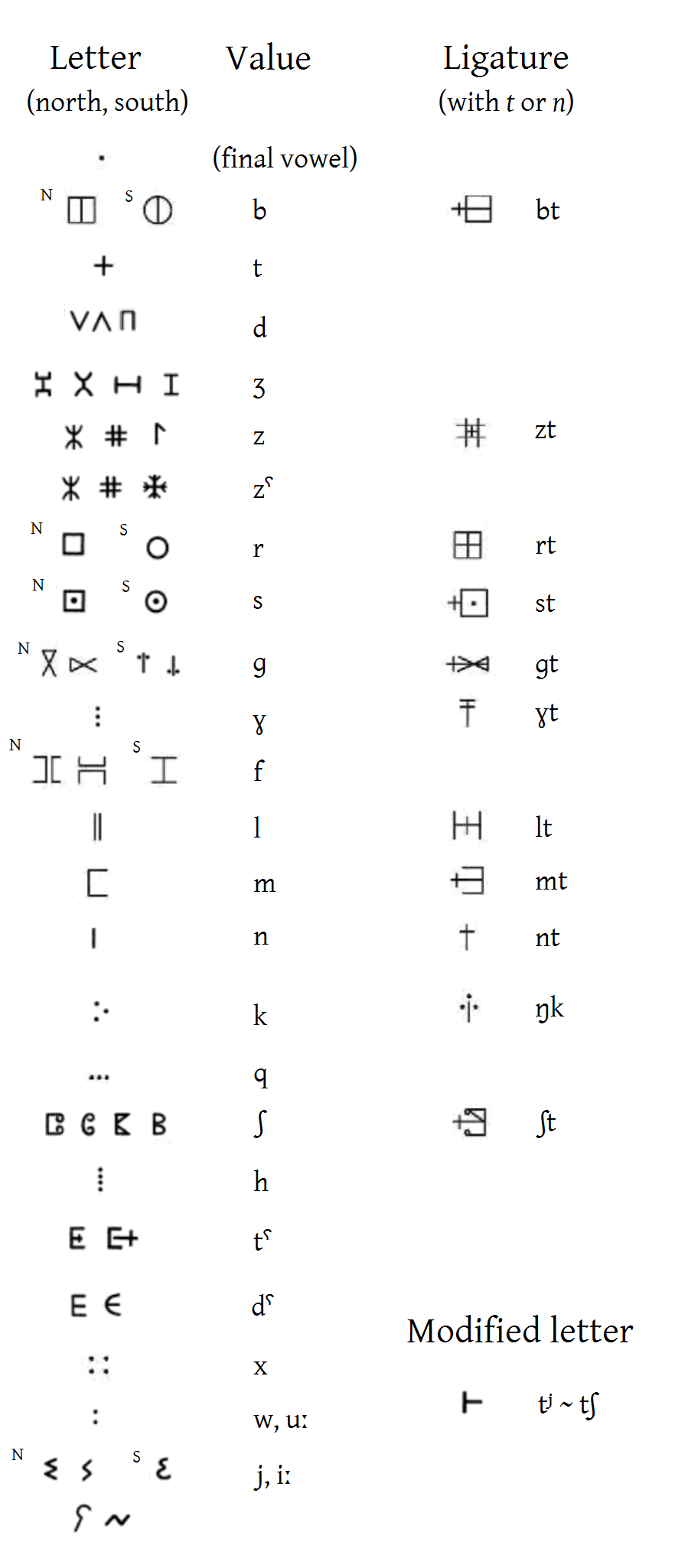
Then R is not vowel, but lingual, and ⴰⵠⵔ of avr (where ⵔ is square. and the difference in graphic could be arbitrary or deeply connected with the concept of area seen as square in decimal culture and as circle in octal one) could directly incluence the n'ko's ߋߛߡ of ems
But if such influence took place, then we should compare their lecsics lexics if a of amazigh corresponds to e of manding. and if v or amazigh refers to m of manding. and if r in one is s in the other.
But then there is another reprezentation of tifinagh, telling that some letters are of later origin:
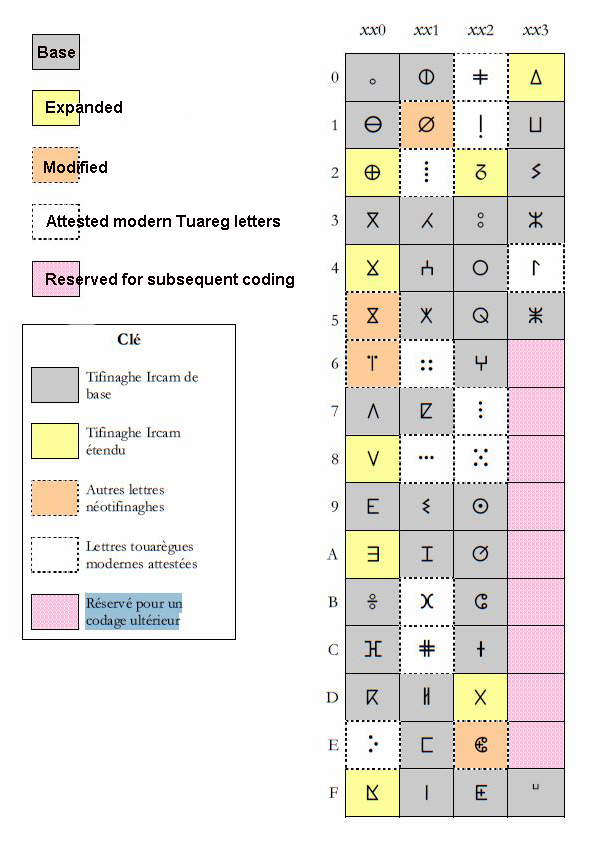
and whatever expanded means, it takes my ⵠ away and makes me ask if I have ⴰ and ⵔ for vowels and now ⵡ the ⵯ is the labial w or ⵎ the m, and ⴷ or ⴸ is the lingual d (yet ⴸ is of extended set too)
This way may help in understanding the forms, or it could confuse, but I will use it and I will report if I get confused or not. I dins ir find it remarkable that ⵡ and ⵎ are both labial, and that ⵡ reminds U so much, and ⴷ then directly relates to Δ or Λ. It is a very raw, very confusing subject. You probably should wait for me to figure it out, but I keep it online in case I drop before I finish.
expanded and extended can be a source to understand p and t. or maybe not. I will look into them or not
That urk of turk and orsk or russian and ukr between them gives out russia and turkey as some common conglamerate of nations not worthy for eu (russian church's centre is suddenly in Istanbul (not Constantinopole) and half of Russia is tatars and other turks. Moscow sounds as mosque and they teach us that alcoholism is our problem and that the only reason we're not muslims is that drinking is our way to have fun. So once we figure out that we got bamboozled on it, we may turn muslim overnimght. But then here's a positive effect of commie experiment, because of which most of these territories are inhabited by righteous atheists.
I was on hunting
I was a-hunting
a ~ one again, and thus on~one.. wait, what? or is on = un-? is it у[u](at)?
it's explained (in russian) in this video: https://www.youtube.com/watch?v=LpAI12Y7lrA
from which also the example which made me realize is the following:
That mongolian -in for -ин of genetivus is -ing in english, because reading is of some Reada.
The same -ing is used for merovings, carolings, vikings.
Browning as a surname thus has the same russian suffix -in half of russian and jewish surnames have.
-ing как окончание фамилий т.о. когнат-морфема с русским суффиксом -ин, который идентичен монгольскому -йн, что семантически близко к английскому own, a русская форма среднего рода идентична японскому -の что говорит, что разные языки это просто различные наборы из по большей части одних и тех же универсальных элементов, которые ещё только предстоит расшифровать и сопоставить.
Я не должен зависать в интернет-хаосе будучи накурен!!!
Maybe Mars was the argument we would understand (even if he himself doesn't believe in it) so he could push forward the asteroid mining we would consider crazy because we had no idea what asteroids are.
is cool and all, but it's too little for half an hour I've been high so far. Please be reasonable and serious.
I am not going to be serious, because I'm too gay in my colours while babylon makes us believe that colours are gay and gay are homosexual which fucks us up because homo is the name of the specie of our own. It's as if extraterrastrials laughing at us "russia's gay and everyone there got aids"
As these guys tell, we're stuck with the crapy shitty ones, which is natural, because why would more advanced nation be interested in the culture so lower than theirs, we are pretty shitty ourselves so that beasty feature of ours would repulse shitty cultures more than clean ones.
what were the chances! how could crape appear right in the time when this great man just got heroed a month and two days ago. In exactly a week it will be 40 days, some ritual of passover is taken at 40 days, maybe because сорок ~ срок, и может раньше это было как недавнее 60, как сегодня воспринимается 80
И то же самое слово привязано к совсем другим контекстам, к беременности, и может именно то что это 280 дней дало рождение концепции недели. Но скорей всего их было не недель, а лун, месяцев которые были менее абстрактными величинами, а работали как календарь на небосводе (сложно поверить что это устроено всё так случайными закономерностями, а не антропоморфной волей (сам этот хаус человеческую волю выковал, так что не удивительно что мы их видим как родное. оно и есть такое. house~chaos have orthography as different as can be, but maybe before people learnt to tidy up their houses were chaotic to the core.
so I was going to speak of the concept of 40 (probably appearing at the conception of gestation (taking place after conception)) applied to days by priests, and priests are speaking of what they don't know of, what they blindly believe, maybe that's why поп~попка. But it could be from some actual magick knowledge. Unless all magick is magic and crap.
his 40 days will be on september 15, next Wednesday. Today is a Wednesday. Odin's day, Wotan's day, What? Wit! Wise. Why's, whies or whys? Whys is more clear. Wise man is a man of why.
And twenty years to 9/11 attacks is tomorrow. How wild is that! He probably was preparing some present on the 20th aniversary.
ߋߛߡ (ⴰⵠ□) are probably the sequence of houses we built (from a cave or burrow to wigwum, but wickiup is probably more common technology wicky up (twiggy up, sticky up, wingy up. is wing~arm~stick?) wicky wacky.
 and the boxes
we build now. Then we see why turks consider 𐰿𐰷𐰗 velar, like in
casa, while база could be more labial form of it. (𐰿𐰷𐰗 [jqʃ])
and the boxes
we build now. Then we see why turks consider 𐰿𐰷𐰗 velar, like in
casa, while база could be more labial form of it. (𐰿𐰷𐰗 [jqʃ])berbers tents are much more square and they know square houses too, though they know wickiup too.
Or is this sequence denote womb, way, tomb? is □ the box of sarcophagus or a coffin. caught in.
Vowel is naturally the first, because some vowel is what toddlers pronounce the most.
Labial is second, because it's for a baby, for somebody telling talling tolling calling mama a lot.
Lingua is the whole distinct language. Kids pronounce labial letters alright, and only later do they master al the linguals (and not always all too, but speech defects are mostly if not all among linguals)
and considering how high I am, I smoked two or three times (alas) I delivered only about three screens. good. Now it's time to go making business. I must break through with my alien technologies.
Cart has wheels on the left side rotating conter-clockwise, and the wheels at the right side rotate clockwise.
And in this sense the way brits and japs drive their roads is luckier not only because their ringroads go clockwise, but also that their drivers sit at the right and thus lucky side. Were that some important passengers who made us all have our roads right-sided?
But it's all mystical babble until we look at the rate of the accidents across different nations. And it's probably nothing, because though Hong Kong's rate is the lowest, Norway comes next and Norway is right-sided. And Britain is 50% higher than Norway and 100% higher than Hong Kong, so it's just some mumbo-jumbo, maybe useful to understand how tha ancestors thought, but useless in the practical sense. And if we compare not per capita, but per kilometres, Norway is the safest and Hong Kong is far behind. Britain's roads.. rides, not roads are the third safest though. Now you see I'm again in the field I had nothing to do with, but since I had an idea from that area, I collected it here, ban and now the best I can do is to send it to some statisticians forum or bury it here or maybe even erase it at all. grey color. duh.. nah.. duh is do, yea is ya (you in one language and я in the other. so we must start from before that, we must go where no pronouns were? I found that probably qst and 1st and 3rd persons appeared before the 2nd. 2nd is the most complex one: it has polite gradations, when japanese have both 2nd and 1st person politeness levels. Which tells that I could appear after they. the то сё. that this. the is someb something abouve j то сё this and that
But then.. how many of those brittish accidents are caused by tourists? Nah, leave it to some bigger machine head. Though I feel like turning И into H and Н into N might be a great idea. also because it uniteds more than divides, but evil politicians tend to divide (to conquer, to impera) Yet we need both kinds of politicians: when Russia is sick, it is humane to divide Ukreing UKreich. The decission to allow the UK to make us Hong Kong in Kyiv may be a great boost for all russian economy. Russia will border UK.
Politics is garage but somebody has to do it. garbage, not garage. carcage. a la gar. trains were considered cars in france? nice. Such semantic cognates are the basis of the upcoming cognate's dictionary.
Russia is Mussia (Родина Мать) Разиня Родия Родня Русня Простые. Русые.
Россия Мать ибо порождает национальные государства там где до неё были лишь кочевые племена (киргизы говорят что очень благодарны россии за создание их государственности, блитанцы в палестинах как-то хуже и гаже го-енность стоздали. Но н пример с китайцами, ГонКонг гораздо лучше мандаринъского (хоть их и пытались сделать кантонским, почти гондонским, но они ГонКонг или СенЖен в другом диалекте чтоли? ШэньЧжэнь это через реку от ГотКотка, который на путунхуа (мандаринский?) а сам ГонКонг называют СянГан. Так что видишь какое имя этот город обретёт после объединения городов по манеру Будапешта. Но я не согласен с сюсюкающим креативом коммимразей, Китайская компартия должна излечиться от марксизма и жажды власти, что неизбежно с появлением на рынке поумнителя. И ШэньЧжэнь станет ГонКонгом (поселение непосредственно рядом с городом является расширение этого города) который станет столицей Китая.
Надо начинать выборность не правителей, а городов. Чтоб успешные города на нексколько лет расширяли свою власть на все города государства. Не москва, а более успешные и менее жадные. По крайней мере тогда перед городами откроется на что их налоги тратятся.
Россия породила Украину? Украинцы считают, что скорее украина породила россию. Киев породил Москву? Это тоже неверно, но как образы могут сосуществовать. Мы клоны друг друга? В таком случае оба взгляда (на первый взгляд несовместивые, противоречивые) являются верными. оба. Но Россия отпочковала от себя много го-ъ а потому может считать себя матерью, да они так и говорят, родина, motherland. У украинцев это батьковщина. Путин оформил розвод символизируя последующее деление недвижимости? Украинцы выиграли бы имидживо если бы избрали Юлю. Но она под паршивого отравленного проклалась. Ющенко был позитивной силой? Раз коррупцию в стране не заборол, значент нет: подствной. Не обязательно кремлёвский: но чинушный: хотя украина осталась свободной: так то с чего мне0то судить с чем ему там столкнуться пришлось.
окей, живе украина, будем агитировать кремлинов чтоб выдавали украину не за ЕУ, а за ЮК, с ЕУ у нас граница и так есть.
Т.е. с их колокольни, если Россия - мать, то Украина - дочь. И задача хорошей матери не ломать жизнь дочери тупо говоря "бросай его: без него проживём" как деревенские дуры делают: а подгон дочери жениха получше.
Китаю это польстит тем: что Россия с них взяла пример? Подобно тому как они с нас когда-то взяли, за что я прошу у них прощения.
Размер html превысил отметку в 300kB и начал тупииь, а потому: vol.14
...
